Report on Responsibility and Sustainability 2021 – 2022

Sustainability is embedded in the overall HSG Strategy 2025 and broadly anchored into HSG’s governance structures
HSG ranked among the top ten in the WWF rating on sustainability in universities in 2021
~3,500,000 CHF of Basic Research Fund (Grundlagenforschungsfonds/GFF) and Swiss National Science Foundation funding awarded to sustainability-related research projects in 2021/2022








Launch of the first local spin-o of the Impact Scholar Community








> 130 peer-reviewed publications on sustainability-related topics in 2021/2022
HSG MBA ranked number 9 in the Corporate Knights Ranking in 2021
Key Facts –Executive Summary 2
HSG has strengthened the integration of sustainabilit y into study programmes and courses Inspiring co-curricular o erings, such as the NextGen Sustainability Programmes
New faculty hires for social and environmental sustainability
3,900 plants for the beech hedges and 49,800 bulbous plants were used by the gardeners around SQUARE
87% of the HSG SpinO s pursue business activities that address at least one or more of the SDGs
First full Greenhouse Gas Report published in 2022 including scope 3 emissions
A Word from our President
This year, the University of St. Gallen (HSG) celebrates its 125th anniversary. Originally, our institution was founded to educate future leaders of the thenthriving textile industry. ‘Sustainability’ may not have been a part of our faculty’s vocabulary at that time, but ‘responsibility’ mattered from the outset and was one of the core values that professors instilled in their students. With this ethos, the University of St. Gallen provided the right setting for an occasion that was momentous for our understanding of our planetary responsibility: it was here in St. Gallen that the Club of Rome presented its ‘Limits to Growth’ in 1972.
The Club of Rome has renewed its bond with St. Gallen and is working with the St. Gallen Symposium on principles for a New Generational Contract. The pioneering organisation of 1972 is returning to a campus that is still governed by the same entrepreneurial spirit and driven by the enthusiasm of its faculty and students, but it is also returning to a community that is dedicated to promoting sustainability – on all levels. Our students benefit from a growing number of courses on sustainability-related subjects, as well as from a co-creative environment fostered by our new learning centre SQUARE. Sparks fly outside the classroom as well, and we are proud of the many student initiatives that are tackling social and environmental issues. In 2022 Anna Kurth, a former president of oikos St. Gallen, an influential student association on sustainability, was recognised for her outstanding contribution to PRME Global Students.
Our diverse curriculum is grounded on the work of a faculty that is dedicated to excellence in sustainability research. Every year, we honour the most transformative research projects with Impact Awards which mirror the diversity and creativity of the research undertaken. Striving for breadth in sustainability research and responding to our students’ demand, we have been fortunate to recruit outstanding new faculty. These hires will also contribute to our collaboration with the 26 leading academic institutions that have forged the Alliance for Research on Corporate Sustainability (ARCS).
We are proud to present the sixth PRME report of the University of St. Gallen showing the progress we have made in integrating the principles of responsibility and sustainability into our activities. The University of St. Gallen is excited to continue its sustainability journey and further promote the PRME principles at our University and among the wider business community.
Prof. Bernhard Ehrenzeller President, University of St. Gallen (HSG)

3
from our Delegate for Responsibility & Sustainability
In the two years since our last UN PRME report, we have seen enormous global shifts with events like the COVID pandemic and the war in Ukraine. At the same time, global carbon emissions reached an all-time high in 2022, and communities around the world were exposed to floods, drought, severe storms, and rising sea levels. Environmental and social sustainability challenges remain very much a top priority for global leaders. For example, more than 4,500 companies have made committed to science-based targets in support of the Race to Zero, a global UN campaign to rally organisations and communities to fight climate change, and a vast majority of businesses pursue the UN Sustainable Development Goals (SDGs).
As a business school, we therefore have an important role to play when it comes to sustainability. In 2021, we formulated a sustainability strategy, sanctioned by the President and the President’s Board, that has two overarching goals:

1. to prepare our students to become organisational leaders in a world that will need to solve severe environmental and social challenges and
2. to ‘walk the talk’ ourselves.
This strategy is executed across three core activities: teaching, research, and campus/outreach. In teaching, our goals are to bring sustainability offerings within existing programmes, create new courses and programmes, and develop co-curriculum activities via ‘NextGen Sustainability’ initiatives. In research, the goal is to build up our expertise, including fostering interdisciplinary sustainability research. On campus, we aim to become a net zero, diverse, and inclusive university and collaborate with stakeholders.
Several important new developments have taken place over the past two years. First, the Climate Solutions Taskforce started working on a detailed climate strategy that will be launched
in 2023. Second, a working group was created to flesh out a strategy for social and economic sustainability, as part of building an integrated sustainability strategy. This process is still ongoing and will be completed during 2023.
In addition, a Delegate for Equality, Diversity and Inclusion (EDI) was appointed to coordinate the many EDI initiatives that already exist at the University. Further, a pilot initiative to develop the HSG Collegium brought together more than 50 stakeholders to define the University’s role in achieving social sustainability as one dimension of ‘social cohesion’.
We are already executing the goals set out in our sustainability strategy. For example, we have started a major initiative to embed the topic of sustainability across all levels of education, namely Bachelor’s, Master’s, PhD, and executive education. We supported programme reforms, creation of new courses, and faculty development in sustainability. In addition, inspired by the Managing Climate Solutions certificate programme at master’s level (launched in 2020), we are creating a sustainability certificate programme at Bachelor’s level. NextGen co-curriculum activities complement these initiatives to bring sustainability into student life via associations, mentoring programmes, the Campus Credit scheme, and career-related programmes, as well as new ‘Be the Change’ courses that are co-taught by students.
Welcome
Letter
The University also invested in new faculty hires for environmental and social sustainability. In addition, our library invested in sustainability and ESG-related databases. We also created our local, and the world’s first, spin-off of the AOM Impact Scholar Community to connect sustainability scholars.
The Climate Solutions Taskforce worked closely with several administrative units to implement a carbon accounting system and process. This provided us with an accurate picture of our carbon footprint across scope 1, 2, and 3 emissions, and serves as the basis for developing a comprehensive climate strategy. To our knowledge, we are one of the few universities to report publicly on scope 3 emissions and detailed scope 1 and 2 emissions; our purpose in doing so is to ensure that we understand exactly what actions are needed to ‘walk the talk’ on climate action. Our campus is also becoming increasingly biodiverse through new landscaping techniques applied in conjunction with the Canton.
Of course, there is still a lot more to do. We will continue to embed sustainability in teaching and research, bring our decentralised university together on an integrated sustainability strategy, and tackle the tension between internationalisation and carbon emissions.

We thank our many internal and external stakeholders, ranging from students and alumni to administrators,
faculty and institutes, as well as partners, and government bodies, for being part of this process. We would not be able to achieve our sustainability goals without the explicit and proactive support and innovative enthusiasm from all University members.
In short, it is amazing to see how much we have managed to achieve in the past two years, and we remain dedicated to shaping the sustainable future of our University.
L.

5
Prof. Judith
Walls Delegate, Responsibility & Sustainability University of St. Gallen (HSG)


7 Purpose and Strategy Content 27 Teaching 21 Understanding of Responsibility and Sustainability 43 Research 63 Campus, Partnerships and Dialogue 6
Purpose and Strategy
University of St. Gallen's Sustainability Strategy
From Insight to Impact

The foundations of our sustainability strategy were set in 2020 followed by an embedding in the overarching HSG Strategy 2025. We understand sustainability as the goal of balancing our social and economic systems within the limits of the planetary boundaries, particularly climate change and biodiversity loss. The complexity and interdependency of environmental, social, and economic sustainability challenges require an integrative approach, which is the core principle of our sustainability strategy.
In our 2018 UN PRME report, we identified the following SDGs as relevant for our University: quality education (SDG 4), gender equality (SDG 5), affordable and clean energy (SDG 7), responsible consumption and production (SDG 12), climate action (SDG 13), peace, justice and strong institutions (SDG 16), and partnership for the goals (SDG 17).
In 2020, the environmental sustainability strategy with its three core dimen sions of climate change, biodiversity loss, and circular economy was developed. To address the dimension of biodiversity loss, SDG 14 (life below water) and SDG 15 (life on land) were included as focal areas.
In addition, the SDGs 4, 5, 10 (reduced inequalities), and 16 have been the focus of the equality, diversity & inclusion (EDI) strategy, introduced in 2021 under the mandate of the Delegate for EDI.
In 2022, a Working Group on Social and Economic Sustainability was created, tasked with initiating a participatory process with the objective of fleshing out the HSG sustainability strategy's social and economic dimensions in more detail. Finally, the Climate Solutions Taskforce is working on a detailed climate strategy to address the SDG 13 and meet our goal of becoming net zero by 2030 through reducing scope 1, 2, and 3 emissions.
This chapter addresses PRME Principle 1: Purpose.
For an overview of all PRME principles, please see page 22.
7
Sustainability Governance Structure at our University
Delegate for Responsibility & Sustainability
Building upon a long history in sustainability, the University of St. Gallen (HSG) joined the United Nation’s Principles for Responsible Management Education (PRME) initiative in 2010. As a result, the University’s President’s Board brought sustainability into the top level of University management by creating the role of President’s Delegate for Responsibility & Sustainability (R&S), a role comparable to that of an Associate Dean, with an official mandate to steer sustainability activities across the University. Since 2020, this position has been held by Prof. Judith Walls, who closely collaborates with different internal units.
Overview of the sustainability-related HSG entities
Sustainability is at the core of HSG’s strategy, vision, and mission as well as all its activities. Sustainability principles and topics have played an important role at HSG for a very long time and are broadly anchored into its governance structures.
BoardofGovernors Senate Senate Committee Schools Deans’/VPs’ Boards Head of Communication University Administration Institutes Centres Executive School HSG Advisor y Board President‘s Board President‘s Delegates Committees R&S Team Climate Solutions Taskforce Working Group on Social and Economic Sustainability University Development and Executive Education Quality Development Public Programme Responsibility and Sustainability Equality, Diversity and Inclusion D&I Service Unit President‘s Delegates
8 Purpose and Strategy
Responsibility & Sustainability Team

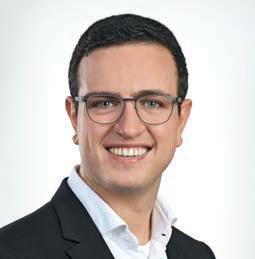



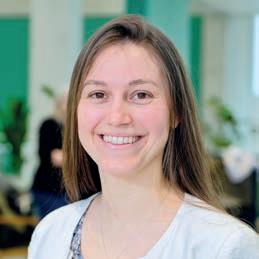
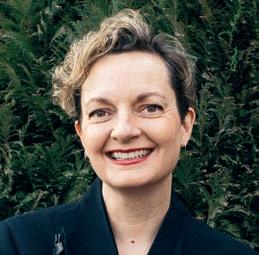
The Responsibility & Sustainability (R&S) team sets the overarching sustainability strategy and direction for the University and coordinates the sustainability measure of the HSG, as approved by the President’s Board. The team closely collaborates with faculty, programme managers and different groups in the University administration to implement the sustainability strategy, including the collection of data for reporting, ranking, and accreditation purposes as well as the organisation and implementation of outreach activities targeting internal and external stakeholders.
R&S Team
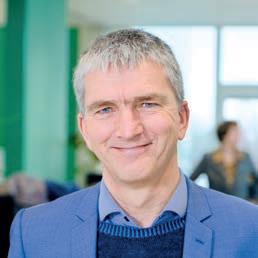 Prof. Judith Walls Delegate, Responsibility & Sustainability
Clémentine Robert Project Manager, Curriculum Development
Dr. Tabea Bereuther Manager, Responsibility & Sustainability
Dr. Fabian Takacs Project Manager, Curriculum Development
Sandra Ramme Deputy Manager, Responsibility & Sustainability; Community Developer, ECOnnect (until Dec 2022)
Lasse van Look Assistant Manager, Co-Curriculum Development (since Jan 2023)
Julian Bömelburg Assistant Manager, Responsibility & Sustainability (since Dec 2022)
Dr. Jost Hamschmidt Project Manager, Co-Curriculum Development
Prof. Judith Walls Delegate, Responsibility & Sustainability
Clémentine Robert Project Manager, Curriculum Development
Dr. Tabea Bereuther Manager, Responsibility & Sustainability
Dr. Fabian Takacs Project Manager, Curriculum Development
Sandra Ramme Deputy Manager, Responsibility & Sustainability; Community Developer, ECOnnect (until Dec 2022)
Lasse van Look Assistant Manager, Co-Curriculum Development (since Jan 2023)
Julian Bömelburg Assistant Manager, Responsibility & Sustainability (since Dec 2022)
Dr. Jost Hamschmidt Project Manager, Co-Curriculum Development
9
Climate Solutions Taskforce

The Climate Solutions Taskforce (CST) focuses specifically on meeting HSG’s climate goals to achieve net zero emissions by 2030. In 2019, the HSG signed the ‘Global Climate Letter for Universities and Colleges’, part of UNFCCC’s Race to Zero campaign. The CST has initiated a university-wide Greenhouse Gas (GHG) accounting and determined the University’s carbon footprint for 2019, 2020 and 2021. Furthermore, the team has developed an HSG roadmap to net zero, outlining how emissions can be reduced in the University’s operations and how innovation in research and teaching, including the Master’s level Managing Climate Solutions (MaCS) certificate programme, can increase awareness.


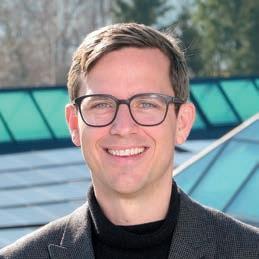

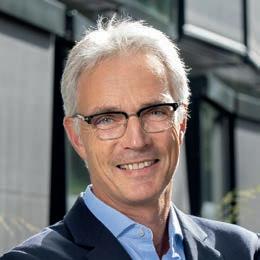
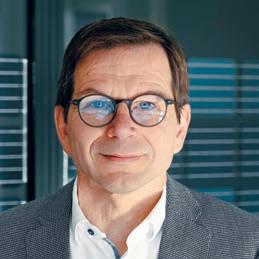
CST Core Team
Working Group Social and Economic Sustainability
Created in 2022, the Working Group on Social and Economic Sustainability has been focusing on the social and economic dimension of the HSG’s comprehensive and integrated sustainability strategy. The working group is tasked with anchoring socio-ecological and socio economic topics more deeply within the overarching HSG sustainability strategy. A steering committee meets regularly to advise the working group on strategic directions. To meet its mandate, the working group engages internal and external stakeholders in defining material topics by assessing the social and economic impacts of the University. The results of this process will be integrated within the existing sustainability strategy and used to define an initial roadmap of related goals, measures, and indicators. A draft will be presented to the President’s Board by mid-2023.
Working Group Social and Economic Sustainability
Prof. Rolf Wüstenhagen Co-Head, Climate Solutions Taskforce
Prof. Dirk Lehmkuhl Lead, Working Group on Social and Economic Sustainability
Prof. Judith Walls Co-Head, Climate Solutions Taskforce
Tobias Fehr-Bosshard Project Manager, Working Group on Social and Economic Sustainability
Prof. Moritz Loock Manager, Climate Solutions Taskforce Pierrine Imboden Project Collaborator Social/Economic Sustainability Strategy
Prof. Merla Kubli Programme Manager, MaCS
10 Purpose and Strategy
Delegate for Equality, Diversity & Inclusion
In 2022, the President’s Board created the role of a President’s Delegate for Equality, Diversity and Inclusion. This position is held by Prof. Isabelle Wildhaber, who is responsible for setting and implementing the EDI strategy in collaboration with several internal units.


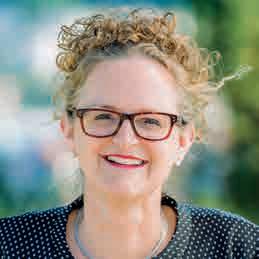
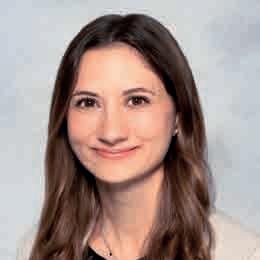
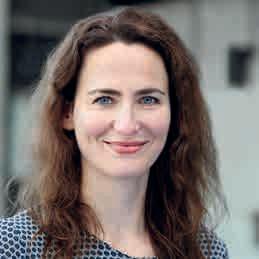
Diversity & Inclusion Team
As part of the Vice President's Board for External Relations, the Diversity & Inclusion (D&I) service unit offers support and advice in the fields of equality and special needs to organisational units of the University and individuals. In addition, the D&I service unit supports the Equality Committee and is responsible for its office. It works closely with the chairperson of the Equality Committee, Prof. Isabelle Wildhaber. The Equal Opportunities advice centre is the point of contact for issues related to personal integrity, diversity, gender equality, family and care responsibilities, sexual orientation, social origin, age, racism, and xenophobia. The unit also develops concepts and projects on implicit bias training, inclusive language, respect, and LGBTIQ+ topics and publishes the biannual HSG Diversity Report. The Special Needs advice centre is the point of contact for enquiries about studying/working with a disability and/ or chronic illness, as well as specific health needs resulting from psychosocial stress. The centre provides support and consultations concerning access arrangements, barrier-free infrastructure, and individual services according to requirements.
Prof. Isabelle Wildhaber Delegate, Equality, Diversity & Inclusion
Monika Hessemer Expert, Diversity & Inclusion
Dr. Regula Dietsche Team Lead, Diversity & Inclusion
Dr. Anna-Katrin Heydenreich Expert, Diversity & Inclusion
Dr. Verena Witzig Expert, Diversity & Inclusion
D&I Team
11
Further Structural Elements and Sustainability Commitments
Both R&S and EDI are integral parts of the overall HSG Strategy 2025, our statutes, the University of St. Gallen Act, and the HSG Ethics Code. The HSG Ethics Committee advises researchers at the University of St. Gallen on ethical and legal aspects of research projects. In May 2021, the President’s Board has decided to revise the University’s own Code of Academic Integrity as well as the proceedings in cases of academic misconduct. In addition, our activities are guided by national and international frameworks such as the SDGs and associated initiatives like the UNFCCC SDG Accord and UN PRME, as well as driven by legislation, such as the Federal Act on Gender Equality and the law on procurement.

In addition to the formal responsibilities mentioned above, progress made in the field of sustainability is based on the ideas and initiatives of many
individual University employees, students, and alumni. In total, 13 institutes, centres, competence centres, and departments have a dedicated focus on sustainability topics. Further more than half of all HSG institutes, centres, and departments integrate sustainability topics in their teaching and research activities. Many student initiatives, the ECOnnect platform, the Student Union, and alumni clubs are pushing and leading sustainability initiatives on campus. Employees working in central administration and on teaching innovation are involved in shaping the University’s activities in the field of sustainability. The working group on sustainable infrastructure, the Quality Development unit, the Career and Corporate Services, the Center for Curriculum and Teaching Development (CAT), the Center of Learning and Teaching in Higher Education (HDZ), our local – and the world’s first – spin-off of the Academy of Management Impact Scholar Community, the SQUARE building (which is a learning centre and hub
for constructive dialogue on the future of society and business), and several others are contributing to implement sustainability at the University.
Beyond its borders, HSG is an active member of different sustainabilityrelated networks including the Network for Business Sustainability (NBS), the Alliance for Research in Corporate Sustainability (ARCS), UN PRME, the SDG Accord, CEMS community, swissuniversities, Think Tank Gender & Diversity, the Inclusion, Diversity and Equality Association of Swiss Universities (IDEAS), Netzwerk Studium und Behinderung, the Agenda 2030 community of the Canton of St. Gallen, the Blue Community, benevol St. Gallen, the Network for Sustainable University Business Travel, and others.
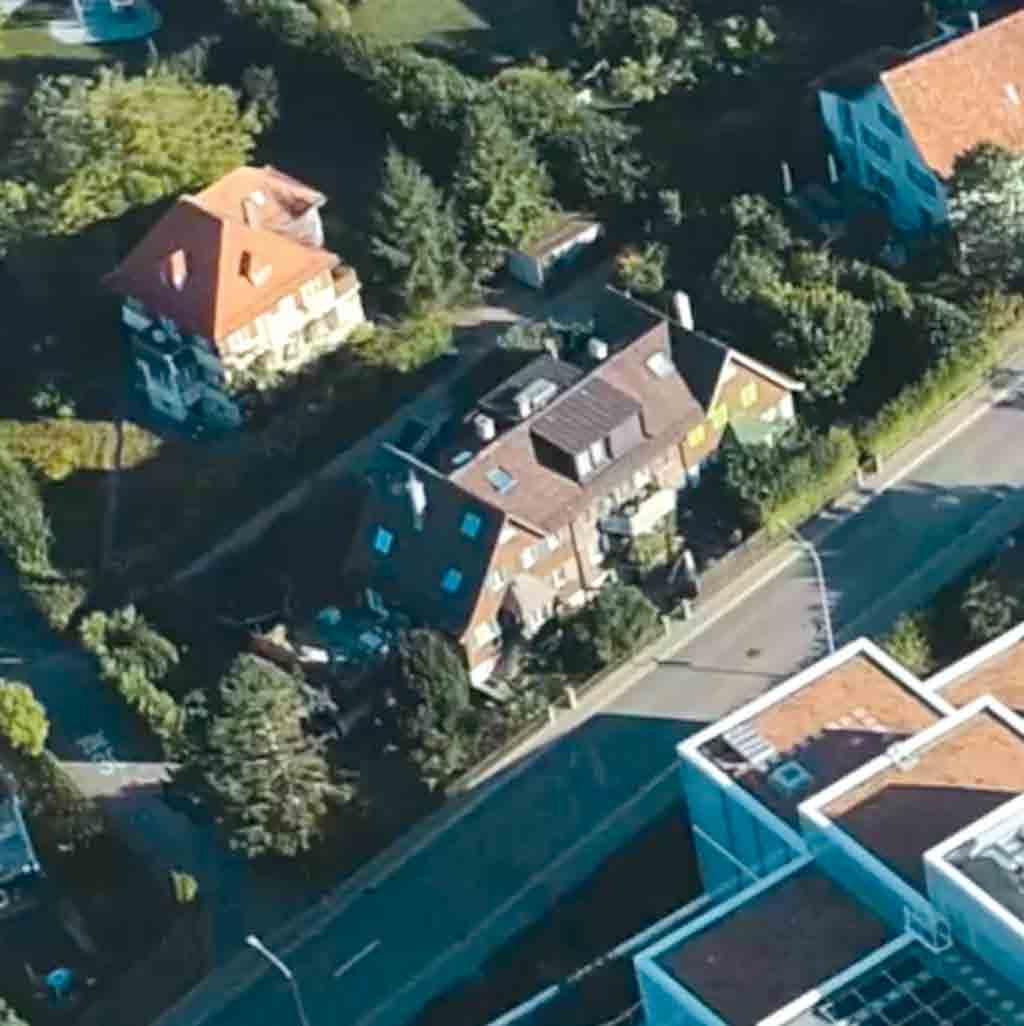





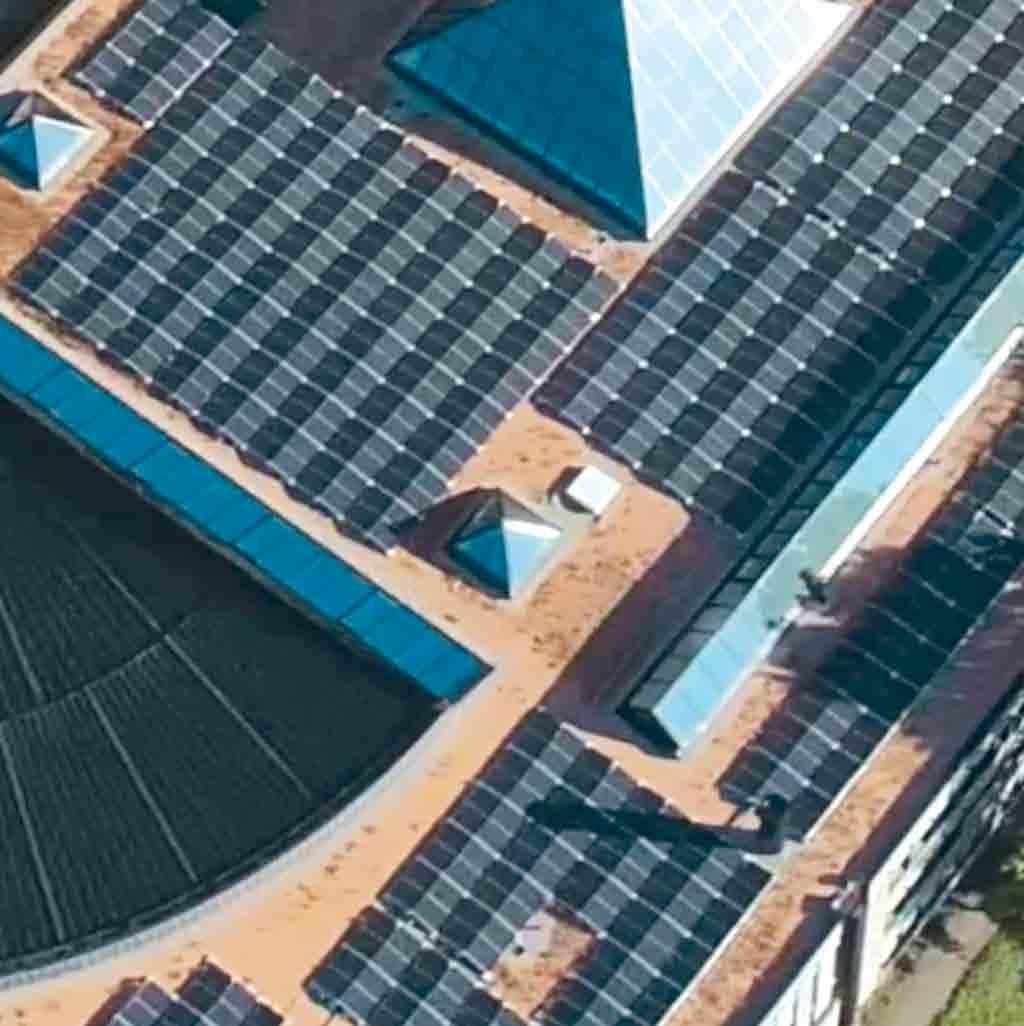


A Word from the Delegate for Equality, Diversity & Inclusion
Equal opportunities and personal integrity are key prerequisites for ensuring quality education. Several developments point to the responsibility of higher education to contribute to a more cohesive and inclusive society and to increase female representation within the organisation, such as the Bologna Process and the national ‘Gleichstellungstrategie 2030’ (equality strategy). In addition, the demand from businesses for female graduates that qualify for leadership positions is also increasing.
These developments show the importance of ensuring equal opportunities within all aspects of our University. With our slogan ‘From insight to impact’ we aim to act as central driver of change in the pursuit of the Sustainable Development Goals. Therefore, Equality, Diversity & Inclusion (EDI) has become a strategic issue in our pursuit of excellence, taking a holistic view encompassing teaching, research, our campus culture and our role as an employer. Although, the underrepresentation of women remains a challenge, in our student body as well as among our faculty, we have progressed in reaching our goals of creating an inclusive learning environment. Several activities have been initiated to make our campus more inclusive and diverse and to ensure the integration of these aspects into our research and teaching. By working together with various internal and external stakeholders, we will strengthen these efforts in the upcoming years.
Prof. Isabelle Wildhaber
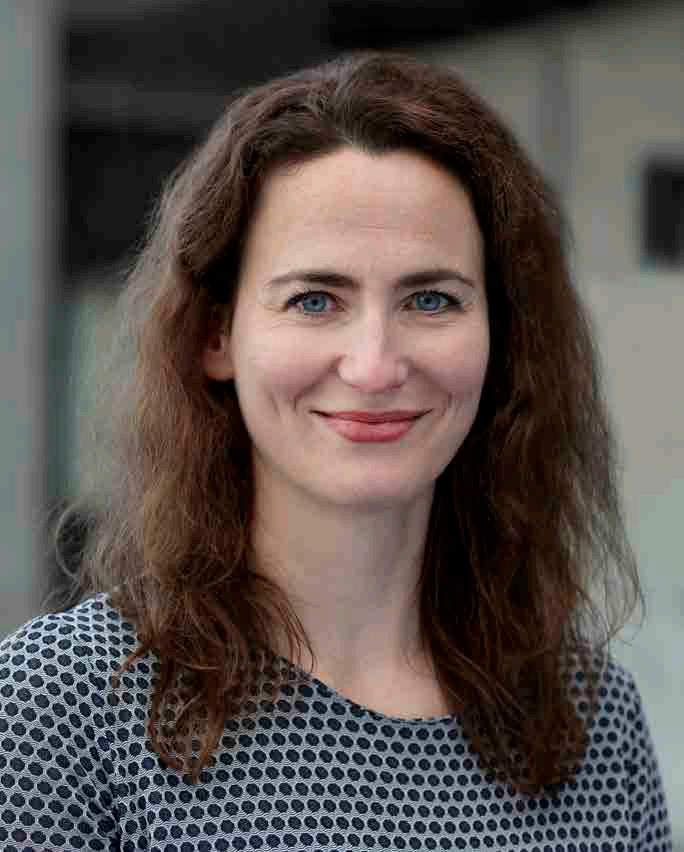
A Word from the Co-Head of the Climate Solutions Taskforce
Climate change is one of the greatest challenges of our times. As one of Europe’s leading business schools, the University of St. Gallen has a particular responsibility in preparing students for the new reality of a carbon-constrained world. As Mark Carney, the former governor of the Bank of England, has put it, firms that fail to manage carbon risk properly may find themselves going out of business. By designing the Managing Climate Solutions (MaCS) certificate programme on Master’s level, we have taken a major step towards enabling students to place an emphasis on climate change in their curriculum. Ever since its launch in 2020, the MaCS certificate has been met with strong student demand – in fact, three times oversubscribed in the three editions that have been offered to date. The programme allows students to combine their main Master’s degree with an additional qualification in managing climate solutions, thereby creating an interdisciplinary setting with students from 13 different Master’s programmes. In line with the University’s mantra of moving ‘From insight to impact’, the programme also involves student projects aimed at implementing specific climate solutions on campus and in the St. Gallen region. In combination with the University’s efforts to reduce its own carbon footprint, we are trying to do our part in addressing the climate crisis.
Prof. Rolf Wüstenhagen
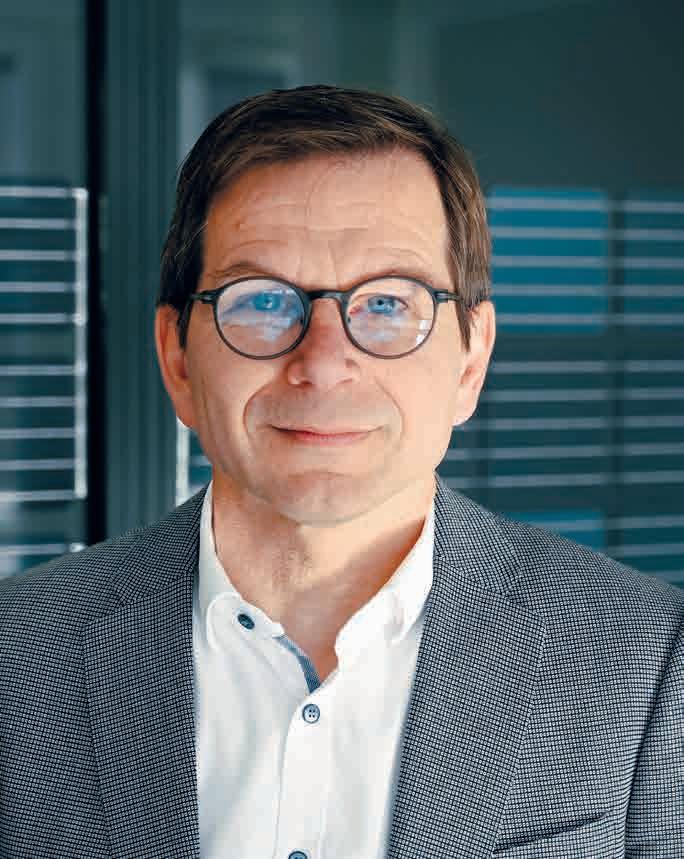
14 Purpose and Strategy
A Word from the Head of the Working Group on Social and Economic Sustainability
Our Working Group Social and Economic Sustainability was launched in the autumn of 2022 with a mandate from the President’s Board. The objective of the working group is to bring the specificity and depth of social and economic dimensions of the University’s sustainability strategy to the same level as the existing environmental as well as the equality, diversity and inclusion strategies. At the same time, the working group is developing the scaffolding for the implementation of those strategic goals.
The working group emphasises process and participation. Our approach is inspired by the Global Reporting Initiative (GRI) and similar frameworks for systematic sustainability management and reporting, but is tailored to the University as a very special type of organisation. We are currently defining the University’s material social and economic topics with key internal and external stakeholder groups and benchmarking our activities with those of our peers. Both activities are the bases for drafting the social and economic dimensions of an integrated sustainability strategy in more depth. We will be structuring the implementation of the strategy around a roadmap of concrete targets with corresponding measures and indicators to evaluate progress.
One of the most exciting things about our University is its decentralised nature. There is already broad range of activities, initiatives, and case examples when it comes to topics around social and economic sustainability. The working group aims to establish participatory infrastructures that promotes mutual learning and collaboration for swiftly creating (even more) positive impact.
Prof. Dirk Lehmkuhl
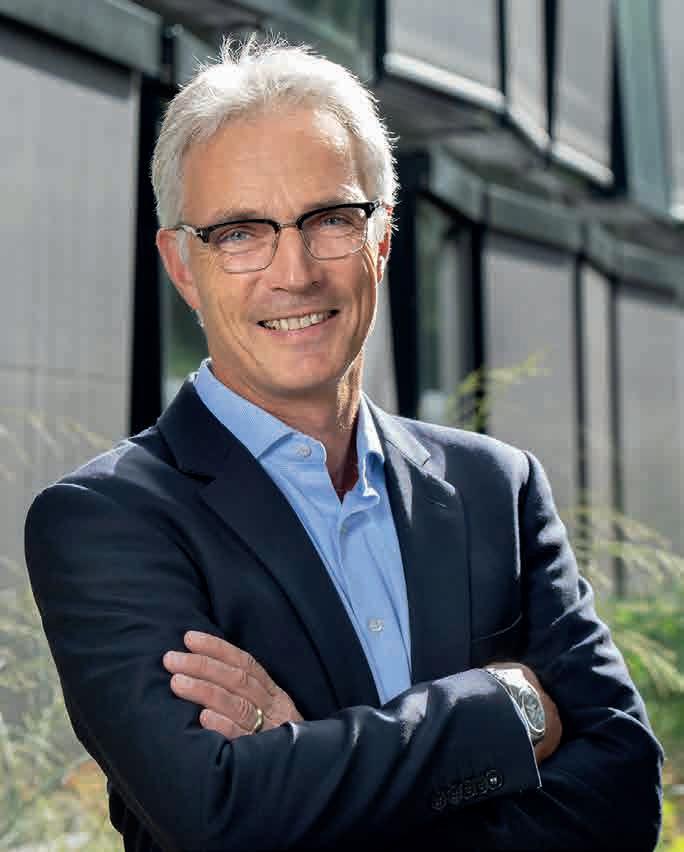
15
From Insight to Impact –HSG Sustainability Strategy
We envision a University of St. Gallen where sustainability is deeply embedded in all aspects of university life. In doing so, we aim to contribute to solving grand sustainability challenges of our time, such as climate change, biodiversity loss and social inequality. This mission guides our actions in transforming HSG towards sustainability.
Integrative thought and responsible action are key elements of the University’s vision. Sustainability is also a core component and overarching area of the HSG Strategy 2025 (as shown in the diagram on the right). The Responsibility and Sustainability area integrates environmental aspects including specific climate action goals and the social and economic dimensions while the Equality, Diversity and Inclusion (EDI) area focuses specifically on equal opportunities, gender, and respect.

The HSG sustainability strategy builds on the HSG Strategy 2025 to develop and implement an integrated environmental, social, and economic sustainability approach grounded in scientific frameworks. We regularly reflect and discuss the impacts and directions of our goals with internal and external stakeholders allowing us to pursue ambitious goals and drive future initiatives in each area.
Integration of sustainability into the overarching HSG Strategy 2025
TEACHING RESEARCH CAMPUS & OUTREACH
Responsibility & Sustainability
(1) Environmental Sustainability Strategy (Climate Change + Biodiversity + Circular Economy)
(2) Social and Economic Dimensions of the Sustainability Strategy
(3) Equality, Diversity & Inclusion Strategy
Equality, Diversity and Inclusion
Dimensions of the HSG sustainability strategy
16 Purpose and Strategy
With its sustainability strategy, HSG aims to embed sustainability into all its core areas of activity: teaching (all degree levels), research, as well as campus & outreach (as shown in the diagram on the right).
–Foster interdisciplinar y sustainability research
Goals of the HSG sustainability strategy
Responsibility & Sustainability
In 2021, the Delegate for Responsibility & Sustainability developed a university-wide sustainability strategy, focusing on environmental topics that underpin socio-economic systems. This strategy has the intention to achieve two main goals by 2025:
1. preparing HSG students to become organisational leaders in a world that must solve severe environmental crises such as climate change and biodiversity loss;
2. leading by example and getting halfway to net zero.
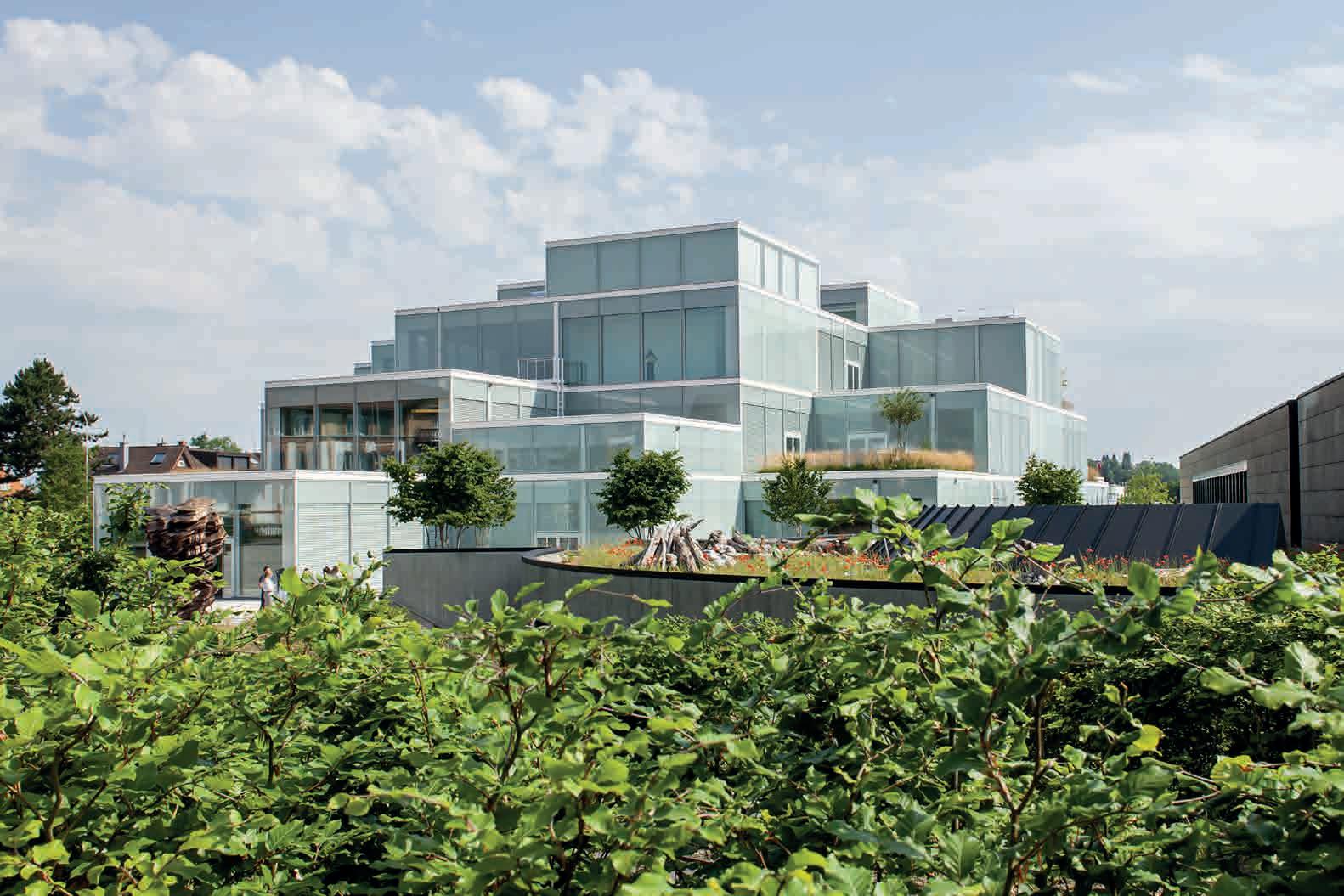
Building on the Planetary Boundaries framework by the Stockholm Resilience Centre, the current sustainability
strategy seeks to embed the topics of climate change, biodiversity loss, and circular economy into all three core activities of the University: teaching, research, and campus & outreach.
To address the topic of climate change, a detailed climate strategy is being developed to reach the goal of net zero by 2030. Apart from that, the current sustainability strategy is the foundation of an integrated sustainability strategy being developed to embed the socio-ecological and socio-economic dimensions more deeply. These two developments will be expanded upon more fully in the following sections.
TEACHING (incl. Exec . Ed.) RESEARCH CAMPUS & OUTREACH
existing structur es
r esour ces
CURRICULUM – Widen sustainability o erings in courses & new course o erings CO -CURRICULUM – ‘NextGen Sustainability’ programmes Collaborate with and levera ge
and
– Support development of sustainability expertise
–
–Net zero, inclusive and diverse campus
Make sustainability visible on campus and beyond
17
Climate Strategy
As a key part of the existing environmental sustainability strategy, HSG's climate strategy aims to deliver on the University’s pledge to reach net zero emissions by 2030. As a starting point, we measured our current carbon footprint, which amounted to 25,583 tons of CO2 in 2019. The large majority of those emissions are scope 3 emissions as defined under the Greenhouse Gas Protocol, originating from upstream and downstream processes, including long-distance travel by students and faculty. To address emission hotspots and leverage opportunities for climate action, we have developed a roadmap that focuses on six action areas,
TEACHING RESEARCH CAMPUS & OUTREACH
Climate change
Innovation Risk Management & Operational Excellence
Climate roadmap with its six action areas


Social and Economic Dimensions: Towards a More Integrated HSG Sustainability Strategy
The Working Group on Social and Economic Sustainability is applying a systematic approach to identify material socio ecological and socio economic topics that are relevant at HSG. The process is inspired by the Global Reporting Initiative (GRI) and the SDG framework for systematic sustainability management and reporting, but is tailored to HSG as a public higher-education institution. The strategic formulation of the social and economic dimensions of
covering activities in teaching, research, and on campus & outreach. The roadmap addresses innovation potential while at the same time managing risk and striving for operational excellence. This holistic approach allows us to embed climate action into the University’s core processes and create synergies. As an example, students in the innovative Managing Climate Solutions programme implement low- carbon projects on campus, such as crowdfunding a solar roof on the university gym, thereby raising further awareness and reducing our carbon footprint. the sustainability strategy will build around the existing core elements: teaching, research, and campus & outreach. The working group will also assess how the University is creating direct and positive impacts internally and beyond. In doing so, the working group is defining concrete goals and a roadmap of measures and indicators to achieve those goals.
18 Purpose and Strategy
Equality, Diversity and Inclusion
The Diversity & Inclusion (D&I) Team designed an equality, diversity & inclusion strategy in 2021. It is embedded in the overarching HSG Strategy 2025 and includes the following key strategic goals:
LGBTIQ+
1. embedding equality, diversity and inclusion in our structures and culture;
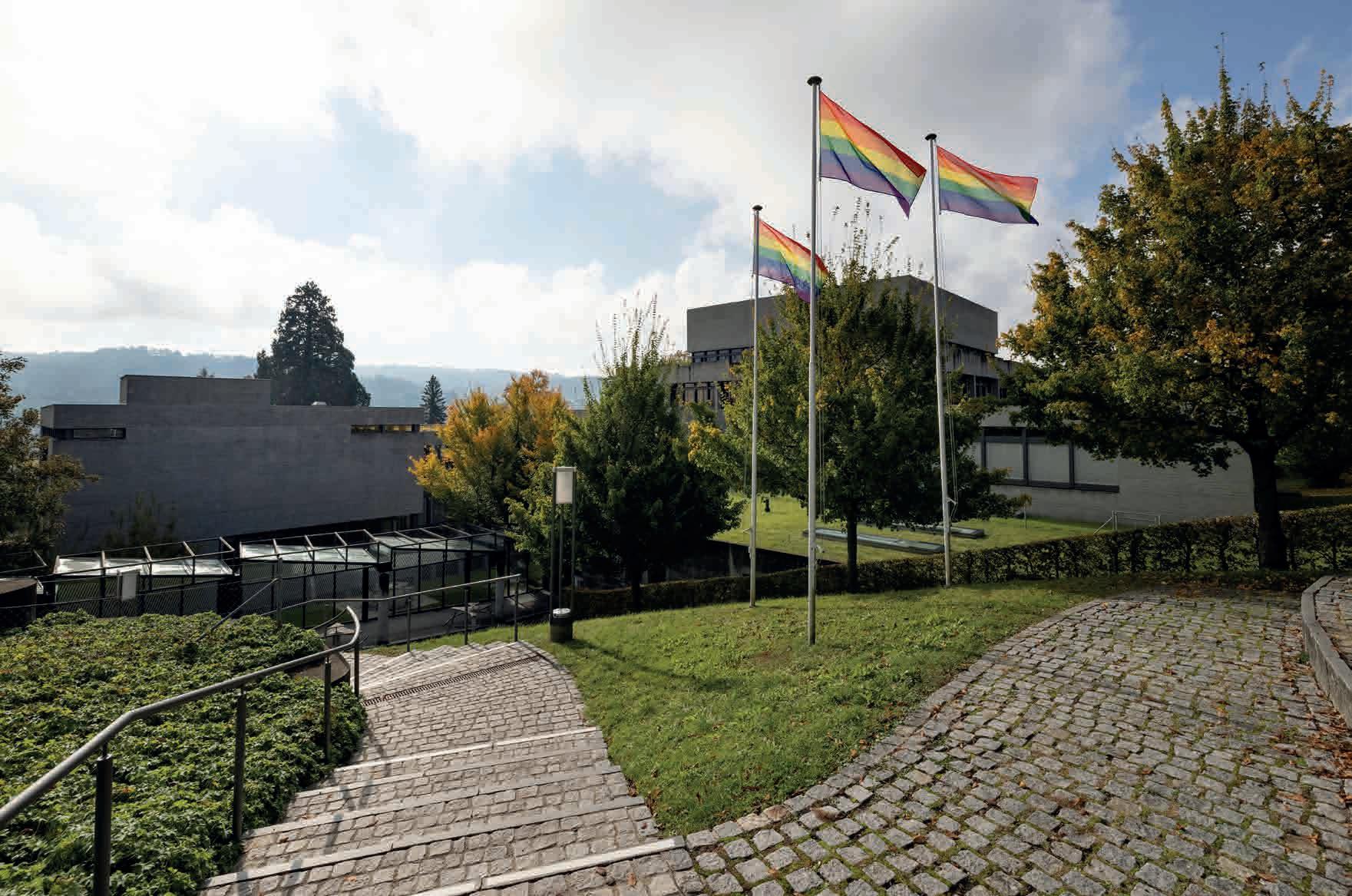
Racialized Ascriptions
2. ensuring equal opportunities and respect for all members of the University;
3. integrating equality, diversity and inclusion into teaching, research, and executive education.
Several related initiatives and processes are ongoing within the three focal areas structure, culture, and individual. For example, measures have been implemented to enhance female representation among faculty to 30% by 2025. Further, HSG has taken actions to raise awareness of the reality of life faced by University members with special needs. Apart from that, HSG is committed to develop academic specialisations on the topics of equality, diversity and inclusion in the core disciplines, in academic programmes, and in research.
LGBTIQ+
D&I matrix from the EDI Strategy 2025
STRUCTURE CULTURE INDIVIDUAL Gender
/
Family
Care
Special Needs
Structure Culture Individual
/ Care Gender
Family
Racialized Ascriptions Special Needs
19
“Sustainability is a core part of the HSG Strategic Plan 2025, integrated across all our activities. We want to prepare our students for the future as well as walk the talk.”
Prof. Judith Walls Delegate, Responsibility & Sustainability
Understanding of Sustainability
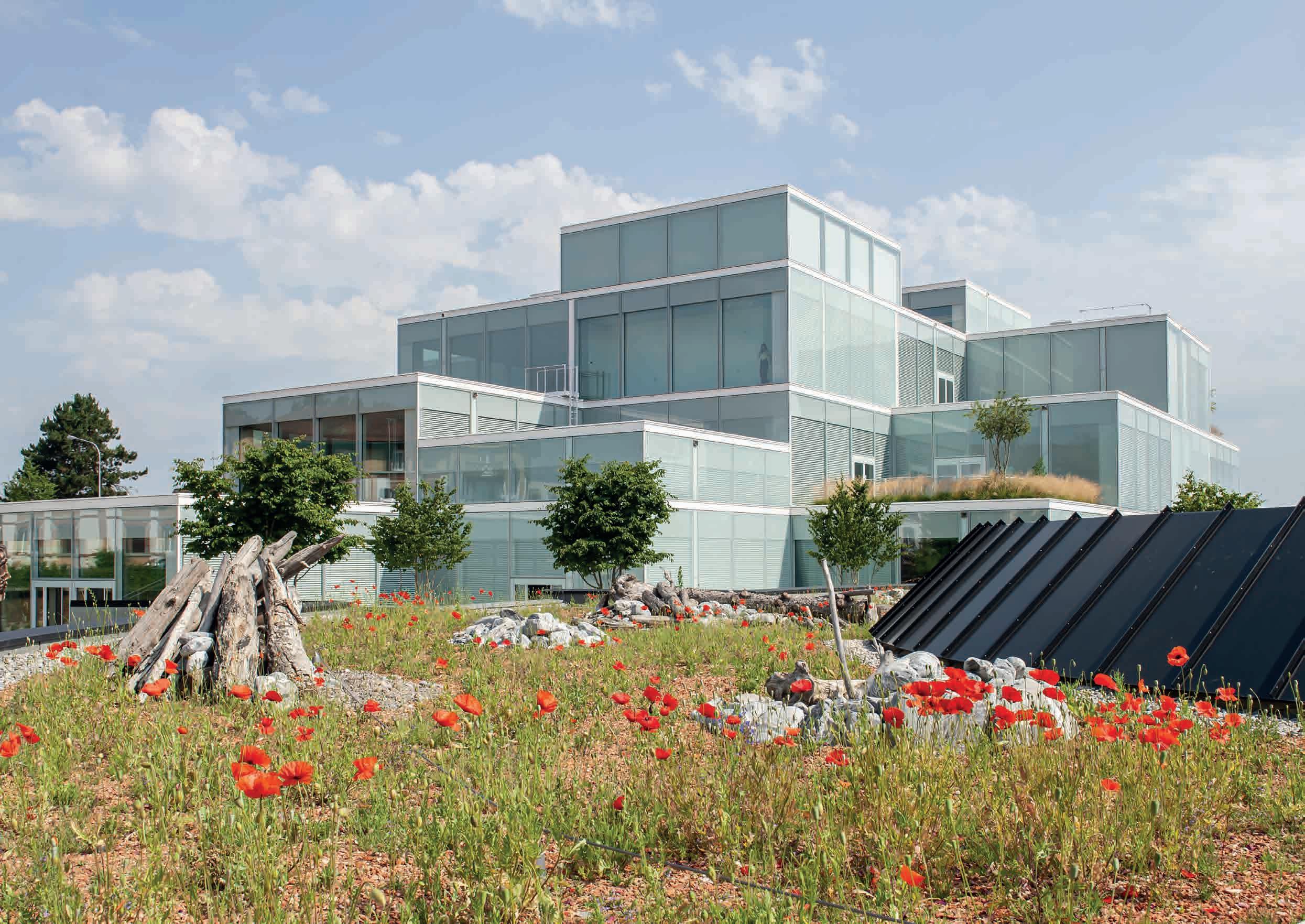
In line with the UN Sustainable Development Goals, we understand sustainability as the goal of balancing our social and economic systems within the limits of the planetary boundaries – particularly climate change and biodiversity loss. The complexity and interdependency of environmental, social, and economic sustainability challenges require an integrative approach, which forms the foundation of our sustainability strategy.
This chapter addresses PRME Principle 2: Values.
For an overview of all PRME principles, please see page 22.
21
Principles for Responsible Management Education
By six principles, PRME engages business and management schools to ensure they provide future leaders with the skills needed to balance economic and sustainability goals while drawing attention to the Sustainable Development
Principle 1 | Purpose
We will develop the capabilities of students to be future generators of sustainable value for business and society at large and to work for an inclusive and sustainable global economy.
Principle 2 | Values
We will incorporate into our academic activities, curricula, and organisational practices the values of global social responsibility as portrayed in international initiatives such as the United Nations Global Compact.
Principle 3 | Method
We will create educational frameworks, materials, processes and environments that enable effective learning experiences for responsible leadership.
Goals (SDGs) and aligning academic institutions with the work of the UN Global Compact. Our University incorporates these principles into all three fields of our sustainability strategy, namely teaching, research, and campus & outreach.
Principle 4 | Research
We will engage in conceptual and empirical research that advances our understanding about the role, dynamics, and impact of corporations in the creation of sustainable social, environmental and economic value.
Principle 5 | Partnership
We will interact with managers of business corporations to extend our knowledge of their challenges in meeting social and environmental responsibilities and to explore jointly effective approaches to meeting these challenges.
Principle 6 | Dialogue
We will facilitate and support dialog and debate among educators, students, business, government, consumers, media, civil society organisations and other interested groups and stakeholders on critical issues related to global social responsibility and sustainability.
In 2010, the University of St. Gallen officially adopted the UN Principles for Responsible Management Education (PRME) and immediately assumed an active role in implementing these Principles internally and within the business school community.
22 Understanding of Sustainability
HSG Student Shapes PRME Youth Initiative
Anna Kurth, a student in International Affairs and former president of the student organisation oikos St. Gallen, was recognised by UN PRME for her outstanding contribution to the development of the PRME Global Students (PGS) initiative.
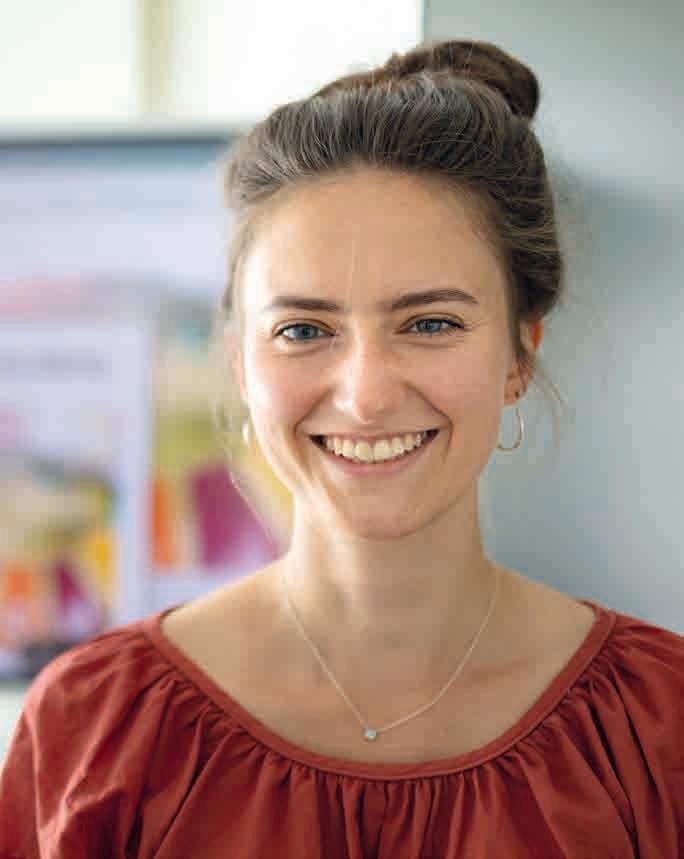
In summer 2021, Anna took on the position within PGS as a regional leader of Western Europe. For one year, she was engaged in interlinking and supporting student initiatives working on the SDGs. Together with eight other students across the globe, Anna built PGS, a global network for creative collaboration and collective action that connects, empowers, and creates value for more than 300 sustainabilityoriented student organisations worldwide.
‘A large portion of PGS's success relies upon Anna's remarkable leadership, which proves the excellence and commitment of the University of St. Gallen’s student body and the institution's commitment to transforming responsible management education’, commented Mette Morsing, head of PRME.
For Anna, this experience was highly valuable. She says: ‘My term as PGS Regional Leader has shown me how many inspiring student initiatives can be found at universities around Europe and how empowering it can be to connect with each other on an international level. At the same time, I learned that it is precisely the student organisations acting in local contexts which they understand best that have the power to really make a change.’

23
Our Guiding Principles
The University of St. Gallen takes an integrated view of sustainability that includes environmental topics as well as social and economic aspects. As such, we are orienting our activities at the United Nation’s Sustainable Development Goals (SDGs).

The UN defined 17 SDGs to be achieved globally by 2030 by all member states. Academia, NGOs, and businesses are actively contributing to achieving these goals. Together, states and organisations are seeking shared solutions to the world’s most urgent grand challenges.


We orient our activities around the SDGs and have selected those that are most relevant to the University’s activities and impact to help focus our sustainability approach. In our 2018 UN PRME report, we selected SDGs 4, 5, 7, 12, 13, 16, and 17, as determined through an expert group evaluation process. This selection undergoes constant and ongoing reflection and adaptation, as the University’s strategy and goals on sustainability develop based on the planet’s challenges and related scientific insights. Accordingly, as part of the development of the environmental sustainability strategy, we have added an emphasis on SDGs 14 (life below water) and 15 (life on land) in 2021. This corresponds with our integrated understanding of sustainability: that an intact nature is a prerequisite for social and economic well-being. When aligning the equality, diversity & inclusion strategy with the global goals, SDG 10 (reduced inequalities) was added as an important impact area.




We will continue to evaluate the relevance of the SDGs during the ongoing strategizing work by the Working Group on Social and Economic Sustainability. Several institutionalised processes have taken and will take place to further deepen the social and economic dimension of an integrated sustainability strategy. This included a six-month process in 2022 known as the ‘HSG Collegium’ on the topic of social cohesion with the long-term goal of creating an advanced institute. One of the focus areas was dedicated specifically to social sustainability and included a broad participation
Environment
Relevant SDGs for HSG; allocation based on Stockholm Resilience Center


of internal and external HSG stakeholders. Further focus groups and expert interviews are planned to help define material social and economic topics and linking them to the SDGs. At the same time, decentralised initiatives are a key strength of the University, encouraging desirable contributions to additional SDGs.
 Environmental Social Economy Society
Environmental Social Economy Society
24 Understanding of Sustainability
As a business school, we consider providing quality tertiary education as our core activity. We strive to create an inclusive learning environment, respect special needs, and promote sustainable development in all our programmes, thus preparing our students to become responsible leaders equipped to solve the grand challenges of our time.

We provide equal opportunities for everyone regardless of their gender. Furthermore, we actively work on ensuring a non-discriminating environment and on increasing the proportion of female students and faculty.

We are constantly increasing the share of renewable power generation on campus and improving the energy efficiency of our operations. Furthermore, our research activities in this field include investigating the management of renewables and supporting the transition towards a clean energy future.

We empower and promote the social, economic and political inclusion of all university members including students and aim to ensure equal opportunities in all of university life. We implement policies to achieve greater equality and conduct research to contribute to better knowledge on how to reduce inequality within and among countries.
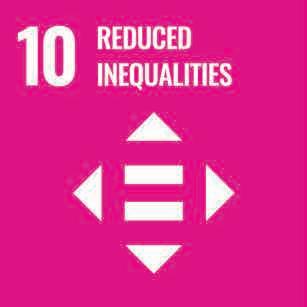
We are integrating the concept of circular economy into our teaching and research to reduce reliance on raw materials and energy in business activities. As a university, we are working to decrease the material and energy footprints of our own operations.

We are integrating climate education into our programmes, hence creating the necessary sense of urgency among our students. Furthermore, HSGs own net zero by 2030 pledge obliges us to undertake significant climate actions.

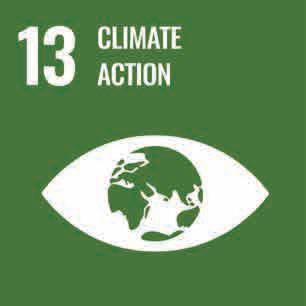
Having an intact nature is a fundamental prerequisite for social and economic well-being. Therefore, we have increased the biodiversity on campus and developed courses on business and biodiversity. Furthermore, we participate in the Blue Community initiative and conduct research on biodiversity topics.
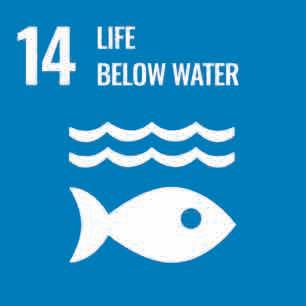
The HSG governance structures define clear responsibilities and welcome participation from all University members. Furthermore, our research activities contribute to the strengthening of human rights and international institutions.

In acknowledging that sustainable development requires multi-stakeholder partnerships, we foster local and global collaboration by building and participating in various communities and networks. Furthermore, our study programmes promote inter- and transdisciplinary engagements, our research promotes sustainable development, including macroeconomic stability and international trade, and our branches in Asia and Latin America support collaboration across borders.

25
“Our direction is clear: everyone teaching at HSG must become an ambassador for sustainability.”
Prof. Martin Eppler, Vice President Studies & Academic Affairs
Teaching
Goal
Integrating responsibility and sustainability into all levels of education.
Key Achievements
Successfully supported two programme reforms aimed at embedding sustainability into the core of programmes and worked with programme managers at different levels to facilitate sustainability integration. Processes developed and anchored to existing structures to support
faculty in integrating sustainability into courses and to co-create classes with students and student associations.
Launched the NextGen sustainability programmes in 2021, including a mentoring track and career events.

This chapter addresses PRME Principle 3: Method.
For an overview of all PRME principles, please see page 22.
27
Overview of Activities in Teaching
At all levels of education, HSG offers numerous courses and several programmes that integrate sustainabilityrelated issues. A list with a selection of these offerings is provided in the Appendix on pages 36 ff. To further promote learning environments that foster the development of transformational leadership skills and sustainabi lity expertise, multiple teams and individuals at HSG have been involved in various processes and initiatives over the last two years:
Curricular Processes and Initiatives
– Sustainability was integrated into the curricula of the Assessment Year (first year of study) and the Master’s in General Management (MGM), as part of the respective programme reforms.
– The initiation of a new certificate programme for sustainability on the Bachelor’s level has been approved by the President’s Board and is being developed for implementation in 2024.
– Faculty workshops/training for embedding sustainability in existing courses and programmes have been held, as well as for developing new courses.
– Various sustainability experts from the private sector, academia, and other fields were invited to give a guest lecture and share their expertise.
– New formats have been designed for integrating students into sustainability-related curriculum development.
– An online open-access platform for sustainability-related teaching materials is under development in cooperation with WWF and the Sustainable Development Solutions Network (SDSN).
Co-Curricular Processes and Initiatives
– In 2021, the NextGen Sustainability programmes were launched, offering workshops on impactful career paths and a mentoring programme with sustainability professionals.
– A reform of the Campus Credits scheme is ongoing to promote co-curricular activities that embrace responsible action and sustainability.
– The ECOnnect platform connects numerous student associations around the theme of sustainability and organises events throughout the year.
– The new learning centre SQUARE is a place for transformative learning experiences and an inspiring environment for developing sustainable and disruptive solutions.
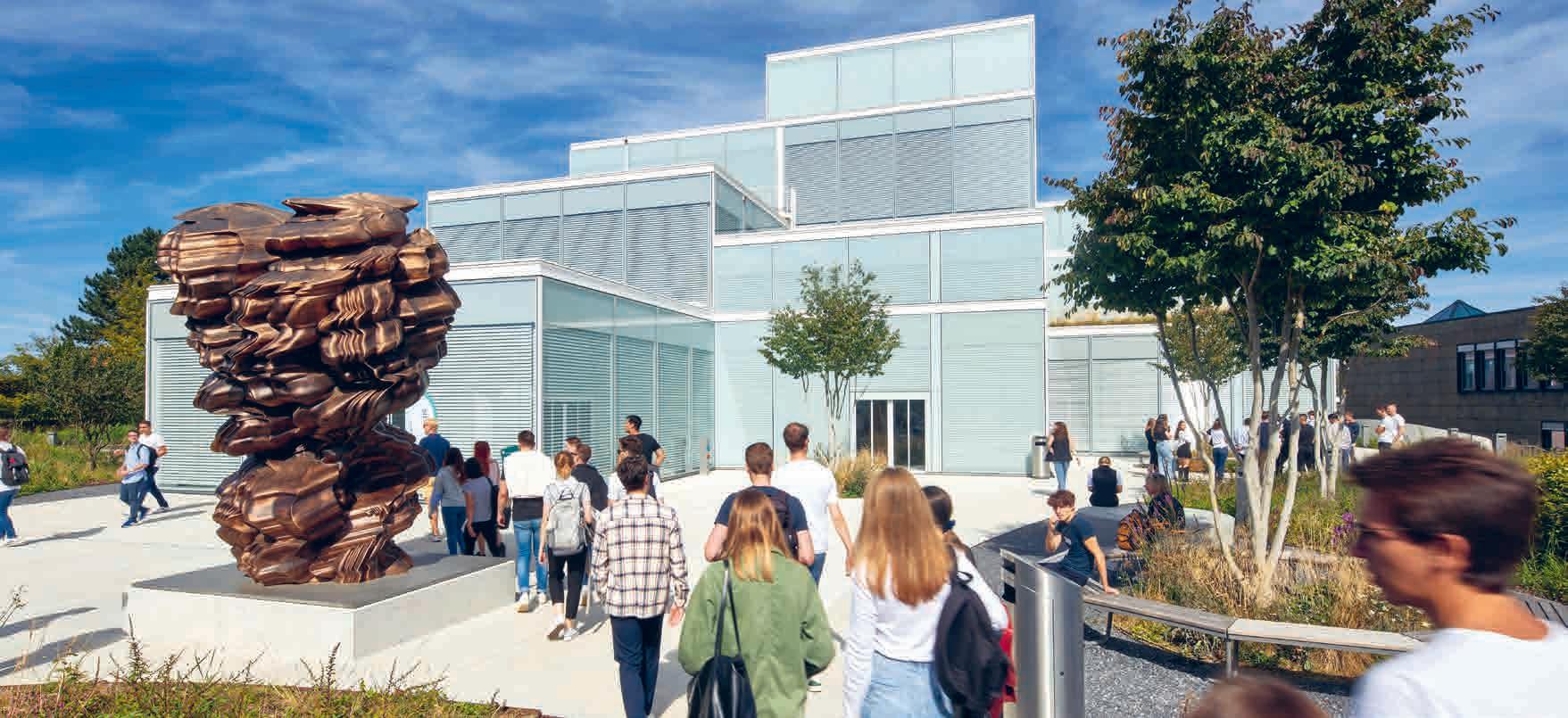
The University of St. Gallen aims to educate responsible entrepreneurially-minded students whose actions are informed by environmental and social grand challenges. Building on a wide variety of courses and programmes that integrate sustainability- related topics, HSG is committed to further embedding sustainability in its curricula.
28 Teaching
The aim of HSG regarding curriculum development is simple: from 2025 onwards, all students should have the opportunity to learn about sustainability and gather relevant practical experience through curricular activities. This requires an integrative approach whereby responsibility and sustainability (R&S) topics are addressed in all programmes and at all degree levels. To accomplish this, two R&S team members are dealing with curriculum development in collaboration with many internal and external stakeholders.

Impactful first milestones have already been accomplished in a collaborative bottom-up and top-down effort. For example, the R&S team contributed to the Assessment Year reform by helping to integrate sustainability into the case study of the mandatory Integrative Project seminar. Additionally, the team supported the reform of the Master’s in General Management to further integrate sustainability into the core of the programme’s curriculum. A new course on ethics, responsibility and sustainability in research was also created for the Ph.D. in Management (PMA) programme, in collaboration with the latter’s programme manager. More generally, the R&S team provided thematic input to faculty from various bachelor and master programmes
Curriculum Development: Integrating
and ran strategic workshop sessions at the executive education level to support sustainability integration into the curricula.
To establish a faculty support system, the team has developed a yearly seminar with HSG’s Center of Learning and Teaching in Higher Education (HDZ) to empower lecturers to promote responsibility and sustainability topics in student learning. To obtain student support for this effort, the ‘Teaching Analysis Polls on sustainability’ were created, whereby students can provide feedback on their sustainability learning experience in ongoing courses. Even more substantial student involvement occurs through the ‘ Sustainability Curriculum Innovation Lab’, a collaborative format wherein students brainstorm solutions for integrating sustainability topics into specific courses. All of this is accompanied
by various workshops and input sessions at regular events (e.g., Dies Academicus, Mid Researchers Days, oikos Sustainability Week, and the School of Management Conference).
These initiatives will be followed by a number of further activities. One significant project is the creation of an undergraduate certificate programme in sustainability, supported by the Bachelor’s programme in Business Administration. This certificate programme has been approved by the President’s Board and is currently under development. Furthermore, an online platform for sustainabilityrelated teaching materials is being created collaboratively with WWF and the Sustainable Development Solutions Network. Together, these efforts are contributing to our University’s goal of equipping students with the skills they will require in the future.
Student response, Positive Impact Rating 2021
It is the responsibility of higher education institutions to equip students with the skills necessary to navigate current and future sustainability challenges in an increasingly complex world. By making sustainability topics an integral part of the curricula, the University of St. Gallen is embracing this responsibility.
Sustainability at the Core of HSG
“HSG should start including mandatory classes in the curriculum that teach about sustainability and climate solutions.”
29
In the Managing Climate Solutions (MaCS-HSG) certificate, master students develop entrepreneurial solutions to one of the most pressing societal challenges of our time: climate change.
2
3 Low Carbon Innovation
10 MaCS projects on 5 topics
3 cohorts
55% female
80
113 students from13 Master’s programmes
Community solar
My CO2 challenge Plane2train
trees planted in Toggenburg
Climate art
Climate education
99 % would choose MaCS again (n=84)
99 % found the MaCS certificate insightful and inspiring (n=84)
100 % would recommend MaCS to others (n=84)
Turn your career climate positive Master certificate in Managing Climate Solutions (MaCS-HSG)
core courses – Climate Solutions 101 – Multidisciplinary Perspectives on Climate Solutions Electives in 3 core areas 1 Climate and Sustainability 2 Energy Transition & Governance
Feedback 30 Teaching
The Executive School of the University of St. Gallen and over 20 institutes offer around 200 different executive education programmes and several degree programmes such as MBA and EMBA, including the new embaX. All these programmes align with HSG’s established vision of transforming ambitious professionals into inspiring and socially responsible leaders. Among the diverse programme offerings, an increasing number cover sustainabilityrelated topics.
The German-language Executive MBA programme (EMBA HSG) defines itself as the most relevant programme in the German-speaking region due to its regionality and deliberate focus on environmental, social, and governance (ESG) topics. The large proportion of teaching hours dedicated to sustainability topics across the EMBA
Sustainability in Executive Education Programmes
curriculum has led to the programme consistently being recognised by the Financial Times Global EMBA rankings as one of the best in Europe and worldwide (#6 Global EMBA Rankings 2022)

The newly designed embaX programme, a collaboration between ETH Zurich and HSG, pursues the goal of bringing about positive social impact on individuals, organisations, and society. A particular focus is the direct application of initiatives aimed at positive change, for example, through social or entrepreneurial innovation projects.
In the curricula of the MBA programmes (full-time & part-time), sustainability is an integral component that is central to the interdisciplinary management approach taught in the programme. Overall, 35% of the content has an ESG focus. This was recognised by the Corporate Knights Better World MBA ranking in 2021 when it was ranked #9. In 2022, the Financial Times Global MBA Ranking placed it #12 in the world in terms of ESG.
In addition to these executive education programmes run by the Executive School, different institutes and centres run dedicated programmes on sustainability-related topics. These offerings cover a broad range of subjects, including sustainable finance, regenerative leadership, diversity and inclusion, renewable energies as well as sustainability strategies and business models. An overview of these diverse offerings is contained in the Appendix on pages 39–40.
More than ever, executives need to be equipped with knowledge and skills on sustainability issues in preparation for a business world that has to deal with grand challenges, such as climate change and social inequality.
“ESG topics have been an important part of our extensive executive education portfolio for many years.”
Prof. Urs Fueglistaller, Vice President for Institutes & Executive Education
31
High demand in the broad range of sustainability-related executive trainings
Built of glass and concrete, SQUARE’s exterior may not come across as particularly sustainable, but the open grid design of its interior creates a flexible and innovative physical space that facilitates new forms of learning and interaction. Thus, the SQUARE is perceived as an environment promoting further development of the learning and teaching culture at the University of St. Gallen.
During the planning and construction of the building, ecological and social aspects were considered. Contentwise, sustainability plays an important role in the different formats that are curated by the SQUARE team and are breaking traditional boundaries between curricular, co-curricular, and public events. To give two examples: As part of the Artists in Residence format, SQUARE invited various
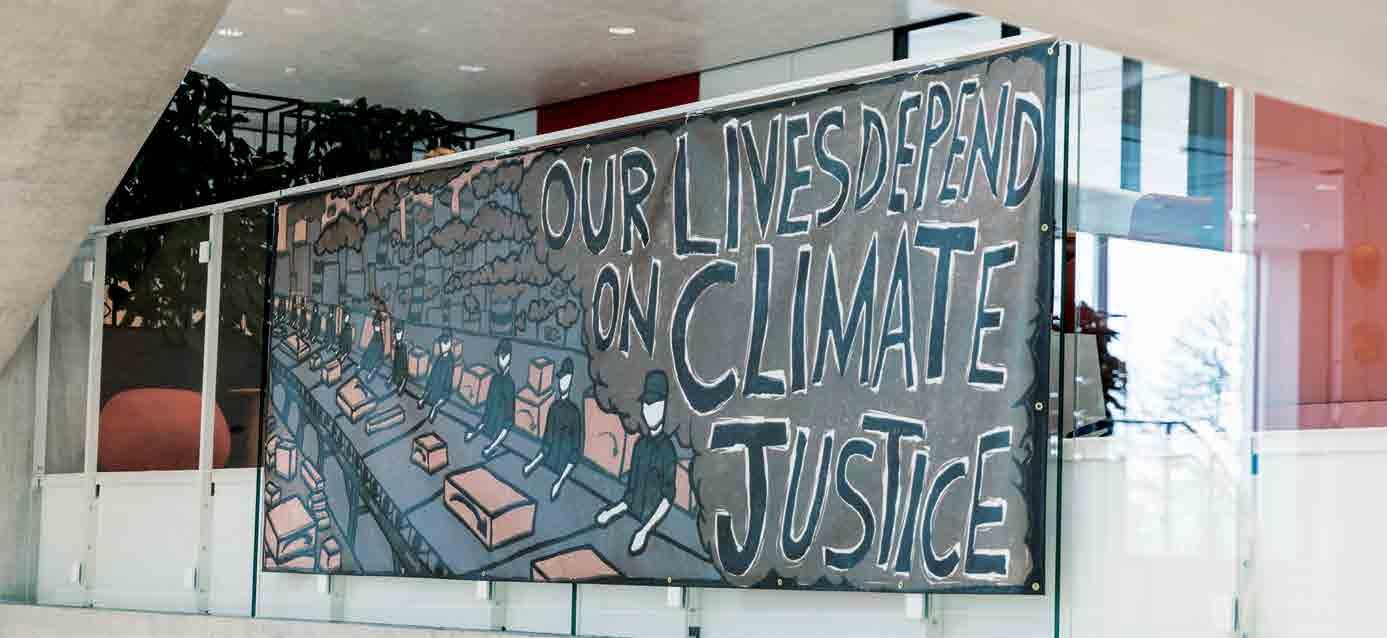
Transformative Learning at the SQUARE



Since February 2022, the new HSG learning centre SQUARE has been prototyping the university of the future – where sustainability is integrated in various ways. Fuelling new, trailblazing forms of learning and teaching, the SQUARE provides a place for fruitful encounters and mutual inspiration.
council of Blue Earth Capital AG, held a speech where he talked about the future of impact investing, among other topics.
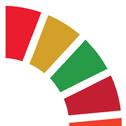
interdisciplinary artist-researchers from the Speculative Energy Futures collective to create the pop-up exhibition ‘Unpacking Energy Transition’. This was accompanied by a two-week intensive Contextual Studies course led by two professors from the University of Alberta, who co-curated the format. Within the Personalities in Residence format, Urs Wietlisbach, co-founder of the Partners Group and foundation
Apart from these initiatives, sustainability-related student associations such as oikos St. Gallen and Student Impact make intensive use of the SQUARE building for their events, which are mainly open to the public. Furthermore, a broad range of courses that deploy innovative teaching approaches take place at the SQUARE as well, many of them dealing with sustainability. To increase the visibility of these courses, SQUARE has created impact badges that indicate how sustainability is integrated into the content and teaching approach of the former. In alignment with its mission to be a public space for encounters and a forum for dialogue, the SQUARE hosts various events that foster exchange between academia, society, business, and politics.
“Our classroom has been a key factor in shaping my personal attitude and motivation to this course. Every Tuesday morning, I felt a certain happiness and joy walking up to the SQUARE and starting the day in a beautiful, mind-opening environment.”
Constantin Duisberg, B.A. student of the course ‘Be the change – Discovering Consulting & Sustainability’
32 Teaching
‘Unpacking Energy Transition’ at SQUARE
NextGen Sustainability Programmes

How can one have a positive impact and drive change in the world we live in? This question, cited from a Bachelor’s student’s paper, drives the NextGen Sustainability Programmes that aim to enable students to obtain a holistic understanding of sustainability and take action to develop a positive future. In 2021, the NextGen Sustainability Mentoring Track was launched in cooperation with WWF Switzerland, the HSG Mentoring Programme, and the HSG Alumni Sustainability Club. Meanwhile, more than 50 mentors have connected with students at undergraduate, Master’s, and doctoral levels. As part of the mentoring programme, a group of students visited the SDG Tent at the World Economic Forum in 2022. Together with student associations, semi-annual Impact
Enriching the Learning Experience by Co-Curricular Offers
Career Events allow students to learn about the skillsets needed in sustainable finance, sustainability consulting, and other careers. A reform of the Campus Credit scheme is in progress to promote co-curricular activities that embrace responsible action and sustainability.
HSG Coaching Programme
In a world that faces various grand challenges, HSG aims to educate responsible leaders who not only know how to combine the necessary knowledge but are equipped with the essential skill of critical self-reflection. For more than 20 years, HSG has been offering a co-curricular coaching programme for students in the Assessment Year. New students can apply for this personality development
programme which is orientated around the Inner Development Goals framework and explicitly refers to the following categories: ‘ being –relationship to oneself’ , ‘relating –caring for others and the world’, and ‘collaborating – social skills’. Every year, the coaching programme hosts 60-65 students. Supported by professional coaches, the participants develop self-reflection and self-responsibility competencies as well as social and leadership skills via various formats, including individual and group work. The programme helps with orientation at this sensitive phase of early adulthood and equips students with the soft skills they need to become responsible leaders of tomorrow. The effectiveness of this programme was proven by a recent scientific study by our own faculty.
“The NextGen Sustainability Mentoring Programme has boosted my professional and personal development. My mentor helped me develop my own start-up that monitors air quality in Latin America. His experience on building green solutions in emerging markets enabled me to overcome different challenges. Moreover, the NextGen Programme

allowed me to connect with environmental leaders at side events of the World Economic Forum in Davos.”
Laura Forero, M.A. Candidate in Economics & Managing Climate Solutions, (NextGen Mentee)
33
Student Action on Sustainability

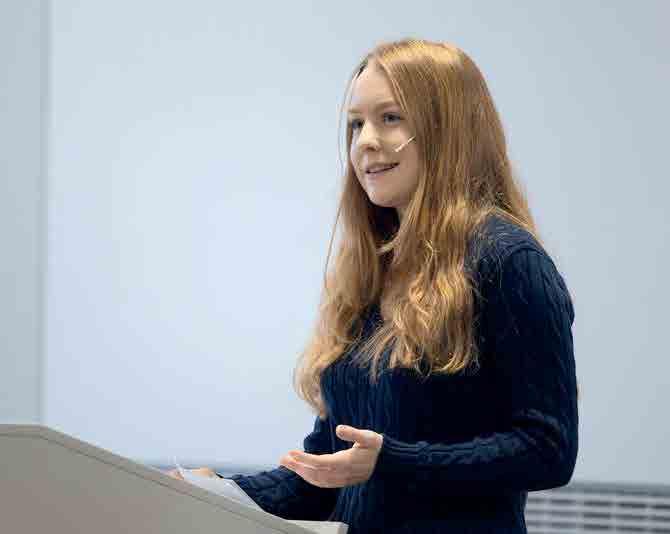
The University of St. Gallen has a longstanding and highly active student body, which is a unique feature of our University. The student organisation oikos was established in 1987 and later spun-off oikos International that now has 48 chapters across 20 countries and over 1,000 active members.
Currently, our University has a large variety of student organisations that focus on different aspects of sustainability, including sustainable finance, social entrepreneurship, education, and many more. The ECOnnect platform for sustainability-oriented student associations and the Student Union collaborate closely on embedding sustainability throughout student activities. HSG supports and encourages student engagement and co-curricular learning.
ECOnnect: Facilitating Transformative Action Among Sustainability-Oriented Student Associations

In March 2022, HSG alumnus and co-founder of the HSG Vegan Club
Raffael Wohlgensinger was awarded
‘HSG Founder of the Year’ at the START Global Summit. The pioneering idea for his start-up Formo – to use precision fermentation to substantially reduce CO2 emissions in cheese production – was shaped during his co-curricular engagement at the HSG Vegan Club. This is an impressive example of how activities of the HSG student associations drive sustainability integration.
Within this environment, the studentdriven community platform ECOnnect aims to facilitate sustainability action, exchange, and knowledge transfer between sustainability-minded students and associations at the University of St. Gallen. To date, ECOnnect has 16 member organisations (cf. Appendix, p. 41). The platform also co-creates events on a broad range of topics. Among these events are thematic workshops (e.g., about sustainable consumption), skill development sessions (e.g., about project management), and networking events. Through all these activities, ECOnnect aims to empower students to foster transformative action at HSG and beyond.
The ECOnnect x SHSG Challenge, a cooperation of ECOnnect and the HSG Student Union, was created with the goal of encouraging sustainable action on campus by challenging student associations to propose one concrete idea for a project and supporting its implementation with funding of 1,500 CHF and regular coaching sessions. In 2021, a collaboration between two student associations, oikos St. Gallen and START Hack, won this challenge by promoting a new framework that supports sustainable events inside and outside HSG.
STUDENT ENGAGEMENT
Student Union
The Student Union of the University of St. Gallen (SHSG) is a subentity of the University and the official representative body of all students’ interests. As of the academic year 2022/23, the board of the student union established the department and respective board position of ‘sustainability’. With this addition to the existing scope of duties, the student union aims to further strengthen sustainability-related projects and interests on a university-wide level and thereby complementing the various clubs’ efforts holistically. Being involved in a variety of projects interconnecting students, faculty, and the public, the Student Union enables projects to have a lasting impact on and off campus and can hence contribute to the University reaching its set goal of net zero by 2030.
Irina Kopatz, SHSG President 2022/23, during the Infoday Women*@HSG
34 Teaching
Video Student engagement for sustainability
Students Co-Creating Sustainability Curricula
In autumn 2021, Dr. Jost Hamschmidt, and the HSG student management consultancy Student Impact, collaboratively launched a new seminar course at undergraduate level: ‘Be the Change – Discovering Consulting and Sustainability’. Following a contemporary teaching approach, this action-learning course is co-organised and co-taught by students and based on co-creation and collaborative leadership methods. Creating a learning community of students, guest speakers, and course facilitators allows transformative learning processes to take place, leading to a deep understanding of
business practices for sustainability. As part of this course, students build consulting teams and tackle real-life business challenges of mission-driven companies. They are supported by input sessions and peer coaching from experienced Student Impact members. In addition, guest speaker from the HSG alumni community with a background in sustainability consulting or impact entrepreneurship reflect on consulting practices in companies like McKinsey, Systemiq, Bain, BCG, or B-Lab, and support students in solving their case challenges. In sum, the students acquire vital skills in areas
such as project management, market research, and storylining, as well as an understanding of how to develop high-performance teams. Feedback from both students and partner companies is highly encouraging. As one guest speaker put it: “This concept hits the nerve of the currently needed didactics”. In fact, students perceive the seminar as a highly productive learning journey that allows them to experience how change agents can make a real difference. The course will be replicated in other contexts, such as finance and leadership.
Impactful Student Projects as Outcomes of the Curriculum




As part of a course dealing with sustainable venture ideas, students of the Master's programme in General Management developed entrepreneurial solutions for the social and environmental spheres. In the 2022 edition, the outcomes included an advent calendar that presents energy-saving tips for flat-sharing communities, and a board game about energy issues that targets secondary schools.
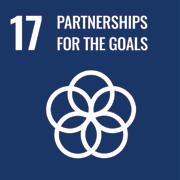

During the SIMagination Challenge, an integral part of the Master’s in Strategy & International Management programme, students are in charge of planning, initiating, advancing, and reflecting upon a challenging initiative which aims to have a positive and sustainable social impact on society.
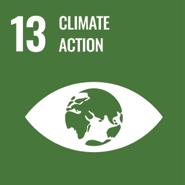
Students of the Master’s in Business Innovation programme have developed a workshop format for pupils on how the Internet of Things can be used for sustainability purposes. After running a successful prototype, a grant application was submitted to raise funding for the implementation of the workshop format.
As part of an undergraduate capstone project, several student groups were tasked with developing ideas how to tackle societal challenges in Switzerland through multistakeholder social innovation processes. Their insights and outcomes were valuable contributions to emerging project ideas by the Competence Center for Social Innovation (CSI-HSG).
35
Appendix Teaching Chapter
List of Selected Programmes which Embed Sustainability in their Curriculum
Various HSG study programmes integrate sustainability into their curriculum. In the following, a selection of those programmes is presented. More information on how they integrate sustainability can be found on their respective websites.
Contextual Studies (KX)
Contextual Studies form one of the most important and unique distinguishing features of the University of St. Gallen. It is a core element of all our degree programmes at HSG and aims to educate responsible leaders, who are not only capable of making sound decisions and managing resources effectively but are also equipped with the critical skills as well as cultural and ethical awareness necessary to make a positive impact in their communities and the future of society.
The courses on the Contextual Studies programme are divided in eight areas of concentration (Society, Responsibility, Culture, Law, History, Creativity, Media, and Technology) from which Bachelor's and Master's students choose courses up to 24 ECTS and 18 ECTS respectively. All areas of concentration view sustainability through different lenses and explore a variety of topics that relate to social, economic and environmentally sustainable goals.
Bachelor's Level
– Major in International Affairs (BIA)
– Major in Business Administration (BBA)
Master's Level
– Master in Management, Organization Studies and Cultural Theory (MOK)
– Master in International Affairs and Governance (MIA)
Master in General Management (MGM)
– Master in Strategy and International Management (SIM)
– Master in Marketing Management (MiMM)
– Master in Banking and Finance (MBF)
– CEMS Master in International Management (CEMS MiM)
– Certificate Programme in Managing Climate Solutions (MaCS)
PhD Level
– Doctoral Programme in International Affairs and Political Economy (DIA)
Doctoral Programme in Management (PMA)
– Doctoral Programme in Organisation Studies and Cultural Theory (DOK)
Executive Education
Full-Time Programmes
embaX (HSG and ETH)
– Executive MBA
– International Executive MBA
MBA
Diploma of Advanced Studies (DAS)
– Insurance Management
Certificate of Advanced Studies (CAS)
– Governing Energy Transitions
– Hochschuldidaktik
– Management of Recycling Companies
Management of Utility Companies
– Renewable Energy Management (REM-HSG)
– Schule leiten als System
Smart Mobility Management
– Sustainable Aviation Management
– Women Back to Business
Other Courses and Modules
– Aiming Higher – Career Development for Female Medical Residents
– Aiming Higher – Women’s Leadership Programme
– Certificate Course on ESG and Sustainable Finance
– Compliance Management Day
– Erfolgreich durch Diversity & Inclusion
Fit for Sustainable Finance
– HSG Highlights
– Intensivworkshop Nachhaltigkeit (starting 2023)
Nachhaltigkeit (ESG) für Kontrollfunktionen
Public Entrepreneurship Academy
– Regenerative Leadership
– Sustainability Management for Business Excellence
Selection of SustainabilityRelated Courses and Modules in 2021/22
Courses at all levels of education integrate sustainability topics. A selection of courses in 2021 and 2022 is presented below. We have grouped them into two categories: First, courses that deal with sustainability as a core topic and second, courses that deal with sustainability as one topic amongst others. Please note that not all courses have taken place in both years/all semesters.
Courses that Deal with Sustainability as a Core Topic
Assessment Level
Contextual Studies
– History: Racism – A Short History (Ramirez, Jesse)
– History: Von der Französischen Revolution bis zu ‘Me too‘ – Geschlechtergeschichte der europäischen Moderne (Marti, Sibylle) – Philosophy: Einführung ins Philosophieren – Ethik der digitalen Gesellschaft (Horn, Anita)
– Philosophy: Einführung ins Philosophieren – Was heisst, ethisch zu leben? (Telios, Thomas)
– Philosophy: Frauenrechte im Liberalismus (Festl, Michael)
– Psychology: Diskriminierung, Kategorisierung und Intergruppenverhalten (Villiger, Daniel)
– Psychology: Gender und Diversität (Nentwich, Julia)
– Psychology: Gender, Work and Well-Being (Chowdhury, Nilima Laura)
– Psychology: Klima und Verhaltensänderung (Nentwich, Julia)
– Psychology: Klimapsychologie – Transformation und Blockaden (Heydenreich, Anna-Katrin)
– Psychology: Kooperation, Partizipation und Nachhaltige Entwicklung (Heydenreich, Anna-Katrin)
– Psychology: Psychische Gesundheit in Organisationen (Platano, Giacomo)
– Psychology: Stress und Gesundheit (Laukamm, Mark)
– Sociology: Natur, Umwelt und Gesellschaft (Stücklin, Nicholas)
–
–
–
–
–
–
–
–
–
36 Teaching
Bachelor’s Level
Core Study Programmes
– Grundlagen des Diversity Management (BBA | Jent, Nils & Sciuchetti, Gian Carlo)
– International Diversity Management – What works? (BBA | Sander, Gudrun)
– Nachhaltigkeitsmanagement und -marketing (BBA | Loock, Moritz & Belz, Frank-Martin)
– Strategic Management of Utility Companies (BBA | Opitz, Christian & Schilling, Ivo)
– Stress und Resilienz in Hochleistungskontexten (BBA | Hesse, Frederik)
– Climate and Income Differences (BEcon | Boppart, Timo)
– Ökonomie des Glücks (BEcon | Kolmar, Martin)
– Development Economics (BIA | Hodler, Roland)
Global Health Governance (BIA | Eckl, Julian)
Global Water Governance (BIA | Boanada Fuchs, Vanessa)
– Poverty Alleviation (BIA | Zurlinden, Noémie)
– Spring Project: Internationale Klimapolitik (BIA | Dingwerth, Klaus)
– Ungleichheit und Umverteilung (BIA | Sachs, Dominik)
Vergleichende regionale Integration (BIA | Lehmkuhl, Dirk)
– Integrationsleistung Banking Governance (BLE | Reiser, Nina & Sutter Rüdisser, Michèle)
Contextual Studies
– Creativity: Orte der Vielfalt – Gender & Diversity im öffentlichen Raum (Schambach, Gabriele)
Cultures: 3xC – Coca, Cacao and Coffee in Colombia's Projects for Sustainability and Peace (Boanada Fuchs, Vanessa)
Cultures: Ethics of Soil, Farming, and Consumption (Dikovic, Jovana)
– Cultures: Power, Politics, and Democracy – Who Runs the World? (Grisaffi, Thomas)
Cultures: Toxic Country. Italy and Environmental Emergencies (Luisetti, Federico)
– History: All Men are Created Equal – Histories of Inequality in the United States (Enzerink, Suzanne)
– History: Cherchez la femme – Frauen an der HSG (Binswanger, Christa & Lambrecht, Karen)
– History: Die Grenzen des Wachstums im 20. und 21. Jahrhundert (Rossfeld, Roman)
Law: Managing Compliance and Organizational Ethics (Varges, Gabe Shawn)
– Open Area: Moderne Ethik und Film (Tasis, Theofanis)
– Responsibility: ‘Can There Be a Democratic Capitalism? Forms of Critique for a Capitalism of the Future’ (Telios, Thomas)
– Responsibility: All you can fish? Ein Unternehmensplanspiel zwischen Profitmaximierung und Nachhaltigkeit (Lorch, Alexander & Hajduk, Thomas)
– Responsibility: Auf dem Weg zu einer Kreislaufwirtschaft – Bedingungen, Möglichkeiten und Grenzen (Wäger, Patrick & Widmer, Rolf)
– Responsibility: Be the Change – Discovering
Consulting and Sustainability (Hamschmidt, Jost)
Responsibility: Becoming an Agent of Transformation – The Art and Science of Enacting Integral Transformation (Schieffer, Alexander & Mani, Rama)
Responsibility: Einführung sind die Wirtschaftsund Unternehmensethik (Booms, Martin)
– Responsibility: Green New Deal for Europe (Riedel, Rafal)
Responsibility: India Study Tour – Society and ‘Social Business’ in India (Rollier, Paul & Moser, Roger)
– Responsibility: Konsum, Verantwortung, Nachhaltigkeit (Wagner, Bernd)
Responsibility: Kultur – Ein Kernbegriff der Wirtschaftsethik (Rauen, Verena)
– Responsibility: Mensch, Arbeit, Ethik (Wagner, Bernd)
Responsibility: Moral und Kommerz im Sport (Schank, Christoph)
– Responsibility: Moralizing the Environment (Dikovic, Jovana)
Responsibility: Pathways Towards a Sustainable Food System (Bereuther, Tabea)
– Responsibility: Social Acceptance of Sustainable Energy Infrastructures (Batel, Susana)
– Responsibility: Soziales Engagement in Praxis und Theorie (Klöckner, Anna-Katharina)
– Responsibility: The Power of Games – How Simulation Games Can Foster Sustainability Transitions (Kubli, Merla & Gerber, Andreas)
– Responsibility: Unternehmensverantwortung in komplexen Umwelten (Schank, Christoph) – Responsibility: Whistleblowing im Fokus des Integrity und Compliance Management (Rauen, Verena)
– Responsibility: White Collar Crime – Wirtschaftskriminalität im Fokus der Wirtschaftsethik (Rauen, Verena)
– Responsibilty: Corporate Responsibility In SubSaharan Africa – Health Care, Technology & Human Rights (Ngosso, Thierry & Wodajo, Kebene Kejela)
– Responsibilty: Ethik und Ökologie – Was schulden wir der Natur? (Booms, Martin)
– Skills: Erfolgreiches Konfliktmanagement im Beruf unter Berücksichtigung von Gender und Diversity (Spülbeck, Susanne)
– Skills: Führung lernen - Praxisübung in Gender & Diversity (Spülbeck, Susanne)
– Skills: Social Business Prototyping – Von der Idee zum Projekt (von Hünerbein, Severin)
– Society: Ability Management – Das Integrations/ Inklusionsdilemma von Menschen mit Behinderung in Gesellschaft und Wirtschaft (Dietsche, Regula & Jent, Nils)
Society: Increasing Racial and Ethnic Equity in Switzerland (Sander, Gudrun & Pierce, Christian)
– Society: Plurale Ökonomik. Reisen in alternative Wirtschaftssysteme (Metelmann, Jörg) – Society: Sexing the Brain – Populäre und wissenschaftliche Debatten zu Körper und Geschlecht (Binswanger, Christa)
– Society: We are Family – Familiale Lebens-, Careund Arbeitsformen (Binswanger, Christa)
– Technologies: Afrocentric Perspectives on Human Rights and Justice in the Cyberspace (Wodajo, Kebene Kejela)
– Technologies: Digital Business Ethics – Managing the Ethical Challenges of Modern Information Technologies (Busch, Thorsten)
– Technologies: Digital Games – Business, Culture, Ethics (Busch, Thorsten)
Master’s Level
Core Study Programmes
– Integrated Reporting und Corporate Communication (MACFin | Berndt, Thomas & Will, Markus)
– Clean Energy Finance and Investment (MBF | Wüstenhagen, Rolf)
– Climate Finance (MBF | Nerlinger, Martin)
– Ethics of Financial Services (MBF | Krause, Florian) – Impact Investing (MBF | Kölbel, Julian)
– Sustainable Investing Challenge (MBF | Nerlinger, Martin)
– Effektive Nachhaltigkeit – Durch Innovation zum Unternehmenserfolg (MBI | Viglino-Caviezel, Gianina)
– FPV: Circular Economy – Optimierung im Supply Chain Management (MBI | Grimm, Jörg)
– IC: Responsible Innovation Lab (MBI | Busch, Thorsten)
– Managing Adversity in Crises (MBI | Siren, Charlotta) – Managing Adversity in Crises: Special Focus on COVID-19 (MBI | Siren, Charlotta)
– Sustainable Innovation through Human-centered Design (MBI | Uebernickel, Falk)
– Corporate Social Responsibility in Theorie und Praxis (MOK | Krause, Florian & Sindermann, Dana)
– Design Thinking Applied I: Industry Case Studies for Responsible and Sustainable Innovation (MOK | Siren, Charlotta; Klaas, Michael & Uebernickel, Falk)
– Organisation and Digital Activism (MOK | Schneider, Tanja)
– Beyond Homo Oeconomicus (MEcon | Kolmar, Martin) – Environmental Economics – Climate change (MEcon | Bonev, Petyo & Keuschnigg, Christian)
– When Distribution Matters: Inequality, Mobility, Poverty, and Welfare (MEcon | Piacquadio, Paolo)
– Grand Challenge: Advanced Entrepreneurship: Tackling Grand Challenges with New Technologies (MGM | Grichnik, Dietmar)
– Grand Challenge: Corporate Sustainability Management (MGM | Walls, Judith & Stroehle, Judith)
– Grand Challenge: Der Beitrag von Unternehmen zur Überwindung von (ökonomischer) Ungleichheit und sozialer Separation (MGM | Böhm, Stephan A.)
–
–
–
–
–
–
–
–
–
–
–
–
–
–
37
Grand Challenge: Future of Mobility (MGM | Ambos, Björn)
Grand Challenge: Nachhaltige Start-Ups (MGM | Stähler, Patrick)
– Grand Challenge: Wozu das Ganze? Purposeorientiertes Management (MGM | Erk, Christian)
Managerial Impact Project: Sustainability (MGM | Loock, Moritz)
– Asia Compact: Sustainability in Singapore and Southeast Asia (MUG | Walls, Judith)
– Corporate Sustainability Management (MUG | Walls, Judith)
– Management von Diversität und Inklusion (MUG | Böhm, Stephan A.)
Managing Collaborative Innovation for Net-Zero (MUG| Zobel, Ann-Kristin)
– Praxisprojekt Nachhaltigkeitsmanagement I (MUG | Loock, Moritz)
Consultancy Project: A Hub for Digital Literacy at the NEC in Bucarest (MIA | Lehmkuhl, Dirk)
– Consultancy Project: Climate Friendly European Travel (MIA | Hampl, Nina & Wüstenhagen, Rolf)
Consultancy Project: Finding Feasible Energy and Climate Solutions (MIA | Thaler, Philipp)
– Consultancy Project: Resolving the Western Sahara Conflict? (MIA | Davis, James W. & Heusgen, Christoph)
– Consultancy Project: Sustainability Consulting in an Evolving ESG Landscape (MIA | Thaler, Philipp)
Energy and Climate Governance (MIA | Rinscheid, Adrian) – Energy transition and foreign policy (MIA | Thaler, Philipp)
Ethnic politics and economic development in Africa (MIA | Schaudt, Paul)
– Failed States (MIA | Hodler, Roland)
– Global Environmental Politics (MIA | Hofmann, Benjamin)
– Political Economy of Development on African States (MIA | Opalo, Ken)
– The Impact of Human Rights Norms on Business (MIA | Boanada-Fuchs, Vanessa)
– The Political Economy of the Car (MIA | Rinscheid, Adrian)
– The UN Sustainable Development Goals from a Legal Perspective (MIA | Egli, Patricia)
– Clean Energy Marketing (MiMM | Wüstenhagen, Rolf)
– Future of Brand Management (MiMM | Reinecke, Sven)
– Board Governance: Targeting ESG dimensions in view of the Board of Directors (MLE | Sutter-Rüdisser, Michele) – Climate Change Law (MIL | Young, Margaret)
– Corporate Social Responsibility (MIL | Choudhury, Barnali)
– International Environment Law (MIL | Proelss, Alexander)
– Business Model Innovation (SIM | Frankenberger, Karolin)
Exploring the Sustainable Development Goals as Opportunities for Innovation (SIM | Zobel, Ann-Kristin)
– The SIMagination Challenge (SIM | Aschari, Omid)
Aktuelle Themen der Wirtschaftsdidaktik (Teaching Diploma | Dilger, Bernadette & Siegel, Stefan T.)
– Future Learning in the new Square (Teaching Diploma | Seufert, Sabine)
Climate Solutions 101 (MaCS | Kubli, Merla & Wüstenhagen, Rolf)
– Multidisciplinary Perspectives on Climate Solutions (MaCS | Kubli, Merla & Wüstenhagen, Rolf)
No funny business? Leadership soft skills for a digital, diverse, and dispersed age (Elective | Gloor, Jamie)
Start-up creation in practice (Elective | Stroe, Silvia)
– Business Ethics in Turbulent Times (CEMS | Wettstein, Florian)
Climate Change Course and Model UNFCCC (CEMS | Rinscheid, Adrian & Vuichard, Pascal)
– Global Citizenship Seminar (CEMS | Wittmer, Andreas & Kohler, Marc)
Managing the SDGs (SIGMA Global Virtual Course) (CEMS | Wüstenhagen, Rolf)
– Sustainability and Corporate Strategy: Meeting the Climate and Biodiversity Challenges (CEMS Block Seminar) (CEMS | Walls, Judith)
Contextual Studies
Creativity: Ecologies of organization and entrepreneurship (Beyes, Timon & Steyaert, Chris)
– Creativity: Energy Transition – Pathways to Climate Justice (Wilson, Sheena & Loveless, Natalie)
Cultures: Deservingness - Debating Inequality and ‘Culture’ in times of Crisis (Tosic, Jelena)
– Cultures: Ethnographies of (Im)Mobility –Exploring Migration, Borders and Inequality in Europe and Beyond (Tosic, Jelena)
– Cultures: Figures of Un/Deservingness – Exploring Inequality through Research and Comic Art (Camagni, Giulio; Streinzer, Andreas & Tosic, Jelena)
Cultures: Islam, Gender and Sexuality (Dominguez Diaz, Marta)
– Cultures: Negotiating the Amazon – Nature, Constructed Environments, Trade and Population Movements (Boanada Fuchs, Vanessa)
– Cultures: New Development Challenges in Africa
– Change Management towards Sustainability in Development Cooperation (Koestler, Andreas & Lehmkuhl, Dirk)
– Cultures: Rethinking Society and Cultures in the Age of Climate Change (Luisetti, Federico)
Cultures: Toxic Country. Italy and Environmental Emergencies (Luisetti, Federico)
– History: ‘Frauen im Laufgitter‘ – Perspektiven auf 50 Jahre Frauenstimmrecht in der Schweiz (Lambrecht, Karen)
History: Energy Histories and Climate Futures (Turnbull, Thomas)
– History: Fight the Good Fight – Conflict Partnerships for a More Sustainable Economy (Gertschen, Alex)
– History: Imagineering – Wie eine nachhaltige
moderne Gesellschaft gemacht wird (Welzer, Harald)
– History: The Anthropocene – Critical Perspectives on a New Epoch of Humanity (Luisetti, Federico)
– Law: Modern Theories of Justice (Kolmar, Martin)
– Media: Representing the Climate Crisis (Enzerink, Suzanne)
– Media: Screening Climate Change – Knowledge Mobilization through Popular Media (Rudolph, Sophie)
– Responsibility: African Ethical Frameworks –Applications in Bioethics and Global Health (Atuire, Caesar)
– Responsibility: African Perspectives on Climate Change, Environment and the Right to Development (Ngosso, Thierry)
– Responsibility: Autonomie als ethische Kategorie –Von Kant zu Tesla (Gubelmann, Reto)
– Responsibility: Business and Human Rights – Legal, Managerial and Ethical Perspectives (Wettstein, Florian & Palombo, Dalia)
– Responsibility: Climate Change and the Psychology of Decision-Making (Gamma, Karoline)
– Responsibility: Comparing ‘Social Business‘ and Development Work in Emerging Markets – the Indian Case (Moser, Roger & Rollier, Paul)
– Responsibility: Corporate Responsibility in Sub-Saharan Africa – Poverty, Education and Human Rights (Ngosso, Thierry)
– Responsibility: Corporations, Finance and the World (Stephen, Sarah)
– Responsibility: Current Debates on Climate Change, Migration and Displacement (Nash, Sarah Louise)
– Responsibility: Die nachhaltigen Entwicklungsziele der UN-Agenda 2030 – die Welt und den Markt retten (Gertschen, Alex)
– Responsibility: Diversity Impacting Sustainability Sciuchetti, Gian Carlo & Spark, Birgit)
– Responsibility: Diversity in Teams and Organizations (Georgakakis, Dimitrios)
– Responsibility: Economics and Ethics (Kolmar, Martin)
– Responsibility: Energy Transition and Material Flows in a Net Zero Economy (Wäger, Patrick & Widmer, Rolf)
– Responsibility: Ethik und Wurzeln des Kapitalismus (Höver, Hendrik & Oermann, Nils Ole)
– Responsibility: Finance and Society (Stephen, Sarah)
– Responsibility: Food Politics and the Limits of Markets (Schneider, Tanja)
– Responsibility: From Political CSR to Business Tyranny (Scholz, Markus)
– Responsibility: Governing Finance for Tackling Climate Change (Egli, Florian & Stünzi, Anna)
– Responsibility: Inclusive Leadership: Wie führt man Teams in der Zukunft? (Keller, Nora & Hartmann, Ines)
– Responsibility: Managing Humanitarian Action in the Age of Data and Pandemics (Daccord, Yves)
– Responsibility: Overcoming Carbon Lock-In –Towards Climate-Friendly International Travel (Stauch, Alexander)
–
–
–
–
–
–
–
–
–
–
–
–
–
–
–
–
–
–
–
–
38 Teaching
Responsibility: Positive Organizational Scholarship (Leicht-Deobald, Ulrich)
– Responsibility: Postwachstumsgesellschaften (Metelmann, Jörg & Rumberg, Michael)
Responsibility: Social Acceptance of Sustainability Innovations (Kubli, Merla & Reuter, Emmanuelle)
– Responsibility: Technologische Innovation und verantwortungsvolle Zusammenarbeit als Antwort auf die grossen Herausforderungen des frühen 21. Jahrhunderts (Krautzberger, Marc)
– Responsibility: The Global Environment. Critical Perspectives on Socio-Ecological Futures (Luisetti, Federico)
– Responsibility: Ubuntu, Ethics and Human Rights (Henning, Christoph)
– Responsibility: Wirtschaft und Natur – Naturphilosophien und ökonomische Verantwortung (Henning, Christoph)
– Responsibility: Wirtschaftsethik des Digitalen –Philosophische Grundlagen (Seele, Peter)
Responsibilty: Biodiversity, Business and People (Weise, Florian & Walls, Judith)
– Responsibilty: Food Sovereignty and Food Justice in Africa-Justifications, Processes and Challenges (Tamerat, Tinsaye)
– Skills: Gender im Bewerbungsgespräch – OnlineInszenierungen (Binswanger, Christa & Schröter, Katarina)

Society: Arbeitsmarkt und Geschlecht – Kontroversen und Visionen zur Vereinbarkeit von Beruf und Familie in verschiedenen Lebensphasen (Sander, Gudrun & Binswanger, Christa)
– Society: Equality – A Conceptual Exploration (Böhm, Andreas & Frei, Christoph)
– Society: In Bewegung – Inszenierung und Durchquerung von Geschlechternormen in Kultur und Gesellschaft (Binswanger, Christa & Zimmermann, Andrea)
Society: Inequality (Wagschal, Uwe)
Society: Manche sind gleicher: Inklusion im Spannungsfeld von Ökonomie und Gleichstellung (Sander, Gudrun & Binswanger, Christa)
Society: The Philosophy and Economics of Inequality (Martinez, Isabel & Mildenberger, Carl David)
– Technologies: Energy Security in the 21st Century – Geopolitical Uncertainties and the Need for ‘Climate Action’ (Peters, Susanne)
PhD Level
– Social Acceptance of Climate Solutions in a Polarized World (DIA | Wüstenhagen, Rolf)
– Rethinking management education: Theories, practices, interventions in the Anthropocene (DOK | Steyaert, Chris)
– Ethics, Responsibility & Sustainability in Research and the PhD Journey (PMA | Bschir, Karim; Weibel, Antoinette & Walls, Judith)
– Research Seminar on Corporate Sustainability Strategy: Theories and Methods (PMA | Walls, Judith)
Executive Education Level
– Sustainability als Wettbewerbsvorteil (EMBA)
– Business Ethics (embaX)
– Social Impact Project (embaX)
Sustainability Integration Week (embaX)
Corporate Sustainability Strategy: Today’s Business (IEMBA)
– Open & Climate Innovation (IEMBA) – Corporate Strategy & Sustainability (MBA)
Corporate Sustainability Strategy: Today’s Business (MBA)
– Impact Investing & Social Intrapreneurship (MBA)
– Customer & Social Impact (Nachhaltigkeit) (CAS Customer Excellence and Behavioral Insurance)
– Neue Nachhaltigkeitsfonds in der Lebensversicherung (CAS Customer Excellence and Behavioral Insurance)
– Trends & Sustainability (Custom Programme)
– Nachhaltigkeit in der Versicherungswirtschaft: Entwicklung eines Frameworks (DAS Insurance Management)
– Soziale Sicherung und Soziale Gerechtigkeit: Haben wir auf Sand gebaut? (DAS Insurance Management)
– Transition zu einer klimaneutralen Wirtschaft: Rolle und Verantwortung der Assekuranz (DAS Insurance Management)
– Zahlungsbereitschaft für nachhaltige Versicherungsprodukte (DAS Insurance Management)
– Fostering Responsibility & Sustainability in Student Learning (HDZ Further Education Course)
– OER 101: Ein Crash Course zu Open Educational Resources (HDZ Further Education Course)
Courses that Deal with Sustainability as one Topic Amongst Others
Assessment Level
Core Study Programmes
– Betriebswirtschaftslehre A (Bieger, Thomas)
– Business Administration (Business Ethics and Financial Management) (Festl, Michael & Schäfer, Dirk)
– Introduction to Constitutional Law and Public International Law (Egli, Patricia)
– Principles of Microeconomics/Grundlagen der Mikroökonomik (Kolmar, Martin)
–
–
–
–
–
–
–
–
–
–
39
Contextual Studies
– History: Immigration, Flight, Expulsion – A History of Migration, 1650–2000 (King-Savic, Sandra)
– History: Krankheiten und Seuchen in der Menschheitsgeschichte (Biehler, Birgit Ursula)
Integrationsprojekt / Integrative Seminar (Bieger, Thomas)
– Sociology: Sociology of Migration (Elliker, Florian)
Bachelor’s Level
Core Study Programmes
– Beschaffungsmanagement: Grundzüge des Einkaufs (BBA | Hofmann, Erik)
– Capstone Project: Operations and Innovation Management (BBA | Palmié, Maximilian)
– Corporate Finance (BBA | Schmid, Markus)
– Insurance Management (BBA | Eling, Martin)
– Leadership und Human Resource Management (BBA | Bruch, Heike & Fürstenberg, Nils)
– Smart Mobility Marketing (BBA | Tomczak, Torsten & Herrmann, Andreas)
Strategic Foresight (BBA | Carleton, Tammy & Cockayne, William)
– The Psychology of Entrepreneurship (BBA | Hatak, Isabella)
Tourism Systems – Analysis and Sustainable Management (BBA | Laesser, Christian)
– Microeconomics 2 (BEcon | Bühler, Stefan)
– European Governance/Regieren in Europa (BIA | Lehmkuhl, Dirk)
Corporate Governance (BLE | Sutter-Rüdisser, Michele)
– Wirtschaftspolitik (BLE | Hoffmann, Magnus)
Public Economics (BEcon | Hodler, Roland)
– Gesellschaftsrecht I & II (BLaw | Bertschinger, Urs)
– Öffentliches Recht – Grundrechte (BLaw | Egli, Patricia)
Verwaltungsrecht: Grundlagen und öffentliches Wirtschaftsrecht (BLaw | Schindler, Benjamin & Hettich, Peter)
Contextual Studies
– Creativity: My Favourite Thing – Craft and the Creative Economy (Steyaert, Chris & Schulz, Florian)
Cultures: Fussball – kulturelle Standpunkte in Spanien und Lateinamerika (Sanchez, Yvette)
– History: Geschichte der Zukunft – Visionen, Szenarien, Modelle (Buschauer, Regine) – History: Narratives of American Decline (Enzerink, Suzanne)
– History: Urbanization, Migration and Mobility in Southern Africa (Kesselring, Rita)
– Open Area: Positive Futures – Hoffnungs- und Purpose-Werkstatt (Krafft, Andreas)
– Open Area: Transformatik – Grundlagen einer neuen Lehre des Wandels (Metelmann, Jörg & Müller, Björn)
– Responsibility: Verantwortung der Daten
(Münker, Stefan)
Responsibility: Verantwortung im 21. Jahrhundert – Lernpsychologie meets Design Thinking (Lehner, Marion)
– Society: Bringt Arbeitswelt 4.0 eine (weitere) Humanisierung der Arbeit? (Hoffmann, Bettina)
Society: Smart Cities and Urban Innovation (Boanada Fuchs, Anthony)
– Society: Social Citizenship and Politics of Inequality (Tarkhanova, Oleksandra)
Society: Sociology of Violence (Metreveli, Tornike)
Master’s Level
Core Study Programmes
– Financial Reporting (MACFin | Dinh, Tami)
International Group Accounting (MACFin | Dinh, Tami)
– Management Accounting (MACFin | Mitterlechner, Matthias & Möller, Klaus)
Selected Topics in Accounting (MACFin | Dinh, Tami & Stenzel, Arthur)
– Asia Compact – Private Equity (MBF | Morkötter, Stefan)
Corporate Finance (MBF | Schmid, Markus)
Insurance Operations (MBF | Eling, Martin)
– Research Seminar Finance (MBF | Ammann, Manuel & Nerlinger, Martin)
Consultancy Project: Forward-looking foreign policy (MIA | Stünzi, Anna)
– Experts and Democratic Politics (MIA | Bertsou, Eri)
International Politics and Market Economy (MIA | Davis, James W. & Evenett, Simon)
– Populism and Foreign Policy (MIA | Frahm, Ole & Lehmkuhl, Dirk)
Business Innovation I: Geschäftsmodelle entwickeln (MBI | Gassmann, Oliver)
– Innovationsmanagement für Smart Cities (MBI | Palmié, Maximilian)
Nachhaltige Verkehrssysteme (MBI | Stölzle, Wolfgang)
– Venturing in Emerging Trends: Entrepreneurship and COVID-19 (MBI | Siren, Charlotta)
Transcultural Management (MOK | Sanchez, Yvette)
– Corporate Governance (MGM | Scheef, Christine)
– Finance and Management Accounting (MGM | Mitterlechner, Matthias & Möller, Klaus)
– Grand Challenge: Impact and Welfare Consequences of Insurance (MGM | Biener, Christian)
Leadership (MGM | Bruch, Heike)
Managerial Impact Project: Corporate Entrepreneurship (MGM | Scheef, Christine)
– Unternehmensführung in KMU (MGM | Fueglistaller, Urs & Fust, Alexander)
Corporate Entrepreneurship (MUG | Hatak, Isabella)
– Management und Ethik (MUG | Erk, Christian)
Finanzmarktrecht (MLaw | Bertschinger, Urs)
Robotik, KI und Legal Tech (MLaw | Wildhaber, Isabelle & Lohmann, Melinda)
– Strategic Leadership (SIM | Bruch, Heike)
– Aviation Management Asia Compact (CEMS | Wittmer, Andreas)
– Aviation Systems – Management of the Aviation Value Chain (CEMS | Wittmer, Andreas)
– LWJ Recht und Ethik – Medienrecht und ethische Implikationen (Wirtschaftsjournalismus | Schwaibold, Matthias)
– China’s Political Economy: Growth, Opportunity and Sustainability (Elective | Casas Klett, Tomas)
Contextual Studies
– Law: Violence, Crime and the Law – Britain, the Commonwealth and Beyond (Koch, Insa)
– Media: Big Data, Artificial Intelligence and the Algorithmic Society (Barassi, Veronica)
– Open Area: Kreative Zerstörung – Unternehmertum und Transformation (Landfester, Ulrike & Metelman, Jörg)
– Open Area: SIGMA GVS: Responsible Digital Transformation (Barassi, Veronica)
– Responsibility: Unconscious Bias – Was beeinflusst unsere Entscheidungen und Wahrnehmung? (Hartmann, Ines & van Dellen, Bianca)
– Technologies: Algorithmic Cultures (Beverungen, Armin)
– Technologies: The Economic and Social Impact of Artificial Intelligence (Meckel, Miriam & Steinacker, Léa)
PhD Level
– Empirical Corporate Finance (PIF | Schmid, Markus)
– Transcultural Workspaces (DOK | Sanchez, Yvette)
Executive Education Level
– Business Model Innovation (embaX)
– Macroeconomics for Executives (embaX)
– Entrepreneurship & Leadership (CAS Smart Mobility Management)
– Ökonomie (EMBA)
– Strategische Innovation (EMBA)
– Global business environment (MBA)
– Leadership and organizational behaviour (MBA)
– Principles & Tools for Innovation: Design Thinking, Lean Startup (MBA)
– Study Mission Singapore (MBA)
– The Corporate Athlete: Swiss Alps Bootcamp (MBA)
–
–
–
–
–
–
–
–
–
–
–
–
–
–
–
–
–
–
–
–
–
–
–
–
40 Teaching
List of Student Organisations that are Part of ECOnnect
– Oikos St. Gallen
– Student Impact
Social Business Club
– Change Hub
– Sustainable Investment Club
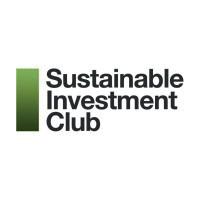
– Safe Space

Youth Engagement – Ignite
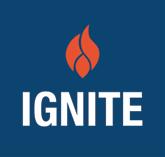


– SHSG
Pieces
ConnectING
Rock Your Life!
– AIESEC
– Unigay – Africa Association

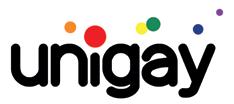
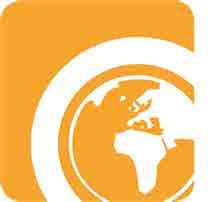
St. Gallen Symposium

List of Events Hosted by ECOnnect

Spring Semester 2021
25.02.2021: ECOnnect Get-Together

(Presentation of all ECOnnect associations)
– 01.04.2021: One Planet Leadership (Workshop in collaboration with Ignite)
31.05.2021: Handover and Self-Reflection (Workshop in collaboration with oikos)

Autumn Semester 2021
28.09.2021: ECOnnect Get-Together
(Presentation of all ECOnnect associations)
– 12.10.2021: Let’s talk impact – Positive Impact Rating (Workshop in collaboration with Anna Kurth)
– 19.10.2021: Purpose-driven fundraising for sustainable projects (Workshop in collaboration with Dr. Andreas Böhm and Copalana)

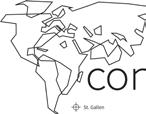
16.11.2021: Climate Neutrality (Workshop in collaboration with southpole)
– 25. & 30.11.2021: Project Management (Workshop in collaboration with Student Impact and Focus Sustainability)

– 01.12.2021: ECOnnect Challenge (Jury pitch of all handed-in projects)

Spring Semester 2022
– 22.02.2022: Kick-off Impact Collab (Kick-off event with the Impact Collab Community; definition of most impactful projects)
01.03.2022: ECOnnect Get-Together
(Presentation of all ECOnnect associations)
– 08.03.2022: Sustainable Leadership (Workshop in collaboration with Clementine Robert)
17.03.2022: Next Step? Impact Career! (Panel discussion with Planted, EY Carbon, and Farmy)
and Black@HSG)
25.04.2022: Paving a path to impact: The theory of change (Workshop in collaboration with WWF)



– 26.04.2022: Impact Collab Event (Get-Together)
–
26.09.2022: Next Step? Consulting for Impact! (Panel discussion with PwC, Systemiq, and EY)

–
06.10.2022: Cultivating inner capacities to drive sustainable futures (Workshop in collaboration with Dr. Rachel Brooks and Severin von Hünerbein)
25.10.2022: Consuming for impact. What can we do? (Impact Collab workshop in collaboration with Prof. Johanna Gollnhofer and Ben Kiss)
–
30.11.2022: Sustainability and climate exchange (Exchange with Prof. Moritz Loock and Dr. Tabea Bereuther)
STUDENT ENGAGEMENT
41
–
–
–
–
–
–
–
–
–
–
–
–
– 29.03.2022: Student action for diversity and inclusion @ HSG (Workshop in collaboration with HSG Diversity & Inclusion, Unigay, Safe Space, –
Autumn Semester 2022
–
– 27.09.2022: ECOnnect Get-Together (Presentation of all ECOnnect associations)
– 08.11.2022: Handover and Continuity (Workshop in collaboration with Focus Sustainability)
Student Impact and oikos won the International Green Gown Award 2021 As part of the Green Gown Award 2021, oikos was rewarded in the category 'Student Engagement'. The judges were ‘blown away by the extent of student engagement and leadership from a truly ground-up student sustainability programme.’ The work of Student Impact was recognised in the category 'Next Generation Learning & Skills', being specifically lauded by the jury for the ‘longevity and lasting impact of the project experience on students.’ https://hsg-student-podcast.captivate.fm/
“Research on sustainability is crucial for addressing the societal and corporate challenges facing our world, and as a leading business university, we want to actively contribute to these debates.”
Prof. Thomas Zellweger, Vice President Research & Faculty
Research
Goal
Support the development of sustainability expertise among faculty and build a sustainability research community.
Key achievements
New hires associated with the topic of sustainability to strengthen sustainability expertise; among them, experts in sustainable governance, sustainable finance, and social innovation and entrepreneurship.
Launch of the first local spin-off of the Impact Scholar Community with events throughout the years, such as an academic poster session on sustainability with almost 40 posters

More than 130 peer-reviewed publications related to sustainability in 2021 and 2022, as well as dedicated awards and around 780,000 CHF of Basic Research Fund (Grundlagenforschungsfonds/GFF) and 2,720,000 CHF of Swiss National Science Foundation (SNSF) support awarded during 2021/22 for sustainability research projects.
This chapter addresses PRME Principle 4: Research.
For an overview of all PRME principles, please see page 22.
43
Overview of Research on Sustainability
To reach the goal of developing sustainability excellence among HSG faculty, several processes are in place:
– During 2022, HSG embarked on a number of new faculty hires around the topic of sustainability to strengthen its sustainability expertise. All new full and associate professors at HSG are welcomed by the Delegate’s team for R&S and introduced to our sustainability activities. Further, the team offered workshops on sustainability in research and teaching for mid-career researchers, PhDs, and assistant professors.
– HSG subscribed to several data providers that offer Environmental, Social and Governance (ESG) data packages, such as S&P Global ESG scores (previously Trucost), Reprisk, Bloomberg ESG, and Thomson Refinitiv ESG. The University also offers support to researchers who wish to use these databases.
– Funding and dedicated awards are granted to faculty to promote high quality sustainability research projects.
– The HSG Ethics Committee advises researchers at HSG on the ethical and legal aspects of research projects.
– HSG is a member of local and global research networks. For example, in 2022, HSG became an institutional member of the Alliance for Research on Corporate Sustainability (ARCS) – a global partnership of top academic institutions working on sustainability research in management. Such memberships provide excellent data access and networking opportunities.
Several initiatives and processes have been established to connect faculty interested in sustainability, and foster exchange among the research community as well as with the non-academic world. These activities include:

– HSG faculty organised various events, conferences, and seminars to promote dialogue and foster connection to the world of practice. HSG scholars also participated in a broad range of high-class local and global academic conferences dedicated to sustainability.
– In summer 2022, the President's Board facilitated a six-month process called the HSG Collegium – a pilot initiative for an interdisciplinary and transdisciplinary research forum on social cohesion with a special focus on social sustainability.
– Various research projects were conducted in close collaboration with public and private practitioners to live up to HSG’s motto ‘From insight to impact’. A list of selected research projects is shown in the Appendix on pages 54–55.
Many HSG faculty conduct research on topics related to responsibility and sustainability. Besides dedicated institutes that focus on sustainability research, more than half of HSG’s institutes and centres are addressing aspects of the SDGs from different perspectives.
44 Research
HSG Impact Award
HSG research projects that have a clearly recognisable impact on society are acknowledged with the HSG Impact Award. Applications from all HSG research disciplines are considered and assessed by a jury consisting of practitioners and University members.

HSG Impact Awards 2021
Staying on Top of the Crisis by Charlotta Sirén, Michael Hudecheck, Joakim Vincent and Dietmar Grichnik: Taking the Covid pandemic as a case study, this project tackled the problem that businesses and policymakers lack accurate and up-to-date information during a crisis.
HSG Impact Awards 2022

Monitoring Consumption Switzerland by Martin Brown and Matthias Fengler: Acknowledging the economic importance of consumption by private households, the researchers developed a tool that provides detailed weekly data on consumption expenditure in Switzerland thus allowing real-time assessments of the economic situation.

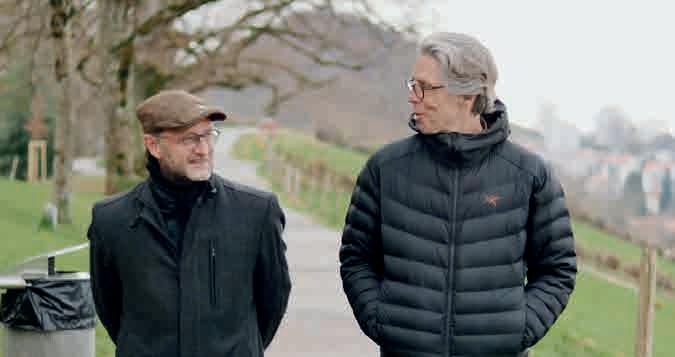
Portfolio model for sustainable investments by Sebastian Utz: Investigating sustainable investments, the researcher developed a portfolio model that optimises risk, return, and sustainability impact. This model helps to identify sustainability opportunities in investments and redirects capital towards sustainability challenges.
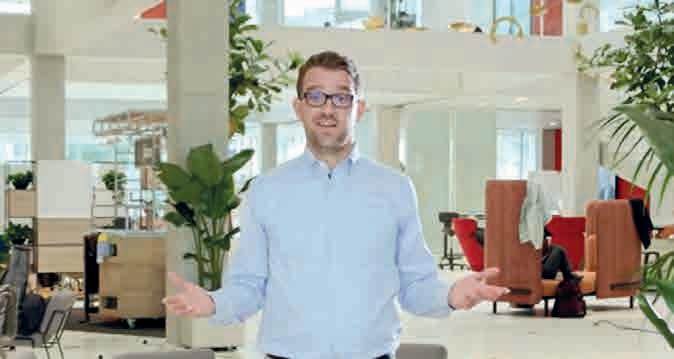
Ethics of the COVID-19 pandemic by Thomas Beschorner and Martin Kolmar: Focusing on the social and ethical dimensions of the Covid pandemic, the researchers published a series of articles in leading public media in the German-speaking world that stimulated social debate and shaped political discussion.
Life Design by Sebastian Kernbach, Martin Eppler and Sabrina Bresciani: This project investigated the impact of the St. Gallen Life Design approach for individuals, organisations, and society with regard to the development of psychological capital, which is composed of self-efficacy, hope, optimism, and resilience.
The Future of Work by Heike Bruch, Nils Fürstenberg and Frederik Hesse: During the Covid pandemic, home office, virtual collaboration, and digital communication tools increased in importance. The researchers investigated how companies can ensure the long-term health and performance of employees.

45
Sustainability Research Projects
Our faculty conducts research on a wide range of topics that address various SDGs from different perspectives. In 2021/2022 around 3.5 mio. CHF was awarded to research projects designed to help tackle current and future ecological and social challenges.
In 2021, the Project Funding of the Basic Research Fund (GFF) granted a total of approximately CHF 490,000 to five sustainability-related projects. In 2022, two projects related to sustainability were funded, accounting for approximately CHF 290,000. Furthermore, in 2021/2022, the Swiss National Science Foundation (SNSF) awarded around 2,720,000 CHF funding for sustainability-related projects, while the total volume of ongoing SNF projects amounted around 4,840,000 CHF.
In the following, an exemplary selection of HSG research projects are presented. A more comprehensive list of research projects can be found in the Appendix on pages 55 ff.
Selected Research Projects Associated with SDG 16: Peace, Justice and Strong Institutions

Peacekeeping and People: Spatially Disaggregated Data on the Infrastructure of People-Centred Peace-Building in UN Peacekeeping Operations in Sub-Saharan Africa (Hannah Smidt)
This project, which is funded by Folke Bernadotte Academy, evaluates when and how people-centred peacebuilding contributes to pro-peace shifts in people’s perceptions and attitudes. The project uses two novel cross-national datasets focusing on Sub-Saharan African countries.
Sustainable Tax Behaviour and Reporting (Peter Hongler, Thomas Berndt, Olha Honko, Alexander Sigg)
Collaborating with the European Business Tax Forum, this project contributes to the discussion on how to include
tax-related information in sustainability reporting. As there are currently many heterogenous standards and approaches to doing so, the project aims to differentiate between more and less relevant approaches, thus increasing transparency in the field of reporting.
Selected Research Projects Associated with SDG 12: Responsible Consumption and

Production
Laboratory for Circular Economy (LACE) (Karolin Frankenberger, Fabian Takacs)
As part of Swiss National Research Project 73 (Sustainable Economy), LACE focused on interdisciplinary research to show under which economic, legal, political, ecological, and technical conditions a circular economy can be both ecologically beneficial and economically profitable. The project was conducted in collaboration with other Swiss universities, the EMPA, and various project partners and successfully completed in December 2022.
CircuBat – Swiss Circular Economy Model for Automotive Lithium
Batteries (Merla Kubli, Juliane Seika)
The Innosuisse flagship project CircuBAT aims to create a circular business model for the production, application, and recycling of lithiumion batteries used for mobility purposes. Within subproject 7 ‘Sustainable business model’, the HSG researchers develop a system dynamics model where circular strategies can be tested virtually. Together with the results from the other more technical subprojects, this enables developing competitive second use applications and improving the eco-balance of electric mobility.
46 Research
Selected Research Projects Associated With SDG 7 (Affordable
and Clean Energy) and SDG 13 (Climate Action)
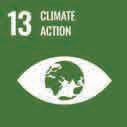

Social Acceptance of a Green Deal for Ukraine – the Role of Community Participation (Nadiya Kostyuchenko, Katharina Reidl, Rolf Wüstenhagen)
Within the context of a rising interest in Green Deals – public investment initiatives to accelerate climate change mitigation – the researchers are exploring subsequent impacts on the energy security of countries highly dependent on imports of non-renewable energies. Using both quantitative and qualitative data, this project aims to investigate factors driving social acceptance of Green Deal policy packages in Ukraine on a national and regional level.
Swiss Energy Governance – Political, Economic and Legal Challenges and Opportunities in the Energy Transition (Peter Hettich, Anna Broughel, Rolf Wüstenhagen, Adrian Rinscheid, Martin Föhse, Benjamin Hofmann, David Kolcava, Philipp Thaler)
This open access book, enabled by Innosuisse funding, consolidates the findings of an energy-related interdisciplinary research project jointly conducted by several Swiss universities. These results provide an integrated legal, political and economic perspective on Swiss energy governance including guidelines for state and non-state actors to manage the energy transition in Switzerland and beyond.
Selected Research Projects Associated with SDG 5: Gender Equality

Transitioning to Gender Equality (Christa
Binswanger)
This collaborative research project dealt with areas in which changes regarding gender equality on a global scale are needed. In particular, the project addressed transversal questions about the definition of gender and gender equality, the questioning of binary notions causing inequalities, and the development of intersectional and transdisciplinary gender perspectives leading to improved gender diversity. The results were published in a SNF-funded open access book that is co-edited together with Andrea Zimmermann from the University of Basel.
Overcoming Gender Stereotypes in New Venture Board Networks (Joakim Vincent, Dietmar Grichnik, Caroline Kaufmann, Anna Leuenberger)
This project, funded by the SNF, aims to improve our knowledge of the costs and benefits associated with gender diversity in new venture board interlocks backed by venture capital. Within a Swiss-European context, the researchers investigate the mechanisms of female board appointments as well as its implications for female elite network participation and performance of technology startups.
Selected
Research Projects Associated with SDG 15: Life on Land

Self-Supervised Learning for Earth Observation: Leveraging a Wealth of Multi-Modal Data (Damian Borth, Michael Mommert, Joelle Hanna, Linus Scheibenreif)
The goal of this SNF-funded project is to enable dataefficient Deep Learning for Earth observation applications. The idea is to reduce the amount of annotated data required to learn relevant tasks by combining concurrent data from different sensors or sources to guide the learning process. Using self-supervised learning, vast amounts of unannotated Earth observation will be leveraged to pretrain our models. The results from this project will enable a range of research opportunities and applications related to the monitoring of the Earth system and support a number of sustainability goals.
Unblocking the Flow of Biodiversity Data for Multi-Stakeholder Environmental Sustainability Management (Judith
Walls, Kerrigan Unter)
The Swiss Network for International Studies (SNIS) is funding a research project entitled ‘Unblocking the flow of biodiversity data for multi-stakeholder environmental sustainability management’. The collaborative project is being implemented by the universities of Lausanne, St. Gallen and Ghana and the Humboldt Institute in Colombia. The aim of this project is to understand biodiversity data user needs across sectors, identify the reasons behind blockages to data flow and access, and help integrate mainstream biodiversity data into decision making and halt biodiversity loss.
47
Selection of New Hires in Sustainability Research



Since August 2021, Jamie Gloor has been Assistant Professor at the School of Management. As a social psychologist in a business school, her research applies mixed method, quantitative approaches to understand social and environmental sustainability issues related to leadership and equity, diversity & inclusion in organisations.
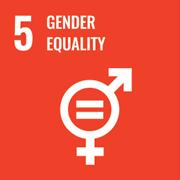



“Since January 2021, the Swiss National Science Foundation funds my team and me with a 1.2 million CHF grant. We are grateful for the energy, enthusiasm, and support for sustainability research and initiatives at HSG – it is truly a unique and inspiring place for early-career scholars like us to create positive insights and craft positive impacts on increasingly critical topics.”
Since August 2022, Judith Stroehle has been Assistant Professor of Sustainability Governance and is affiliated with the Institute for Accounting, Audit and Control (ACA-HSG), as well as the Institute for Economy and the Environment (IWÖ-HSG). Her research focuses on where and how measurement and accounting can help to facilitate more responsible business practices.
“I joined HSG because it is one of the best universities for business studies in the world. Together with the unparalleled energy and innovation power of our students and faculty, I believe that HSG has the potential to significantly contribute to solving many of the global sustainability crises.”
Since September 2022, Hannah Smidt has been Assistant Professor for Political Science with focus on International Organisation and Governance. Her research explores international contributions to building peace in war-torn countries. Most of her empirical work has a focus on African countries.
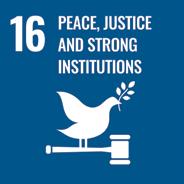
“I have joined HSG because it offers an excellent international research environment in a beautiful and family-friendly city.”

48 Research
Since August 2022, Julian Kölbel has been Assistant Professor of Sustainable Finance at the University of St. Gallen, School of Finance and the Center for Financial Services Innovation. He is also a research affiliate at MIT Sloan, a co-founder of the Aggregate Confusion Project, and a Swiss Finance Institute faculty member. His research covers the real-world impact of sustainable investing, analysis of environmental, social and governance (ESG) metrics, and investor preferences for sustainability.

Since August 2022, Vivianna Fang He has been Associate Professor for Social Entrepreneurship and Innovation at the School of Management. Vivianna is the founding director of the Institute for Responsible Innovation – an interdisciplinar y research centre focusing on innovative technologies and organisational forms for the social good. Her research centres around less hierarchical forms of organisation in innovation-related contexts, including self-managing teams, online communities, and decentralised autonomous organisations.
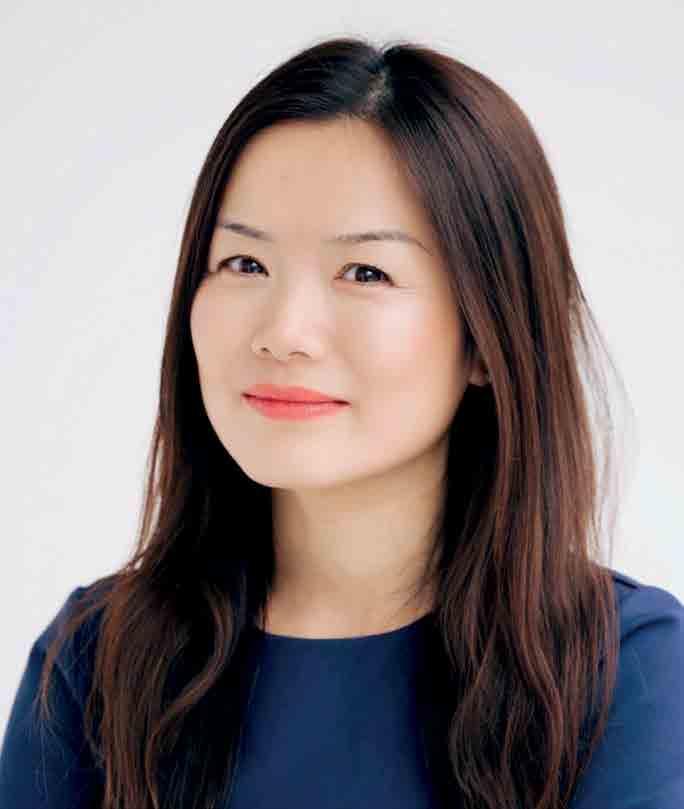
During the past year, preparatory work for establishing a new Institute for Responsible Innovation (IRI-HSG) has taken place. Launched in January 2023 by founding directors Prof. Vivanna Fang He and Prof. Charlotta Sirén, the IRI is a multidisciplinary platform dedicated to responsible innovation, social entrepreneurship, and addressing grand challenges.
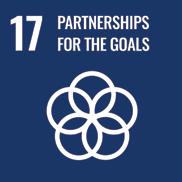




“I joined HSG for many good reasons. One was that the University decided to hire someone in sustainable finance, my area of expertise. Another important one was their motto ‘From insight to impact’, which I find really inspiring. I really do hope that our research here has an impact out there in the real world.”
49
“HSG attracted me with its internationally recognised excellence in research and teaching.”
Sustainability Research by Students
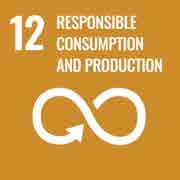


The University of St. Gallen helps young talents to create impactful research outcomes. HSG faculty are driving different initiatives to support students in their sustainability research and providing opportunities to be part of larger research projects. Overall, students show a high interest in writing their theses on sustainability-related topics.
STUDENT ENGAGEMENT
Examples of Student Research with Impactful Outcomes


In 2022, Prof. Andreas Wittmer and Prof. Judith Walls published an edited book on the topic of Sustainable Aviation. This volume builds on seven Master’s theses from HSG students that analysed the opportunities for a sustainable transformation of the aviation industry from a management perspective. One of these contributions is the outcome of the Master’s thesis by Juliette Kettler, who was recognised with the SAEE Student Award 2020 for her outstanding research.
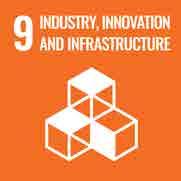
The HSG Next Generation initiative encourages young scientific talents to inform decision-makers in public policy, business and society by creating short and well-written executive summaries of top economic research. In 2021 and 2022, a total of 16 students from the two Master’s programmes in Economics and Quantitative Economics & Finance created a total of 20 summaries that often touch on sustainability-related topics. The project is supervised by Prof. Christian Keuschnigg, who also edits these articles periodically as a book.

As part of his PhD work, Tobias Fehr-Bosshard from the Competence Center for Social Innovation (CSI-HSG) has collaborated with oikos students since 2021 to establish ChangeHub at SQUARE. In a participatory, action-oriented approach, the team explores how to foster student influence and impact in the HSG ecosystem. ChangeHub aims to create visibility about the broad range of pre-existing activities at HSG, facilitate collaboration, and initiate new strategic projects. ChangeHub successfully established the use of reusable cups at HSG, and the collaboration recently launched an Ecosystem Navigator.
Dr. Helmut Leibinger won the NZZ Prize in 2021 for his thesis on the Carbon Circular Economy. Supervised by Prof. Moritz Look, he wrote his final thesis for the EMBA on how the Carbon Circular Economy will help us to meet the goals of the Paris Agreement by developing a Network Business Incubator.
50 Research
Examples of Events that Support Students in Their Research
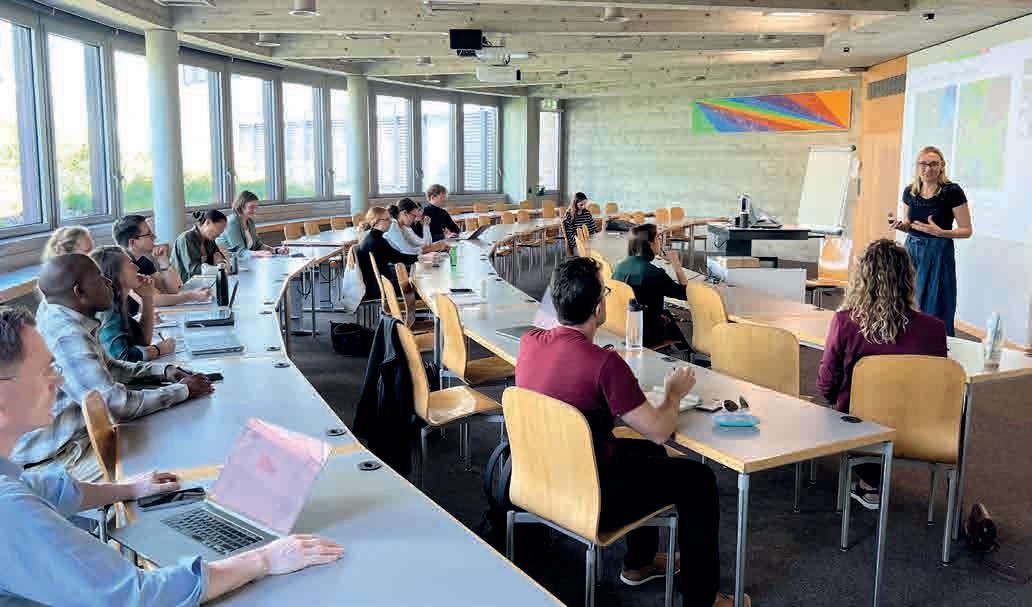


During the oikos Sustainability Week 2022, the Delegate for Responsibility & Sustainability and her team organised a Sustainability Thesis Slam. At this event, 14 institutes, centres and chairs presented their research on sustainability to around 30 students interested in writing their theses about a sustainability-related topic. Students showed great interest in the event and valued the opportunity to connect with faculty.
In August 2022, Jamie Gloor, Assistant Professor for Diversity and Leadership Science, organised an academic research communication competition in the SQUARE following the University of Queensland’s 3MT approach. Eight PhD students participated by presenting their research results in three minutes in a language appropriate to a nonspecialist audience. The competition was won by Nina Zachlod, who presented her project Looking at entrepreneurs from the sky: Using satellite data to support slums in India.
51
In 2021, PhD students and postdocs from different institutes launched the world’s first local spin-off of the Impact Scholar Community by the Organization and the Natural Environment (ONE) division of the Academy of Management (AOM), to support and connect HSG scholars conducting SDG-related research. Throughout the year, the community organises and


Building a Sustainability Research Community
co-hosts several events, including a series of Impact Research Exchanges hosted by different member chairs to strengthen exchange and dialogue across HSG.
As part of the oikos Sustainability Week 2022, the R&S Delegate’s team co-organised an academic poster session to present current research
projects in the field of sustainability. During the session, 37 posters were presented, and around 60 scholars and students joined the event and learned about the diversity of research projects around sustainability at HSG. The posters covered a broad range of topics from different disciplines, such as accounting, strategy, computer science, governance, law, and gender equality. Due to the positive feedback from all participants, the Delegate’s team decided to organise the poster session on a yearly basis.
In summer 2022, the President’s Board facilitated a six-month process called the HSG Collegium – a pilot initiative for an interdisciplinary and transdisciplinary research forum on social cohesion with a particular focus on social sustainability. The Delegate for R&S and Prof. Christa Binswanger (co-convenors), together with other key stakeholders within HSG, facilitated a comprehensive stakeholder dialogue on social sustainability with more than 50 University members. The goal was to define a research agenda and key components of social sustainability relevant to HSG.
One of HSG’s strengths is that faculty who are conducting sustainability-oriented research are spread across many institutes. The University of St. Gallen aims to strengthen exchange among these researchers to create a supportive community that promotes high-level research.
52 Research
Kick-off event of the HSG Impact Scholar Community at HSG
Guest comment in Neue Zürcher Zeitung (NZZ) by Prof. Johannes Binswanger and Prof. Paolo Piacquadio on the economic effects of climate change.
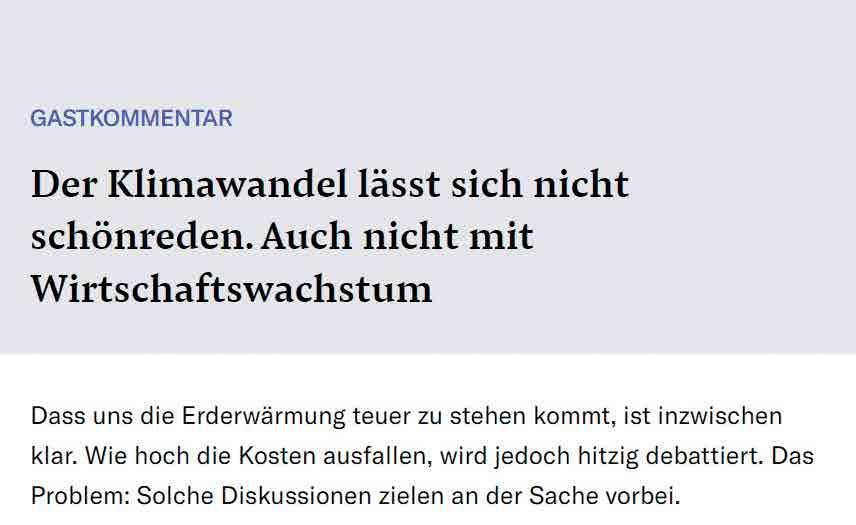
From Insight to Impact: Sustainability Research Outreach

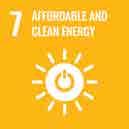




Scholars at the University of St. Gallen create impactful research, reaching out to and engaging with local and international communities. To transfer sustainability knowledge to the non-academic world, HSG faculty organise various conferences and events, communicate research outcomes in podcasts or videos and engage with the media. A selection of these activities is presented below.
Prof. Johanna Gollnhofer from the Institute for Marketing and Customer Insights publishes a LinkedIn newsletter on Green Marketing that presents monthly research insights into current topics in the field of sustainable consumer behaviour.
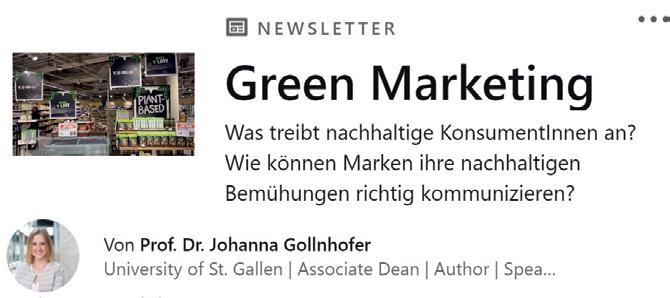
Prof. Andreas Herrmann, together with business experts, hosts the bi-weekly podcast Mobility Pioneers which discusses the most pressing topics for the future of mobility with high-level executives from industry, science and politics.
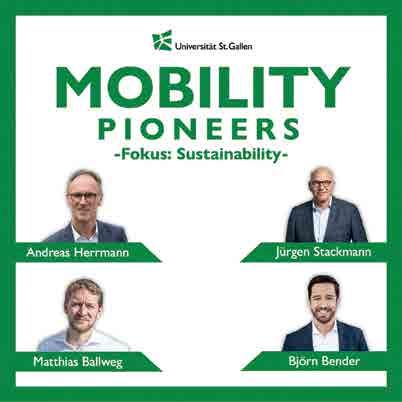
During the St. Gallen Symposium 2022, the directors of the Institute for Economy and the Environment, Prof. Judith Walls and Prof. Rolf Wüstenhagen, moderated two sessions on climate risks and the energy transition.

 Dr. Manali Kumar from the Institute of Political Science assessed the US’ track record on climate mitigation and Joe Biden’s climate summit on BBC News with Clive Myrie.
Dr. Manali Kumar from the Institute of Political Science assessed the US’ track record on climate mitigation and Joe Biden’s climate summit on BBC News with Clive Myrie.
53
Appendix Research Chapter
List of Sustainability-Related Research Institutes and Centres
Institutes/Centers that Work on Sustainability-Related Topics
– Institute for Business Ethics (IWE)
Institute for Economy and the Environment (IWOE)
– Center for Disability and Integration (CDI)
– Center for Health Care (CHC)
Center for Leadership and Values in Society (CLVS)
– Competence Center Circular Economy, Business Models & Sustainable Transformation (at IoMS)
Competence Center for African Research (CCAR, at IWE)
– Competence Center for Diversity and Inclusion (CCDI)
Competence Center for Energy Management (at ior/cf)
– Competence Center for Social Innovation (CSI)
– Competence Center Healthy Leadership (at I.FPM)
Department for Gender & Diversity (at SHSS)
– Sustainability Innovation Lab (at ITEM)
Further Institutes/Centres that Touch on Sustainability as Part of their Activities –
Institute of Accounting, Control and Auditing (ACA)
– Institute of Business Education and Educational Management (IWP)
– Institute of Computer Science (ICS)
– Institute for Educational Management and Technologies (IBB)
– Institute of Insurance Economics (I.VW)
Institute for Leadership and Human Resource Management (I.FPM)
– Institute of Management and Strategy (IoMS)
Institute for Marketing and Customer Insight (IMC)
– Institute for Mobility (IMO)
– Institute of Public Finance, Fiscal Law, and Law and Economics (IFF) – Institute of Political Science (IPW)
– Institute of Supply Chain Management (ISCM)
– Institute of Technology Management (ITEM)
Institute for Work and Employment Research (FAA)
– Research Institute for Organizational Psychology (OPSY)
Research Institute of Sociology (SfS)
School of Medicine (MED)
– Swiss Institute for Banking and Finance (s/bf)
– Swiss Institute for Empirical Economic Research (SEW)
Swiss Institute of Small Business and Entrepreneurship (KMU)
– Global Center for Entrepreneurship and Innovation (GCE&I)
Center for Aviation Competence (CFAC)
– Center for Entrepreneurship (CFE)
– Center for Financial Services Innovation (FSI)
Center for Governance and Culture in Europe (GCE)
– Center for Innovation (CFI)
– Center for Mobility (CFM)
Centro Latinoamericano-Suizo (CLS)
China Competence Center (CCC, at FIM)
– Competence Center for Corporate Governance (at FIM)
Department for British Cultures (at SHSS)
Department for Italian Culture and Society (at SHSS)
– Department for Technology Studies (at SHSS)
Department for Transcultural Studies (at SHSS)
– Department for Urban Studies (at SHSS)
List of Selected SustainabilityRelated Research Projects
GFF Funding Granted in 2021 & 2022
– ‘Because the sea is rising we will rise’ – Transnational agency and mediated resistance in sea-bound civil society organisations (Antje Scharenberg)
– Future Valley Pilot: Establishing a framework for the study of rural transport transitions in collaboration with the SBB Glarus lighthouse project (Paula Bialski)
– Governing the energy transition in Switzerland –an in-depth analysis of Swiss firms’ life and death from 1883 – 2020 (Anna Stünzi)
Lobbying in Disguise (Ulrich Matter)
– Reactance Effects of Visual Imagery in Sustainability Campaigns: An Experiment-based Contribution to Persuasion Research (Martin Eppler)
– The role of behavioural, cognitive and affective stakeholder trust in resolving the paradoxical tension between sustainability branding and perceived sustainability performance (Judith Walls)
– The socioeconomics of shared micro-mobility: An investigation of the potential of e-scooters to foster social mobility (Andreas Herrmann & Thomas Beschorner)
SNF Funding Granted in 2021 & 2022
SNF Projects
– Europe’s Un/Deserving: Moralizations of Inequality in Comparative Perspective (Jelena Tosic)
Overcoming Gender Stereotypes in New Venture Board Networks (Joakim Vincent)
– Self-Supervised Learning for Earth Observation: Leveraging a wealth of multi-modal data (Damian Borth)
– Sustainable Finance, Inequality, and Poverty (Ola Mahmoud)
– The role of agriculture for economic development: a macroeconomic perspective (Timo Boppart)
– The transmission of macroeconomic shocks and the housing market (Winfried Koeniger)
– Towards the viable supply chain: Managing targets across efficiency, resilience, and sustainability (Erik Hofmann)
Other SNF Grant Types
– Addressing Corporate Human Rights Impacts: the Responsible Stakeholder Model at the Intersection of Corporate Sustainability and Business and Human Rights (Florian Wettstein)
– Are frictions at labor market entry more severe in low-income countries? Evidence from job durations (Charles Gottlieb)
– Enforceable brand agreements: Exploring their role in the future of transnational private governance and in ongoing labour campaigns (Antonella Angelini)
– Global Governance Retooled: Worker-driven Initiatives in Private and Public-Private Regulation (Antonella Angelini)
– Informal Entrepreneurship and Poverty Alleviation (Nina Zachlod)
– Playing the Game relieves ‘More of the Same’? Leadership Diversity through Sport (Jamie Gloor)
–
–
–
–
–
–
–
–
–
–
–
–
–
–
–
–
–
–
–
–
54 Research
‘Reframing ‘Integration’: Building a new Paradigm of 'Integration’ based on the Perspective of those who Experienced Migration: A Case Study of Labor Migrants and Refugees from the former SFRY in Switzerland (Sandra King-Savic)
Social acceptance of a Green Deal for Ukraine – the role of community participation (Rolf Wüstenhagen, Nadiya Kostyuchenko)
– Swiss Energy Governance - Political, Economic and Legal Challenges and Opportunities in the Energy Transition (Peter Hettich)
– The Datafication of Health: Novel distributions and reconfigurations of expertise (Tanja Schneider)
Transitioning to Gender Equality (Christa Binswanger)
– (Un)doing Gender empirisch: Qualitative Forschung in der Kinderkrippe (Julia Nentwich)
‘Ye shall know them by their fruits’: A Mixed Methods Study on Corruption, Competitiveness, and Christianity in Europe and the Americas (Jason Garcia Portilla)
Selection of Further Ongoing and Completed Research Projects
–
A Network Approach to Measure ESG and its implications for ESG Investing (Enrico De Giorgi)
– Assessing the drivers of greenhouse gas emissions in car sharing: A conceptual and empirical approach (Andreas Herrmann)
BARMER Social Health @ work (Stephan Böhm)
– CircuBAT – Swiss Circular Economy Model for Automotive Lithium Batteries (Merla Kubli)
Designing Business Models for the Internet of Things (Thomas Friedli)
– Development of Mobility in Cities and Urban Quarters (Andreas Herrmann)
E-LAND – Integrated multi-vector management system for Energy islands (Merla Kubli, Beatrice Petrovich)
– Equal opportunities in Vocational Education and Training (Sabine Seufert)
– EVOLVE - Language as a tool for environmentally sustainable actions in developing countries: for the right to healthy food (Siegfried Handschuh)
Forum PgB7, Connecting the projects, mandate of the Think Tank Gender & Diversity (Christa Binswanger)
– Gender Intelligence Report (Gudrun Sander)
GOVPET - Governance in Vocational and Professional Education and Training (Patrick Emmenegger) –
IMEMP – Inequality: Measurement, Evolution, Mechanisms, and Policies (Paolo Piacquadio)
– In the shadows: Explaining the rise of fast-fashion sweatshop-based economies in Sao Paulo and Buenos Aires (Matías Dewey)
Inclusion Champions Switzerland (Stephan Böhm)
– INSIST – Inequality, debt, and crisis management (Paolo Piacquadio)
– Investigating Informal Entrepreneurship in Indian Slums with Satellite Data (Charlotta Sirén)
– LACE – Laboratory on Circular Economy – NRP
73 project (Karolin Frankenberger)
Leaders for Equality – Die Toolbox für Führungskräfte (Julia Nentwich, Gabriele Schambach, Nilima Chowdhury)
Legal Code (Simon Mayer, Clement Guitton)
Market Monitoring of Energy-Performance Contracting (Christian Opitz)
– Measuring Work-Life-Integration (Gudrun Sander)
MISTRAL – Multi-sectoral approaches to innovative skills training for renewable energy and social acceptance (Rolf Wüstenhagen)
– Peacekeeping and people: Spatially disaggregated data on the infrastructure of people-centred peacebuilding in UN peacekeeping operations in Sub-Saharan Africa, 1995–2020 (Hannah Smidt)
Pioneering Research Projects – Network of companies who are pioneers regarding sustainable HR practices (Heike Bruch)
– REFLEX – Registry of Firms' Life and Exit (Tina Freyburg, Anna Stünzi)
ReInvent – Enhanced steel recycling supported by a digital platform (Thomas Friedli)
– Rethinking the Social Pact while localizing SDG11: lessons learnt through migration processes in Latin America (Vanessa Boanada-Fuchs)
– Scaling Smart City Projects – from individual pilots towards a common strategy of industry emergence (Ann-Kristin Zobel)
SCESC – Swiss Circular Economy of Skills and Competences; Teilprojekt 2: individuelles Kompetenzportfolio (Bernadette Dilger)
Smart Cities and human rights: the cases of Chile and Switzerland (Isabel Ebert)
– Sustainable Multimodal Mobility in Toggenburg (Maximilian Palmié)
Sustainable Tax Behaviour and Reporting (Peter Hongler, Thomas Berndt)
– Sustainable Value Creation (Martin Nerlinger, Martin Hilb)
Sustaining Employee Health: ‘Resilienz und Hochleistung @ Hilti’ (Heike Bruch, Nils Fürstenberg, Frederik Hesse)
– SWEET EDGE - Enabling Decentralized renewable Generation in the Swiss cities, midlands, and the Alps (Rolf Wüstenhagen, Merla Kubli)
– Swiss Nutrition Atlas (Marc Linzmajer)
Symbolic Forms of Remedy for Corporate Human Rights Impacts (Jordi Vives)
– TaxFair – Make Taxation Fair (Paolo Piacquadio)
The Future Mobility Lab (Andreas Herrmann) – The Human Right to Health and Health Care and the Obligations of States and Firms in Sub-Saharan Africa (Thierry Ngosso)
The Rise of Emerging Powers: A Challenge to Norms of Differential Treatment for Developing Countries (Klaus Dingwerth, Julian Eckl, Vanessa Boanada-Fuchs, Simon Evenett)
– The sustainable consumer (Johanna Gollnhofer)
The Swiss Commodity Sector as a Matter-
of-Public-Concern: Inquiring Processes of Contestation, Justification and Change (Isabel Ebert)
– Tracking and Managing Economic and Social Impact of COVID-19 (Charlotta Sirén)
Unruly Natures (Federico Luisetti)
VALURED – Value Judgements and Redistribution Policies (Paolo Piacquadio)
– WISER – Web of Interoperable Digital Services for Knowledge on Decarbonisation Pathways (Simon Mayer)
List of Selected SustainabilityRelated Publications in 2021/22
In the following, a selection of peer-reviewed articles as well as books and book chapters on sustainabilityrelated topics is presented. A more comprehensive list of publications can be found here.
Publications in 2022
Peer-Reviewed Articles –
Bäro, A. | Toepler, F. | Meynhardt, T. | Velamuri, V.K. (2022): Participating in the sharing economy: The role of individual characteristics. Managerial and Decision Economics.
– Beer, S. | Braun, A. (2022): Market-Consistent Valuation of Natural Catastrophe Risk. Journal of Banking and Finance.
– Berg, F. | Kölbel, J.F. | Rigobon, R. (2022): Aggregate Confusion: The Divergence of ESG Ratings. Review of Finance.
– Bertini, M. | Buehler, S. | Halbheer, D. | Lehmann, D.R. (2022): Carbon Footprinting and Pricing Under Climate Concerns. Journal of Marketing.
– Bizet, R. | Bonev, P. | Lévêque, F. (2022): The effect of local monitoring on nuclear safety and compliance: Evidence from France. Journal of Environmental Economics and Management.
– Brzykcy, A. | Boehm, S. (2022): No such thing as a free ride: The impact of disability labels on relationship building at work. Human relations.
– Chatterjee, I. | Shepherd, D.A. | Wincent, J. (2022): Women’s entrepreneurship and well-being at the base of the pyramid. Journal of Business Venturing.
– Côté, E. | Đukan, M. | Pons-Seres de Brauwer, C. | Wüstenhagen, R. (2022) The price of actor diversity: Measuring project developers’ willingness to accept risks in renewable energy auctions. Energy Policy.
– Côté, E. | Salm, S. (2022) Risk-adjusted preferences of utility companies and institutional investors for battery storage and green hydrogen investment. Energy Policy.
– Di Salvatore, J. | Lundgren, M. | Oksamytna, K. | Smidt, H.M. (2022): Introducing the Peacekeeping Mandates (PEMA) Dataset. Journal of Conflict Resolution.
–
–
–
–
–
–
–
–
–
–
–
–
–
–
–
–
–
–
–
–
–
–
–
–
–
–
55
Di Salvo, P. (2022): Leaking black boxes: Whistleblowing and big tech invisibility. First Monday.
– Fink, M. | Gartner, J. | Harms, R. | Hatak, I. (2022): Ethical Orientation and Research Misconduct Among Business Researchers Under the Condition of Autonomy and Competition. Journal of Business Ethics.
Giermindl, L.A. | Strich, F. | Christ, O. | LeichtDeobald, U. | Redzepi, A. (2022): The dark sides of people analytics: reviewing the perils for organisations and employees. European Journal of Information Systems.
– Gloor, J. | Bajet Mestre, E. | Post, C. | Ruigrok, W. (2022): We Can’t Fight Climate Change Without Fighting for Gender Equity. Harvard Business Review.
– Gloor, J.L. | Cooper, C.D. | Bowes-Sperry, L. | Chawla, N. (2022): Risqué Business? Interpersonal Anxiety and Humor in the #MeToo Era. Journal of Applied Psychology.
– Guitton, C. | Tamò-Larrieux, A.| Mayer, S. (2022): Mapping the Issues of Automated Legal Systems: Why Worry About Automatically Processable Regulation? Artificial Intelligence and Law.
– Hain, L.I. | Kölbel, J.F. | Leippold, M. (2022): Let’s get physical: Comparing metrics of physical climate risk. Finance Research Letters.
He, V.F. | von Krogh, G. | Siren, C. (2022): Expertise diversity, informal leadership hierarchy, and team knowledge creation: A study of pharmaceutical research collaborations. Organization Studies.

Knauf, J. (2022): Can't buy me acceptance? Financial benefits for wind energy projects in Germany. Energy Policy.
– Koch, T.K. | Romero, P. | Stachl, C. (2022): Age and gender in language, emoji, and emoticon usage in instant messages. Computers in Human Behavior.
Kristal, A.S. | Nicks, L. | Gloor, J.L. | Hauser, O.P. (2022): Reducing discrimination against job seekers with and without employment gaps. Nature Human Behaviour.
Kubli, M. (2022): EV drivers’ willingness to accept smart charging: Measuring preferences of potential adopters. Transportation Research Part D: Transport and Environment.
Luisetti, F. (2022): Pluriversalism and the Ecological Regime of Accumulation. Nordia Geographical Publications.
Müller, A. | Wittmer, A. (2022): The choice between business travel and video conferencing after COVID-19 – Insights from a choice experiment among frequent travelers. Tourism Management.
– Nerlinger, M. | Utz, S. (2022): The impact of the Russia-Ukraine conflict on energy firms: A capital market perspective. Finance Research Letters.
Nißen, M. | Rüegger, D. | Stieger, M. | Flückiger, C. | Allemand, M. | von Wangenheim, F. | Kowatsch, T. (2022): The Effects of Health Care Chatbot
Personas With Different Social Roles on the Client-Chatbot Bond and Usage Intentions: Development of a Design Codebook and WebBased Study. Journal of Medical Internet Research.
Pietrulla, F. | Frankenberger, K. (2022): A research model for circular business models –Antecedents, moderators, and outcomes. Sustainable Futures. –
Pietrulla, F. (2022): Circular ecosystems: A review. Cleaner and Circular Bioeconomy
– Richter, M.A. | Hagenmaier, M. | Bandte, O. | Parida, V. | Wincent, J. (2022): Smart cities, urban mobility and autonomous vehicles: How different cities needs different sustainable investment strategies. Technological Forecasting and Social Change.
Richter, M. | Lang, N. | Hagenmaier, M. | Herrmann, A. | Johnson, M. D. (2022). Whose Disruptions are Winning the Autonomous Driving Race? California Management Review. – Risi, D. (2022): Business and Society Research
Drawing on Institutionalism: Integrating Normative and Descriptive Research on Values. Business & Society.
Risi, D. | Marti, E. (2022): Illuminating the Dark Side of Values: A Framework for Institutional Research. Journal of Management Inquiry. –
Risi, D. | Vigneau, L. | Bohn, S. | Wickert, C. (2022): Institutional theory-based research on corporate social responsibility: Bringing values back in. International Journal of Management Reviews.
– Scheibenreif, L. | Mommert, M. | Borth, D. (2022): Toward Global Estimation of GroundLevel NO2 Pollution With Deep Learning and Remote Sensing. IEEE Transactions on Geoscience and Remote Sensing.
– Schlieter, H. | Marsch, L.A. | Whitehouse, D. | Otto, L. | Londral, A.R. | Teepe, G.W. | Benedict, M. | Ollier, J. | Ulmer, T. | Gasser, N. | Ueltsch, S. | Wollschlaeger, B. | Kowatsch, T. (2022): Scale-up of Digital Innovations in Health Care: Expert Commentary on Enablers and Barriers. Journal of Medical Internet Research.
– Schloemer-Jarvis, A. | Bader, B. | Böhm, S.A. (2022): The role of human resource practices for including persons with disabilities in the workforce: a systematic literature review. The International Journal of Human Resource Management.
– Shepherd, D.A. | Parida, V. | Williams, T. | Wincent, J. (2022): Organizing the Exploitation of Vulnerable People: A Qualitative Assessment of Human Trafficking. Journal of Management.
– Steyaert, C. (2022): ‘If a (queer) revolt is
–
–
–
–
–
–
–
–
–
–
–
–
56 Research
to come’: Toward a sensuous pedagogy for dis/ orienting management learning. Management Learning.
– Steyaert, C. (2022): Queering Salzburg, perhaps? M@n@gement.
Stroehle, J.C. | Soonawalla, K. | Metzner, M. (2022): Through the looking glass: tying performance and materiality to corporate purpose. Journal of the British Academy.
Takacs, F. | Brunner, D. | Frankenberger, K. (2022): Barriers to a circular economy in small- and medium-sized enterprises and their integration in a sustainable strategic management framework. Journal of Cleaner Production.
Thaler, P. | Hofmann, B. (2022): The impossible energy trinity: Energy security, sustainability, and sovereignty in cross-border electricity systems. Political Geography.
Toetzke, M. | Stünzi, A. | Egli, F. (2022): Consistent and replicable estimation of bilateral climate finance. Nature Climate Change.
Vecchi, V. | Cusumano, N. | Casalini, F. (2022): Investigating the performance of PPP in major healthcare infrastructure projects: the role of policy, institutions, and contracts. Oxford Review of Economic Policy.
Vogel, J.F.A. | Barkhausen, M. | Pross, C.M. | Geissler, A. (2022): Defining minimum volume thresholds to increase quality of care: a new patient- oriented approach using mixed integer programming. The European Journal of Health Economics.
– Vuichard, P. | Broughel, A. | Wüstenhagen, R. | Tabi, A. | Knauf, J. (2022): Keep it local and bird-friendly: Exploring the social acceptance of wind energy in Switzerland, Estonia, and Ukraine. Energy Research & Social Science.
– Wickert, C. | Risi, D. | Tommaso, R. (2022): What a mature CSR team looks like. Harvard Business Review.
– Widmer, P. | Zurlinden, N. (2022): Ministers Engage in Favoritism Too. Journal of Public Economics.
Wodajo, K. (2022): Contested Space and SelfDetermination: The Dynamics of Ethiopia's Digital Space. Northeast African Studies.
– Wodako, K. (2022): Mapping (in)visibility and structural injustice in the digital space. Journal of Responsible Technology
– Wörner, A. | Tiefenbeck, V. | Wortmann, F. | Meeuw, A. | Ableitner, L. | Fleisch, E. | Azevedo, I. (2022): Bidding on a Peer-to-Peer Energy Market: An Exploratory Field Study. Information Systems Research.
Books
– Adams, R. | Grichnik, D. | Pundziene, A. | Volkmann, C. (Eds.) (2022). Artificiality and Sustainability in Entrepreneurship. FGF Studies in Small Business and Entrepreneurship. Springer.
– Casas i Klett, T. | Cozzi, G. (2022): Elite Quality Report 2022: Country Scores and Global Rankings. Seismo.
– Fellenz M.R. | Hoidn, S. | Brady, M. (Eds.) (2022): The Future of Management Education. Routledge.
– Kolmar, M. (2022): Principles of Microeconomics. Springer.
Hettich, P. | & Kachi, A. (Eds.) (2022): Swiss Energy Governance: Political, Economic and Legal Challenges and Opportunities in the Energy Transition. Springer. – Tošić, J. | Streinzer, A. (Eds). (2022): Ethnographies of Deservingness: Unpacking Ideologies of Distribution and Inequality. Berghahn.
– Vecchi, V. | Casalini, F. | Cusumano, N. (2022): Public-Private Collaborations for Long-Term Investments. Edward Elgar.
– Walls, J.L. | Wittmer, A. (Eds.) (2022): Sustainable Aviation: A Management Perspective. Springer.
Wettstein, F. (2022): Business and Human Rights. Cambridge University Press.
Book Chapters
Apicella, G. | De Giorgi, E.G. (2022): Gender Attitudes Toward Longevity and Retirement Planning: Theory and Evidence. In M. Corazza, C. Perna, C. Pizzi & M. Sibillo (Eds.): Mathematical and Statistical Methods for Actuarial Sciences and Finance – MAF 2022. Springer.
– Beschorner, T. (2022): Governanceethik. In M. Aßländer (Ed.), Handbuch Wirtschaftsethik. Metzler.
Beschorner, T. (2022): Kulturalistische Wirtschaftsethik. In M. Aßländer (Ed.): Handbuch Wirtschaftsethik. Metzler.
Beschorner, T. (2022): Stakeholderorientierter Ansatz. In M. Aßländer (Ed.): Handbuch Wirtschaftsethik. Metzler.
– Beschorner, T. | Fischli, R. (2022): Der Begriff der Freiheit im Kontext der Digitalisierung. Theoretische Überlegungen und praktische Hinweise. In M. Schmidt (Ed.): Kompendium Digitale Transformation. UVG.
Binswanger, C. (2022): Entanglements of affect and desire: A Palimpsestic Reading of Annie Ernaux’s A Girl’s Story. In O. Kasmani | M. Lüthjohann, S | Nikoleit & J.-B. Pettier (Eds.): Nothing Personal?! Essays on Affect, Gender and Queerness. b_books.
– Dingwerth, K. | Pattberg, P. (2022): Theorizing Global Governance. In J. Rüland & A. Carrapatoso (Eds.): Handbook on Regionalism and Global Governance. Edward Elgar.
– Duygan, M. | Kachi, A. | Oeri, F. | Oliveira T. | Rinscheid, A. (2022): A Survey of Stakeholders’ Views and Practices – Energy Policymaking in Switzerland. In P. Hettich & A. Kachi (Eds.): Swiss Energy Governance. Springer.
Grüner, A. (2022): Sustainable Investing in Emerging Markets. In D.K. Ngyuen (Ed.): Handbook of Banking and Finance in Emerging Markets. Edward Elgar Publishing.
Hirschi, C. (2022): Zur problematischen Vorbildfunktion der Klimakrise für die Corona-Krise. In Rudolf Augstein Stiftung (Ed.): Follow the science –aber wohin? Wissenschaft, Macht und Demokratie im Zeitalter der Krisen. Ch. Links.
Luisetti, F. (2022): Giuseppe Penone’s Earth Beings, Italy and the Ecological Imagination. In
D. Benvegnù & M. Gilebbi (Eds.): Ecocritical Theories and Practices. Vernon Press.
– Luisetti, F. (2022): Neoliberal natures and non-anthropocenic art. In P. Grillet | I. Josefina | S. Alonso Gómez & E. Rosauro (Eds.): NO Rhetoric(s). Versions and Subversions of Resistance in Contemporary GlobalArt. Diaphenes.
– Luisetti, F. (2022): The Neoliberal Virus. In V. Lemm & M. Vatter (Eds.): The Viral Politics of Covid-19: Nature, Home, and Planetary Health. Palgrave Macmillan.
– Luisetti, F. (2022): Unsustainable Art and the Zero Waste Economy. In A. López-Labourdette & V. Wagner (Eds.): Sobras espectrales. Gestiones estético-políticos de los residuos. Linkgua.
– Mascello, B. (2022): Women as a Game Changer in the Legal Industry: Relevance of Diversity and Inclusion. In K. Jacob, D. Schindler, R. Strathausen & B. Waltl (Eds.): Liquid Legal – Humanization and the Law. Springer.
– Meynhardt, T. (2022): Public Value. In R.A. List, H.K. Anheier & S. Toepler (Eds.): International Encyclopedia of Civil Society. Springer.
– Müller, A. | Walls, J.L. | Wittmer, A. (2022): Sustainable Aviation: An Introduction. In J.L. Walls & A. Wittmer (Eds.): Sustainable Aviation. Springer.
– Nerlinger, M. (2022): Enhancing the accuracy of firm valuation with multiples using carbon emissions. In Jurczenko, E. (Ed.): Climate Investing: New Strategies and Implementation Challenges. John Wiley & Sons.
– Opitz, C. (2022): Urban energy systems: Municipal utilities and the case of Switzerland. In: M. Finger and N. Yanar (Eds.): The Elgar companion to urban infrastructure governance. Innovation, concepts and cases. Edward Elgar Publishing.
– Rinscheid, A. | Udris, L. (2022): Referendum Campaigns in Swiss Energy Policy – A Comparative Analysis of Media Coverage and a Case Study of Media Influence on Voting Behavior. In P. Hettich & A. Kachi (Eds.): Swiss Energy Governance. Springer.
– Siegel, S.T. | Krummenauer-Grasser, A. | Stahl, C. (2022): Lehrbezogenes Wissensmanagement: Herausforderungen und Potenziale am Beispiel der Manuale des Projekts LeHet. In A. Hartinger, M. Dresel, E. Matthes, K. Peuschel, & U. Nett (Eds.): Lehrkräfteprofessionalität im Umgang mit Heterogenität: Theoretische Konzepte, Förderansätze, empirische Befunde. Waxmann.
– Stauch, A. | Müller, A. (2022): Technology
Assessment for Sustainable Aviation. In J.L. Walls & A. Wittmer (Eds.): Sustainable Aviation. Springer.
Valente, M.G. (2022): No Place for Women: Gaps and Challenges in Promoting Equality on Social Media. In E. Celeste, A. Heldt & C. Iglesias Keller (Eds.): Constitutionalising Social Media. Hart Publishing.
– Vives Gabriel, J. | Wettstein, F. (2022): ‘Business and Human Rights’ and the United Nations Sustainable Development Goals: Complementary or Conflicting Agendas? In: The Palgrave Handbook of Global Sustainability. Palgrave Macmillan.
–
–
–
–
–
–
–
–
–
–
–
–
–
–
–
–
–
57
Publications in 2021
Peer-Reviewed Articles
– Achtziger, A. | Glas, A. | Kenning, P. | Rudolph, T. (2021): Comparing the effects of financial incentives and implementation intentions on unhealthy snacking behavior in employees. Current Psychology.
– Alacevich, C. | Bonev, P. | Söderberg, M. (2021): Pro-environmental interventions and behavioral spillovers: Evidence from organic waste sorting in Sweden. Journal of Environmental Economics and Management.
– Alizadeh Afrouzi, O. (2021): Humanitarian behavior across high-/low-context cultures: a comparative analysis between Switzerland and Colombia. Journal of International Humanitarian Action.
Banholzer, N. | Feuerriegel, S. | Fleisch, E. | Bauer, G.F. | Kowatsch, T. (2022): Computer Mouse Movements as an Indicator of Work Stress: Longitudinal Observational Field Study. Journal of Medical Internet Research.
Bérubé, C. | Schachner, T. | Keller, R. | Fleisch, E. | Wangenheim, F. | Barata, F. | Kowatsch, T. (2021): Voice-Based Conversational Agents for the Prevention and Management of Chronic and Mental Health Conditions: Systematic Literature Review. Journal of Medical Internet Research.
– Beyes, T. | Steyaert, C. (2021): Unsettling bodies of knowledge: Walking as a pedagogy of affect. Management Learning.
– Boehm, S.A. | Schröder, H. | Bal, M. (2021): Age-Related Human Resource Management Policies and Practices: Antecedents, Outcomes, and Conceptualizations. Work, Aging and Retirement.
– Breitenstein, M. | Nguyen, D.K. | Walther, T. (2021): Environmental Hazards and Risk Management in the Financial Sector: A Systematic Literature Review. Journal of Economic Surveys.
– Calvão, F. | Mcdonald, C.E.A. | Bolay, M. (2021): Cobalt mining and the corporate outsourcing of responsibility in the Democratic Republic of Congo. The Extractive Industries and Society.
– Chatterjee, I. | Cornelissen, J. | Wincent, J. (2021): Social entrepreneurship and values work: The role of practices in shaping values and negotiating change. Journal of Business Venturing.
– Colas, M. | Findeisen, S. | Sachs, D. (2021): Optimal Need-Based Financial Aid. Journal of Political Economy.
– Constantino, S.M. | Pianta, S. | Rinscheid, A. | Frey, R. | Weber, E.U. (2021): The source is the message: The impact of institutional signals on climate change-related norm perceptions and behaviors. Climatic Change.
– Cousse, J. (2021): Still in love with solar energy? Installation size, affect, and the social acceptance of renewable energy technologies. Renewable and Sustainable Energy Reviews.
– Denisova-Schmidt, E. | Huber, M. | Leontyeva, E. | Solovyeva, A. (2021): Combining experimental evidence with machine learning to assess anti-
corruption educational campaigns among Russian university students. Empirical Economics.
Dreher, A. | Fuchs, A. | Hodler, R. | Parks, B.C. | Raschky, P.A. | Tierney, M.J. (2021): Is favoritism a threat to Chinese aid effectiveness? A subnational analysis of Chinese development projects. World Development.
– Duygan, M. | Kachi, A. | Oliveira, T.D. | Rinscheid, A. (2021): Introducing the Endowment-PracticeInstitutions (EPI) framework for studying agency in the institutional contestation of socio-technical regimes. Journal of Cleaner Production.
– Ebert, I.L. | Wildhaber, I. | Adams-Prassel, J. (2021): Big data in the workplace: Privacy Due Dilligence as a human rights-based approach to employee privacy protection. Big Data & Society.
– Elsner, A.M. (2021): After COVID-19: The Way We Die from Now On. Cambridge Quarterly of Healthcare Ethics.
– Enzerink, S.C. (2021). Black Atlantic Currents: Mati Diop’s Atlantique and the Field of Transnational American Studies. Journal of Transnational American Studies, 12(1).
– Fauser, D.V. | Utz, S. (2021): Risk Mitigation of Corporate Social Performance in US Class Action Lawsuits. Financial Analysts Journal.
Fernandes, J.M. | Lopes da Fonseca, M. | Won, M. (2021): Closing the Gender Gap in Legislative Debates: The Role of Gender Quotas. Political Behavior.
Fesenfeld, L.P. | Rinscheid, A. (2021): Emphasizing urgency of climate change is insufficient to increase policy support. One Earth.
Frankenberger, K. | Takacs, F. (2021): A Step Toward Making Your Company More Sustainable. Harvard Business Review.
– Gamma, K. | Mai, R. | Cometta, C. | Loock, M. (2021): Engaging customers in demand response programs: The role of reward and punishment in customer adoption in Switzerland. Energy Research & Social Science.
Georgakakis, D. | Greve, P. | Ruigrok, W. (2021): Differences that matter: hiring modes and demographic (dis)similarity in executive selection. The International Journal of Human Resource Management.
Gloor, J. L. (2021). Cheap talk? Follower sarcasm reduces leader overpay by increasing accountability. Journal of Experimental Social Psychology.
– Gloor, J. L. | Okimoto, T. G. | & King, E. B. (2021). ‘Maybe baby?’ The employment risk of potential parenthood. Journal of Applied Social Psychology
– Gloor, J. | Sander, G. | Meister, A. (2021): What to Do About Employees Who Consciously Exclude Women. Harvard Business Review.
– Görgen, M. | Jacob, A. | Nerlinger, M. (2021): Get Green or Die Trying? Carbon Risk Integration into Portfolio Management. The Journal of Portfolio Management.
– Gong, M. | Zhang, Z. | Jia, M. | Walls, J.L. (2021): Does having a critical mass of women on the board result in more corporate environmental actions? Evidence from China. Group & Organization Management.
– Hahn, T. | Howard-Grenville, J. | Lyon, T. | Russo, M. | Walls, J.L. (2021): Leadership forum on organizations and sustainability: Taking stock, looking forward. Organization & Environment.
– Hatak, I. | Chang, M. | Harms, R. | Wiklund, J. (2021): ADHD symptoms, entrepreneurial passion, and entrepreneurial performance. Small Business Economics.
– Hatak, I. | Zhou, H. (2021): Health as Human Capital in Entrepreneurship: Individual, Extension, and Substitution Effects on Entrepreneurial Success. Entrepreneurship Theory and Practice.
– Helbing, D. | Beschorner, T. | Frey, B. | Diekmann, A. | Hagendorff, T. | Seele, P. | Spiekermann-Hoff, S. | van den Hoven, J. | Zwitter, A. (2021): Triage 4.0: On Death Algorithms and Technological Selection. Is Today’s Data-Driven Medical System Still Compatible with the Constitution? Journal of European CME.
– Hodler, R. | Valsecchi, M. | Vesperoni, A. (2021): Ethnic geography: Measurement and evidence. Journal of Public Economics.
– Johansson, J. | Malmström, M. | Lahti, T. | Wincent, J. (2021): Oh, it’s complex to see women here, isn’t it and this seems to take all my attention! A repertory grid approach to capture venture capitalists cognitive structures when evaluating women entrepreneurs. Journal of Business Venturing Insights. – Johansson, J. | Malmström, M. | Wincent, J. (2021): Sustainable Investments in Responsible SMEs: That’s What’s Distinguish Government VCs from Private VCs. Journal of Risk and Financial Management. –
Kalogeraki, O. | Georgakakis, D. (2021): Friend or Foe? CEO gender, political ideology and gender-pay disparities in executive compensation. Long Range Planning.
– Karlsson, C. | Rickardsson, J. | Wincent, J. (2021): Diversity, innovation and entrepreneurship: where are we and where should we go in future studies? Small Business Economics.
– Kowatsch, T. | Schachner, T. | Harperink, S. | Barata, F. | Dittler, U. | Xiao, G. | Stanger, C. | Wangenheim, F. | Fleisch, E. | Oswald, H. | Möller, A. (2021): Conversational Agents as Mediating Social Actors in Chronic Disease Management Involving Healthcare Professionals, Patients, and Family Members: Intervention Design and Results from a Multi-site, Single-arm Feasibility Study. Journal of Medical Internet Research.
– Krause, F. | Beschorner, T. (2021): Algorithms, Decision-making, and the Human Outside the Code. Moral & Machines
– Kubli, M. | Canzi, P. (2021): Business strategies for flexibility aggregators to steer clear of being ‘too small to bid’. Renewable and Sustainable Energy Reviews.
– Kunze, F. | Böhm, S.A. | Bruch, H. (2021): It matters how old we feel in organizations: Testing a multilevel model of organizational subjective-age diversity on employee outcomes. Journal of Organizational Behavior.
–
–
–
–
–
–
–
–
58 Research
Leicht-Deobald, U. | Hüttermann, H. | Bruch, H. | Lawrence, B. (2021): Organizational Demographic Faultlines: Their Impact on Collective Organizational Identification, Firm Performance, and Firm Innovation. Journal of Management Studies.
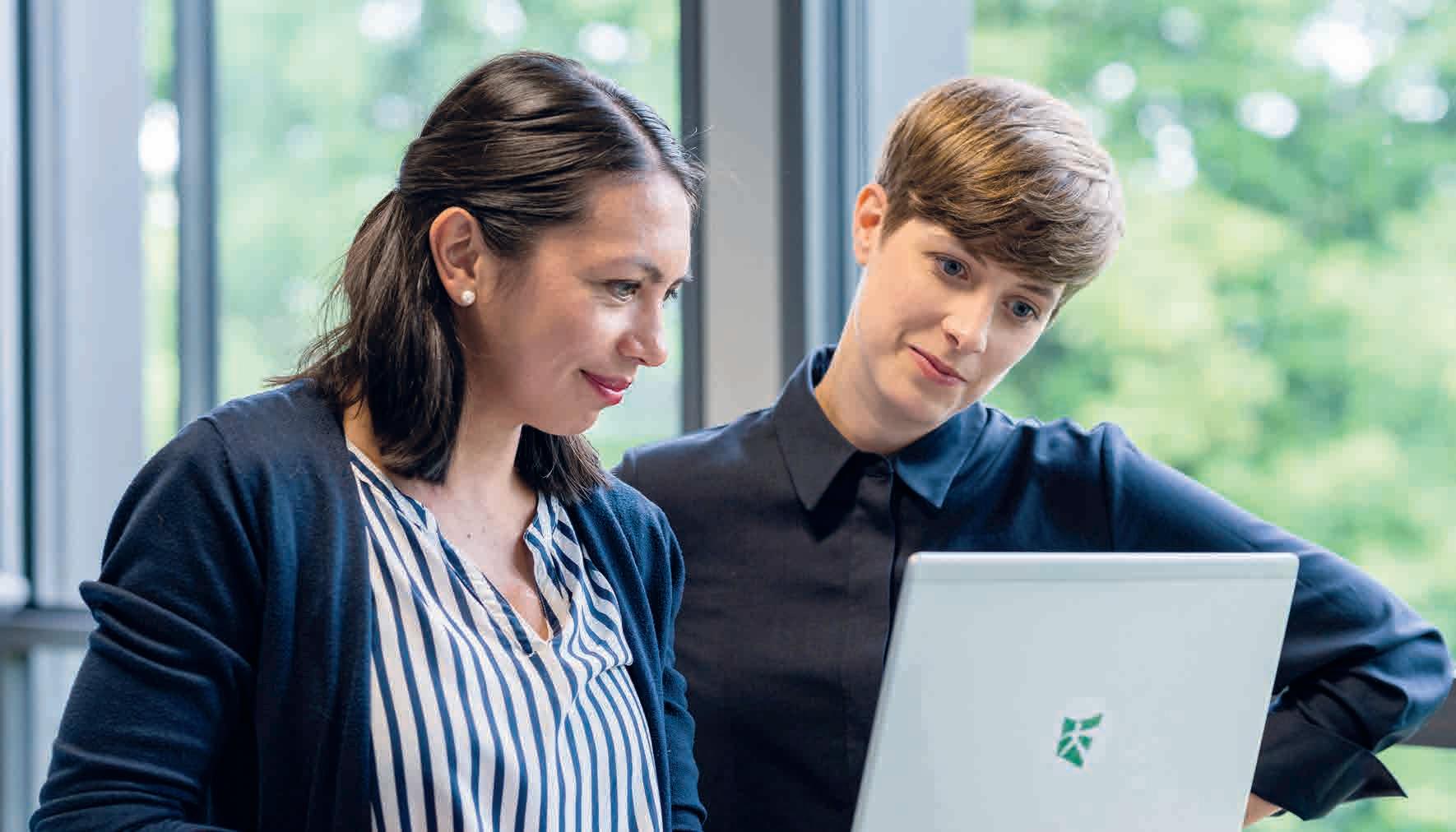
– Linde, L. | Sjödin, D. | Parida, V. | Wincent, J. (2021): Dynamic capabilities for ecosystem orchestration A capability-based framework for smart city innovation initiatives. Technological Forecasting & Social Change.
Lutz, P. | Stünzi, A. | Manser-Egli, S. (2021): Responsibility-Sharing in Refugee Protection: Lessons from Climate Governance. International Studies Quarterly.
Markard, J. | Rinscheid, A. | Widdel, L. (2021): Analyzing transitions through the lens of discourse networks: Coal phase-out in Germany. Environmental Innovation and Societal Transitions.
Meynhardt, T. (2021): Public Value is Knowable, Public Value Creation is Not. Administration & Society.
– Mikkelson, G.M. | Avidan, M. | Conevska, A. | Etzion, D. (2021): Mutual reinforcement of academic reputation and fossil fuel divestment. Global Sustainability.
– Muff, K. | Delacoste, C. | Dyllick, T. (2021): Responsible leadership competencies in leaders around the world: Assessing stakeholder engagement, ethics and values, systems thinking and innovation competencies in leaders around the world. Corporate Social Responsibility and Environmental Management.
– Nentwich, J. | Baumgärtner, M.K. | Chowdhury, N. | Witzig, V. (2021): Gender Bias in Recruiting: Developing a Social Practice Perspective. Women, Gender & Research.
– Palmié, M. | Böhm, J. | Friedrich, J. | Parida, V. | Wincent, J. | Kahlert, J. | Gassmann, O. | Sjödin, D. (2021): Startups versus incumbents in ‘green’ industry transformations: A comparative study of business model archetypes in the electrical power sector. Industrial Marketing Management.
– Palmié, M. | Böhm, J. | Lekkas, C.K. | Parida, V. | Wincent, J. | Gassmann, O. (2021): Circular business model implementation: Design choices, orchestration strategies, and transition pathways for resource-sharing solutions. Journal of Cleaner Production.
– Petrovich, B. | Carattini, S. | Wüstenhagen, R. (2021): The price of risk in residential solar investments. Ecological Economics.
– Pianta, S. | Rinscheid, A. | Weber, E.U. (2021): Carbon Capture and Storage in the United States: Perceptions, preferences, and lessons for policy. Energy Policy.
– Resch, B. | Hoyer, P. | Steyaert, C. (2021): Affective control in new collaborative work: Communal fantasies of purpose, growth and belonging. Organization Studies.
– Rinscheid, A. | Rosenbloom, D. | Markard, J. | Turnheim, B. (2021): From terminating to transforming: The role of phase-out in sustainability transitions. Environmental Innovation and Societal Transitions.
– Schwiter, K. | Nentwich, J. | Keller, M. (2021): Male privilege revisited: How men in female-dominated occupations notice and actively reframe privilege. Gender, Work and Organization.
– Shepherd, D.A. | Parida, V. | Wincent, J. (2021): Bribery from a micro, demand-side perspective. Small Business Economics.
– Shepherd, D.A. | Parida, V. | Wincent, J. (2021): Entrepreneurship and Poverty Alleviation: The Importance of Health and Children’s Education for Slum Entrepreneurs. Entrepreneurship Theory and Practice.
– Siegel, S.T. | Krummennauer-Grasser, A. | Stahl, C. (2021): Lehrbezogenes Wissensmanagement in der Hochschullehre: Entwicklung, Beschreibung und Einsatzmöglichkeiten des Reflexionsinstruments LeWiMa. Der pädagogische Blick.
Srivastana, M. | Narayanamurthy, G. | Moser, R. | Pereira, V. | Paille, P. (2021): Supplier’s response to institutional pressure in uncertain environment: Implications for cleaner production. Journal of Cleaner Production.
– Stauch, A. (2021): Does solar power add value to electric vehicles? An investigation of car-buyers’ willingness to buy product-bundles in Germany. Energy Research & Social Science.
– Stutzer, R. | Rinscheid, A. | Oliveira, T.D. | Mendes P.L. | Kachi, A. | Duygan, M. (2021): Black coal, thin ice: The discursive legitimisation of Australian coal in the age of climate change. Humanities & Social Sciences Communications.
– Tosun, J. | Rinscheid, A. (2021): What drives engagement in the Clean Energy Ministerial? An assessment of domestic-level factors. Journal of European Public Policy.
– Thaler, P. | Pakalkaite, V. (2021): Governance through real-time compliance: the supranationalisation of European external energy policy. Journal of European Public Policy.
– Valente, M.G. | Neris, N. | Fragoso, N. (2021): PRESA NA REDE DE PROTEÇÃO SOCIAL: Privacidade, gênero e justiça de dados no Programa Bolsa Família. Novos Estudos CEBRAP.
–
–
–
–
–
59
Van Dick, R. | Cordes, B.L. | Lemoine, J.E. | Steffens, N.K. | Haslam, S.A. | Akfirat, S.A. | Ballada, C.J.A. | Bazarov, T. | Aruta, J.J.B.R. | Avanzi, L. |
Bodla, A.A. | Bunjak, A. | et al. (2021): Identity Leadership, Employee Burnout and the Mediating Role of Team Identification: Evidence from the Global Identity Leadership Development Project.
International Journal of Environmental Research and Public Health.
Vuichard, P. (2021): Electrifying the company car: Identifying hard and soft barriers among fleet managers in Switzerland. Energy Research & Social Science.
Vuichard, P. | Stauch, A. | Wüstenhagen, R. (2021): Keep it local and low-key: Social acceptance of alpine solar power projects. Renewable and Sustainable Energy Reviews.
Walls, J.L. | Salaiz, A. | Chiu, S.C. (2021): Wanted: Heroic leaders to drive the transition to ‘business beyond usual’. Strategic Organization.
– Wesemann, H. | Wincent, J. (2021): A whole new world: Counterintuitive crowdfunding insights for female founders. Journal of Business Venturing Insights.

– Wettstein, F. (2021): Betting on the Wrong (Trojan) Horse: CSR and the Implementation of the UN Guiding Principles on Business and Human Rights. Business and Human Rights Journal.
– Wildhaber, I | Ebert, I.L. (2021): Piercing the Veil of Opacity: Responsibility and Liability for People Analytics Tools at the Workplace. Morals & Machines.
Books
– Alfaro d’Alençon, P. | Boanada-Fuchs, A. | Greene, M. | Krishnamurthy, S. | Moretto, L. | Michelutti, E. | Smit, W. (Eds.) (2021): Engaging urban research in policy-making: Towards Equitable
Economic Growth A partnership between Cities Alliance, AURI, REDEUS_LAC and N-AERUS. TU Berlin Press.
– Beschorner, T. | Sindermann, D. (Eds.) (2021): Wirtschaft ist Kultur. Wirtschaftsphilosophische und wirtschaftsethische Beiträge. Metropolis.
Binswanger, C. | Zimmermann, A. (Eds.) (2021): Transitioning to Gender Equality. MDPI.
– Casas i Klett, T. | Cozzi, G. (Eds.) (2021): Elite Quality Report 2021: Country Scores and Global Rankings. Seismo.
– King-Savic, S. (2021): Forging Transnational Belonging through Informal Trade: Thriving Markets in Times of Crisis. Routledge.
– Kolmar, M. (2021): Grenzbeschreitungen – Vom Sinn, dem gelingenden Leben und unserem Umgang mit Natur. Vandenhoeck & Ruprecht.
Nentwich, J. | Vogt, F. (2021): (Un)doing Gender empirisch. Qualitative Forschung in der Kita. Springer VS.
– Sindermann, D. (2021): Sinn und Anerkennung von Arbeit. Ein philosophisches Modell für das Personalwesen. Campus.
– Tarkhanova, O. (2021): Compulsory Motherhood, Paternalistic State – Ukrainian Gender Politics and the Subject of Woman. Palgrave.
Book Chapters – Beschorner, T. (2021): Football and Social Responsibility (FSR). In H. Hickey & J. Berthoud (Eds.): Handbook of Football Association Management. UEFA.
Beschorner, T. | Kettner, M. (2021): Kulturalistische (Wirtschafts-)Ethik: Ein konzeptioneller Rahmen. In T. Beschorner & D. Sindermann (Eds.): Wirtschaft ist Kultur. Wirtschaftsphilosophische und wirtschaftsethische Beiträge. Metropolis.
– Beschorner, T. (2021): Wirtschaft ist Kultur. Zur
Einführung. In T. Beschorner & D. Sindermann (Eds.): Wirtschaft ist Kultur. Wirtschaftsphilosophische und wirtschaftsethische Beiträge. Metropolis.
– Binswanger, C. (2021): Im Spannungsfeld von Identitätsfindung und Transgression von Identitätskategorien: Eine geschlechtertheoretische Lektüre von Niklaus Flütsch Geboren als Frau. Glücklich als Mann. Logbuch einer Metamorphose. In A.B. Rothstein (Ed.): Kulturelle Inszenierungen von Transgender und Crossdressing. Transcript.
– Binswanger, C. (2021): Krise der Männlichkeit als Möglichkeitsraum: Männliche Scham in Max Frischs Stiller von 1954. In AG Transformation von Männlichkeiten (Ed.): Zeitdiagnose Männlichkeiten Schweiz. Seismo.
– Boanada-Fuchs, A. (2021): Critical review on the relationship between public services provision and equitable economic development. In P. Alfaro d’Alençon et al. (Eds.), Engaging urban research in policy-making: Towards Equitable Economic Growth A partnership between Cities Alliance, AURI, REDEUS_ LAC and N-AERUS. TU Berlin Press.
– Bronner, W. | Gebauer, H. | Lamprecht, C. | Wortmann, F. (2021): Sustainable AIoT: How Artificial Intelligence and the Internet of Things Affect Profit, People, and Planet. In O. Gassmann & F. Ferrandina (Eds.): Connected Business. Springer.
Denisova-Schmidt, E. (2021): Mitigating Corruption in Higher Education. In H. van’t Land, A. Corcoran & D.-C. Iancu (Eds.): The Promise of Higher Education. Springer.
Ebert, I. | Wildhaber, I. (2021): Privacy in the Workplace: A Human Rights Due Diligence Approach. In J. Andrew & F. Bernard (Eds.), Human Rights Responsibilities in the Digital Age: States, Companies and Individuals. Hart Publishing.
Eckl, J. (2021): Globale Gesundheitspolitik aus analytischer und anwendungsorientierter Sicht. In:
–
–
–
–
–
–
–
–
–
–
60 Research
M. Bonk & T. Ulrichs (Eds.), Global Health – Das Konzept der globalen Gesundheit. De Gruyter.
Fisher, M. | Howaidy, G. | Sander G. (2021): Reflections on PRME Gender Equality Working Group. In: Principles for Responsible Management Education (Ed.): Responsible Management Education Routledge.
– Goop, T. (2021): Lohngleichheit und Lohngleichheitsanalyse. In: A. Mathis & R. Nobs (Ed.): Treuhand und Revision Handbuch 2021. WEKA Business Media AG
– Hirschi, C. (2021): Expertise in der Krise: Zur Totalisierung der Expertenrolle in der Euro-, Klima- und Coronakrise. In S. Büttner & T. Laux (Eds.), Umstrittene Expertise: Zur Wissensproblematik in der Politik. Nomos.
– Hjorth, D. | Steyaert, C. (2021): Stirring and disturb – urging the movement of academic entrepreneurship onwards. In P. Eriksson, U. Hytti, K. Komulainen, T. Montonen & P. Siivonen (Eds.): New Movements in Academic Entrepreneurship. Edward Elgar.
Levy, R. | Sander, G. (2021): Weshalb diese Wandlungsresistenz der Geschlechterordnung in der Schweiz? Eine lebenslauftheoretische Perspektive. In: S. Scherger et al. (Eds.): Geschlechterungleichheiten in Arbeit, Wohlfahrtsstaat und Familie. Campus.
– Luisetti, F. (2021): Pandemien. In M. Festl & J. Metzler (Eds.): Handbuch Liberalismus. PhilPapers.
Meynhardt, T. (2021): The common good on the move: The pandemic as a catalyst. In Flick C.M. (Ed.): New Global Alliances: Institutions, Alignments and Legitimacy in the Contemporary World. Convoco.
– Valverde Coto, J.P. | Jäger, U. (2021): International nongovernmental organization governance: Brokering between developed countries and the developing world. In G. Donnelly-Cox, M. Meyer & F. Wijkström (Eds.), Research Handbook on Nonprofit Governance. Edward Elgar.
Yam, S. | Gloor, J. L. | Liu, L. (2021): Humor and its effects for leaders in the East and in the West. In D. De Cremer (Ed.): On the Emergence and Understanding of Asian Global Leadership. De Gruyter.
– Wildhaber, I. | Pietruszak, T. (2021): Gesundheitsschutz und Arbeitszeitvorschriften im Homeoffice. In I. Wildhaber (Ed.): Handbuch Homeoffice. Dike.
– Wittmer, A. | Linden, E. (2021): The Future of Mobility: Trends that will Shape the Mobility and Aviation Industry in the Future. In A. Wittmer | T. Bieger & R. Müller (Eds.): Aviation systems. Management of the integrated aviation value chain. Springer.
– Wittmer, A. | Müller, A. (2021): The Environment of Aviation. In A. Wittmer, T. Bieger & R. Müller (Eds.): Aviation systems. Management of the integrated aviation value chain. Springer.
Selection of New Faculty Dealing with Aspects of Sustainability
Full professor Amanda Shantz ’s research focuses on how organisations leverage human talent to achieve high levels of success while ensuring that they make a positive impact in the communities in which they operate. She is an international thought-leader on how organisations can create social impact through their employees, particularly via employee volunteering programmes. This focus sits at the intersection of corporate citizenship and human resources and aligns with the UN Sustainability Goals.
Mariana Valente is an Assistant Professor of International Economics Law and develops research on digital economy regulation, particularly on the intersection between technologies and fundamental rights and inequalities. For the past ten years, she has been researching and publishing on online genderbased violence and legal strategies to face it as well as working on producing impact out of that research.
Selected Promotions of HSG Faculty Involved in SustainabilityRelated Research
Alexander Braun was promoted to Associate Professor. His sustainability-related research focuses on the role of the insurance industry in mitigating climate change and its impact. He also considers the consequences of climate change for natural catastrophe risk and the associated impact on insurance and capital markets.
–
Moser, R. | Narayanamurthy, G. (2021): Providing access to water in remote areas: Trunz water systems in India. In Strategic Management.
McGraw Hill Education
– Salaiz, A. | Chiu, S.C. | Walls, J.L. (2021): Sustainability agency at the top of the organization: Microfoundations research on corporate sustainability. In S. Teerikangas, T. Onkila, K. Koistinine & M. Mäkelä (Eds.): Edgar Elgar Research Handbook of Sustainability Agency. Edgard Elgar Publishing.
Sánchez, Y. (2021): Redes y ecosistemas transareales. In P. Gwozdz, T. Kraft & M.A. Lenz (Eds.), Bilder in Bewegung: Ansichten des Bildlichen zwischen Kunst und Wissenschaft. De Gruyter.
Sander, G. | Goop, T. (2021). EQx diversity and inclusion (D&I): Indicator family scorecard analysis. In T. Casas i Klett & G. Cozzi (Eds.), Elite Quality Report 2021: Country Scores and Global Rankings. Seismo.
– Sander, G. | Keller, N. (2021): McKinsey Gender Parity Report. In: E. Ng, Ch. Stamper & A. Klarsfeld (Eds.): Handbook on Diversity and Inclusion Indices: A Research Compendium. Edward Elgar.
– Sander, G. | Keller, N. | Hartmann, I. | Rudat, L. (2021): Diversity und Inklusion als Führungsaufgabe. In: P. Genkova (Ed.): Handbuch Globale Kompetenz. Springer.
Eri Bertsou is an Assistant Professor in the Department of Political Science. Her research project ‘Varieties of Expertise’ investigates how scientific independent expertise can be incorporated in politics in a way that creates the widest possible support for policies among citizens, in particular, when it comes to climate change mitigation policy.
Rita Kesselring is an Associate Professor of Urban Studies focussing on the field of urban anthropology, among other things. Her ongoing research on the Zambian copper mining industry and its relation to the Swiss commodity trading hub examines uneven economic development at the global level and its effects on everyday life in Zambian mining towns.
Associate Professor Paolo Piacquadio’s sustainabilityrelated research targets mainly distributive justice issues. In particular, he addresses the relationship between inequality and social welfare, investigates the fair allocation of scarce resources across generations and for sustainability, and deals with the redistribution of income and wealth.
Assistant Professor Stefano Ramelli ’s research deals with corporate finance, financial markets, and the links between sustainability and finance. Currently, he is investigating the complex interactions between corporations, investors, and society on environmental and social issues.
Dominik Sachs is Full Professor of Macroeconomics and Public Finance. In his research he combines theoretical and empirical approaches to analyse which policies are efficient in reducing inequality and increasing equality of opportunity.
Thomas Burri was promoted to full professor of International and European law. His research includes the digital aspects of international and regional legal cooperation and seeks ways of coping with new technological developments by means of existing law and normative thinking, e.g. regarding robotics or intelligent algorithms and their social implications.
Beatrix Eugster was promoted to Full Professor for Disability Economics & Integration. Her main areas of research include health, labour, and education economics with a focus on disability and integration.
Nils Fürstenberg was promoted to Assistant Professor. His sustainability-related research deals with the topic of healthy leadership. In particular, he investigates employee well-being and the management of conflicting tensions in organizations.
Merla Kubli was promoted to Assistant Professor of Managing Climate Solutions and serves as pragramme manager of the Master’s certificate in Managing Climate Solutions (MaCS-HSG). Her research focusses on the business dynamics of climate solutions, in particular addressing renewable energies, decentralised flexibility and circular economy solutions for electric vehicle batteries.
Michael Mommert was promoted to Assistant Professor of Computer Vision. In his research he combines computer vision methods with complex Earth observation data to support applications that are relevant to achieving sustainable development goals and to design efficient data analysis methods.
–
–
–
–
–
–
61
“Following the integrative and systemic approach of the University of St. Gallen, it is our mission to consider sustainability in an interconnected way across all activities at our University – above all, it is key to walk the talk.”
Dr. Bruno Hensler, Director of Administration
“Sustainability is an important goal for HSG – our aspirations in research and teaching should also be reflected in the sustainable design of our campus.”
Prof. Ulrich Schmid, Vice President, External Relations
Campus, Partnerships, and Dialogue
Goal
Become a net zero, diverse, and inclusive university and collaborate with stakeholders.
Key achievements
Developed internal greenhouse gas (GHG) accounting system and published first GHG report. Infrastructural improvements, such as photovoltaic on library and barrier-free access arrangements.
Many sustainability events, including exhibitions, public talks, workshops, and conferences.

This chapter addresses PRME Principle 5: Partnership and PRME Principle 6: Dialogue.
For an overview of all PRME principles, please see page 22.
63
Environmental Sustainability on Campus
To reach the goal of becoming net zero, the Climate Solutions Taskforce (CST) has kicked off a climate strategy, which addresses innovation potential while at the same time managing risk and striving for operational excellence in six action areas. In 2022, HSG released its first Greenhouse Gas (GHG) Protocol report. Since 2007, HSG has been certified for the near-natural design of its landscape by the Nature & Economy Foundation. HSG is also a member of the Blue Community, committed to ensure the efficient use of water. In addition, faculty and students have initiated projects to make the campus more environmentally friendly, such as a reusable cups system initiated by Change Hub and an energy-saving campaign launched by students based on work during a course.
Overview of Campus, Partnerships and Dialogue
Equality, Diversity and Inclusion on Campus
To embed equality, diversity and inclusion into HSG’s structures and culture, the Diversity and Inclusion Unit has established several processes and collaborates closely with the University’s administration and students. Further, the unit focuses on ensuring accessibility, both on campus and in the digital world. The Equality, Diversity, and Inclusion Committee advised University management, for example, on how to address the challenges of vulnerable persons during the COVID-19 pandemic. In 2021/2022, the Equal Opportunities and Special Needs advice centres consulted 474 cases on matters regarding equality, diversity and inclusion, as well as studying with disability, chronic diseases, and psychological stress. Besides the initiatives of the institutional bodies, student-driven initiatives are
helping to promote diversity on campus, such as the Pride Month and the student organisation Universa. There is close collaboration between institutional bodies and student-driven initiatives. The Student Union is part of the Equality, Diversity, and Inclusion Committee, the Special Needs advice centre is working together with the student peer group SafeSpace, and the Equal Opportunities advice centre collaborates with student events organised by the Student Union (Day Against Sexual Harassment 2022) and ECOnnect (Student Action for Diversity & Inclusion).
Partnerships and Dialogue Within the Local and Global Community
A broad range of events take place at HSG to make sustainability more visible and engage with internal and external stakeholders concerning different aspects of sustainability. HSG members integrate business representatives, public experts, NGOs and alumni into workshops and seminars and share their knowledge in the media to ensure vivid dialogue between academia and practice.

HSG aims to become net zero by 2030 and to embed equality, diversity and inclusion into its structure and culture. Several institutional processes have been initiated to achieve these goals. Furthermore, numerous outreach activities were organised to engage with the local and global community.
64 Campus, Partnerships and Dialogue
To better understand HSG’s footprint and to be able to identify and prioritise University development projects that promote net zero, HSG set up a university-wide GHG accounting project in 2022. It is based on the GHG Protocol and was developed with the help of an external partner, SouthPole. The comprehensive new GHG accounting process complements ongoing energy monitoring, which already measures GHG emissions related to the energy consumption of the cantonal buildings used by HSG.
The HSG-wide GHG accounting system now provides a coherent and
University-wide Greenhouse Gas Accounting
During 2022, the University undertook a detailed carbon accounting project to understand its Greenhouse Gas (GHG) emissions over the 2019–2021 period. The resulting report clearly orients the University in relation to the measures required to achieve its commitment
detailed database for identifying central areas of climate action, implementing carbon neutral procurement, and facilitating the measurement and management of emissions throughout the supply chain. An important aspect of the project was defining the boundaries within which GHG emissions should be included in HSG’s GHG accounting. Complementary to scope 1 emissions (emissions from stationary and mobile combustion) and scope 2 emissions (emissions from purchased electricity, heating and cooling), most of HSG’s emissions are scope 3 emissions (purchased goods and services, capital goods, upstream transport,

business travel, employee commuting, waste, upstream leased assets, fuel-/ energy-related activities, and downstream activities such as the teaching of off-site courses and student travel).
HSG’s total GHG emissions were 25,583 tonnes of carbon dioxide equivalent (tCO₂e) in 2019, 14,523 tCO₂e in 2020, and 17,282 tCO₂e in 2021. Total emissions decreased by 43% year-onyear in 2020 due to the pandemic and rebounded by 19% year-on-year in 2021. The following table depicts the main results.
to becoming net zero in 2030.
University of
Accounting 2019–2021,
Pole Scope What’s included 2021 % 2020 % 2019 % Scope 1 Stationary and mobile combustion fuels 539 tCO 2e 3% 456 tCO 2e 3% 532 tCO 2e 2% Scope 2 Purchased electricity 0 tCO 2e 0% 0 tCO 2e 0% 0 tCO 2e 0% Scope 3 Purchased goods and services, capital goods, upstream transport, business travel, employee commuting, waste, upstream leased assets and fuel-/energy-related activities, downstream activities (e.g. student travel) 16,743 tCO 2e 97% 14,067 tCO 2e 97% 25,050 tCO 2e 98% 17,282 tCO 2e 100% 14,523 tCO 2e 100% 25,583 tCO 2e 100% 65
St. Gallen's footprint, Greenhouse Gas (GHG)
adapted from South
Increasing the energy efficiency of buildings, decarbonising heating and cooling, and increasing share of renewable power generation on campus are important measures for becoming net zero. Since 2019, the HSG has bought 100% hydropower from a local supplier and continues to increase the share of the electricity it generates itself by installing rooftop solar systems on University buildings. The latest addition in 2022 – a 165 kWp system installed on top of the library building as well as a 30.6 kWp at the SQUARE building – has increased our photovoltaics capacity over the past years, so HSG now covers about 20% of its annual electricity demand with on-site solar power generation.
Ecological Sustainability in Operations

As part of the Blue Community initiative, the University aims to reduce its water consumption and regularly reports on its activities related to water as a public good. In addition, HSG has a comprehensive waste management system and tries to reduce the environmental impacts of food and mobility. HSG tracks and recycles different types
of waste, and the canteen sells leftover food at a reduced price to fight food waste. Regarding mobility, several incentives for sustainable commuting are provided for employees, such as the SBB Business Travel App and carsharing option. For conference travel and student exchange, HSG supports sustainable travel choices with a financial incentive. Furthermore, several institutes and chairs, such as the Chair of Prof. Wüstenhagen, the Chair of Prof. Walls, the Chair of Prof. Freyburg and the Chair of Prof. Blohm, have introduced a low-carbon travel policy. Additional data on energy, electricity, water consumption, waste management, and food can be found in the Appendix on pages 78 ff. Video

Towards a net zero campus
Different teams within HSG’s administration and faculty are working on making our operations more sustainable. These activities include sustainability activities related to buildings and infrastructure, food, waste, and mobility.
“We see the promotion of the HSG sustainability strategy as an obligation. The Buildings & Technology department follows the understanding that a development is sustainable only if it ensures that the current and future needs of HSG's operations can be met.”
Markus Steiner, Lead Buildings & Technology
66 Campus, Partnerships and Dialogue
Environmentally-friendly pratices are integrated into different aspects of campus operations
Late in the evening when no one is around, the campus grounds belong exclusively to nocturnal animals. In the large, park-like area of 47,500 square metres, foxes, martens, and badgers find their home around the University buildings, where 28 tree and 38 shrub species grow. The surrounding meadows, which are mown only once a year after plants have seeded, provide a habitat for insects, birds, and other small animals.
Leaving space for this wild vegetation is intentional: nature is deliberately left space to develop on the Rosenberg campus. Since 2007, HSG has been certified for the near-natural design

Supporting the Web of Life: Biodiversity on Campus
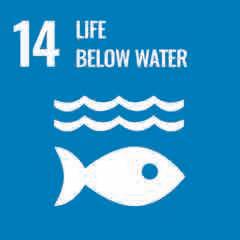
Our alma mater also nurtures nature. For over 15 years, the near-natural design of HSG’s Rosenberg campus has provided space for flourishing wildlife. In the last two years, several activities have been implemented to further increase the biodiversity on campus.
have been extensively planted with endemic species. Also, in 2021, the façades on the classroom cabins behind the sports grounds were greened: indigenous climbers now grow upwards on a wire mesh in front of the cabins. This increases the shade and thus also improves the indoor climate of the cabins.
of its environment by the Nature & Economy Foundation, which promotes nature in residential areas and recognises exemplary areas and environmental planning.

Green Façade and Roofs
As the impacts of climate change increase, having a green environment in cities is becoming increasingly important. At HSG, several buildings have been greened: during the library renovation in 2021, a near-natural roof garden with a small biotope was created. On the new SQUARE building, approximately 1,350 square metres
Biologically diverse campus design also means giving preference to indigenous plants. Wherever possible, the non-indigenous species that were historically planted on the grounds – such as decorative shrubs in front of buildings – are removed and replaced by indigenous plants. However, a few exotic plants have been preserved as they represent the long-standing and deep history of when the university area was owned by St. Gallen’s Kirchhofer textile dynasty.
Even though the green campus area looks a bit overgrown, a great deal of manual work is involved in its upkeep. Two employees from HSG’s Construction and Technology Department work exclusively on maintaining of the surroundings. Further, together with external experts in biologically diverse environmental design they regularly inspect the area to determine options how the campus can be made more natural.
67
Examples of biodiversity on campus
Equality, Diversity and Inclusion
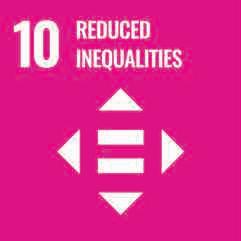

Equal opportunities, diversity and inclusion are central aspects of HSG's pursuit of excellence, fairness and responsibility. We see diversity as an opportunity, and respect as indispensable. To ensure this, specific advice centres work on further developing the University in this regard and ensure a comprehensive advisory service.
The HSG strives to create framework conditions that allow everyone, regardless of gender, skin colour, social and cultural background, sexual orientation, health or physical impairments, to enjoy studying, teaching, researching and working here equally and successfully. The advice centres for Special Needs and Equal Opportunities are the contact point for both students and faculty members for all matters regarding equality, diversity and inclusion. During the last two years, the offices have consulted on a total of 474 cases regarding equal opportunities and special needs. In addition, together with other stakeholders, they have organised various activities and events to make the campus more inclusive and diverse:
Implicit Bias Training
In 2021, the Diversity & Inclusion unit introduced implicit bias training to reduce gender bias in appointment processes. In addition to the publicly available online tool, D&I specialists conducted face-to-face training. The D&I unit plans to further improve the online training and design additional training formats.

Infoday Women*@HSG
To address the small share of female Bachelor’s students, the D&I unit initiated an information event for female high school students in 2021. The infoday Women*@HSG provides young women with the opportunity to learn about various majors in workshop formats and to ask questions about studying at HSG. Due to the positive feedback, the event was implemented again in 2022 and is now planned to take place annually.
Inclusive Language
Based on the inclusive language guideline, authored by Prof. Christa Binswanger in 2020, the Diversity & Inclusion unit is offering customised workshops on inclusive language for staff and, in collaboration with the writing lab, for students.
Respect
The University has implemented measures for raising awareness among incoming students – for example, through online consent training for the StartWeek tutors and is part of the swissuniversities collaboration for implementing a national day against sexual harassment at higher education institutions.

LGBTIQ+
Thanks to a student-driven initiative, HSG was the first university in Switzerland to celebrate Pride Month with a comprehensive, three-week programme and a strong communication campaign every year since 2020. Furthermore, it has been ensured that any University buildings that are constructed in the future will be equipped with genderneutral toilets.
Video Diversity & Inclusion at
68 Campus, Partnerships and Dialogue
Workshop on ‘Student action for diversity and inclusion’
HSG
Quality Education for All: Study Funding at the University of St. Gallen

University of St. Gallen uses various funds to support students financially to ensure access to quality education for all, regardless of the financial situation. The related activities are coordinated by the Advice Center for Study Funding, which manages the financial aid instruments provided by HSG.
In Switzerland, public education is of high standard. Swiss public universities are subsidised by the government at the cantonal level, which results in low tuition fees for all. Further, cantonal needbased educational instruments (scholarships and loans) and social system instruments (welfare support) provide financial aid to Swiss residents and nationals.
In addition, the central administration of the University of St. Gallen offers need-based and merit-based financial aid to students, which is funded internally and through collaboration with external foundations. The Advice Center for Study Funding is engaged in all aspects of the operation and strategic development of these financial aid instruments and is in close contact with students who reach out for financial support. Furthermore – with a particular focus on sustainable, social, and cultural projects – the Social and Sustainable Impact Fund of the Student Union serves the purpose of improving the social situation of students as
well as the means of clubs to pursue projects that benefit the entirety of the student body. In addition, some academic schools, institutes, and programmes have access to further funds for supporting students on the Master’s, PhD, and executive levels.
The needs-based HSG Loan and Scholarship Fund (DSF) supports all students of the Assessment Year, Bachelor’s, and Master’s levels in a subsidiary manner, with scholarships and loans at favourable rates of interest. While the different merit-based scholarships are all linked to a minimum HSG gradepoint average and a defined number of credits earned during a specified number of semesters, they are also associated with different nationality and residency requirements and additional criteria. The eligibility criteria for each financial instrument – whether internally or externally financed – are clearly specified. The values of social inclusion and quality education for all live through all regulations of our University's financial aid instruments.
Merit-based Scholarships
Need-based DSF Loan Management Volume
The
2022 2021 CHF 1’736’210 132 students CHF 1’483’199 104 students Need-based DSF Scholarships + Loans (1-2 Sem) - CHF 29’770 4 alumni Need-based DSF Loan Remissions CHF 174’801 22 students CHF 88’412 10 students Other Need-based Scholarships (1-3 Sem) CHF 253’689 24 students CHF 124’242 17 students Merit -based Scholarships (3-6 Sem) CHF 1’271’072 105 loans (31.12.2022) CHF 1’079’614 97 loans (31.12.2021) Need-based DSF Loan Management Volume 0 200 400 600 800 1000 1200 1400 1600 1800 2000 2017 2018 2019 2020 2021 2022 in T CHF
Need-based DSF Scholarship, Loan and Remission Decisions
Other Need-based Scholarships
69
Ukrainian-War Refugees at HSG
Around 250 students affected by the war in Ukraine contacted our University in the spring and summer of 2022 concerning studying at HSG. Due to significant efforts, 20 student refugees were enabled to study at HSG in the autumn of 2022.
As there was an acute need for a new approach, the President’s Board created a task force with those offices intricately involved in admission and financial aid processes. Once in action, this operative task force worked on aligning offices from different Vice-President’s boards (such as the offices of the Dean of Studies, admissions, financial aid, student mobility, and doctoral studies) and the students in form of the Student Union. The collaboration required defining suitable and pragmatic internal processes, the establishment of collaborative modes of working, the alignment of HSG with other universities in Switzerland, and building relationships with cantonal and federal welfare offices.
While the constituents of the task force had differing views at times and were challenged by a significant workload, appreciation for everyone’s efforts and contributions developed into common understanding and collective care for each other and support for the shared purpose. New relationships were formed internally and with external partners, and new networks and offers emerged at HSG
Executive Education Offers for Migrants
Since December 2022, HSG has been offering free executive education programmes to refugee migrants with a university degree living in Switzerland through the Offers for Migrants initiative. The offer aims to promote equal opportunities and diversity and is open to all refugee migrants. Eligible persons can contact the HSG Executive Education Consultant. The initiative is supported by ten units/institutes of the University of St. Gallen, 22 programmes are available in total. The first five places have already been allocated.
and across the Swiss higher education sector. In the end, a total of 20 students holding ‘S-protection’ status started their studies (BA, MA, PhD) in the autumn semester of 2022. HSG was able to provide them with substantial financial aid to enable their studies. Furthermore, the Student Union’s Ressort International developed and offered these students a Confidant Buddy Programme to support the onboarding process at HSG. While these students registered as refugees in different cantons, have varying ages, family situations, and educational/professional backgrounds, they share the goal of wanting to study successfully at HSG and contribute to society personally and professionally.
This unexpected crisis tested the resolution and implementation capacity of the University’s social purpose – namely, offering and enabling quality tertiary education for all. While some challenges clearly remain to be solved, the insights, challenges, and joys the process has created have already left their impact not only on these 20 students and those close to them, but on all those thus far engaged in the HSG response to the crisis.
Scholars at Risk
In 2022, HSG submitted four applications to the Swiss National Science Foundation (SNSF) special budget ‘Scholars at Risk – Ukraine’, and got an approval for all of them in the first half of 2022. These four postdoctoral scholars will be supported for a period of up to two years in professional and personal matters by a host professor (and his/her staff) and the Head of the HSG Grants Office.
70 Campus, Partnerships and Dialogue
Examples of Student Initiatives on Campus
STUDENT ENGAGEMENT
Under the slogan ‘Yes to Less’, students organised TEDtalks on how to encourage positivity and empowerment in relation to the actions needed to achieve global climate goals. Speakers included experts such as Katharina van Bronswijk, Dr. Florent Heroguel, and Prof. em. Thomas Dyllick.



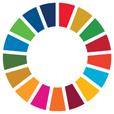

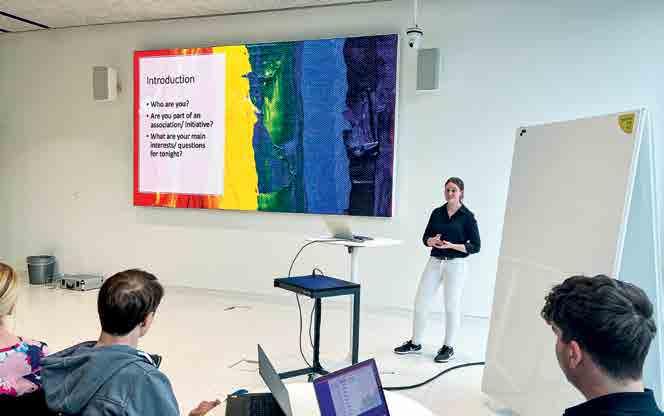
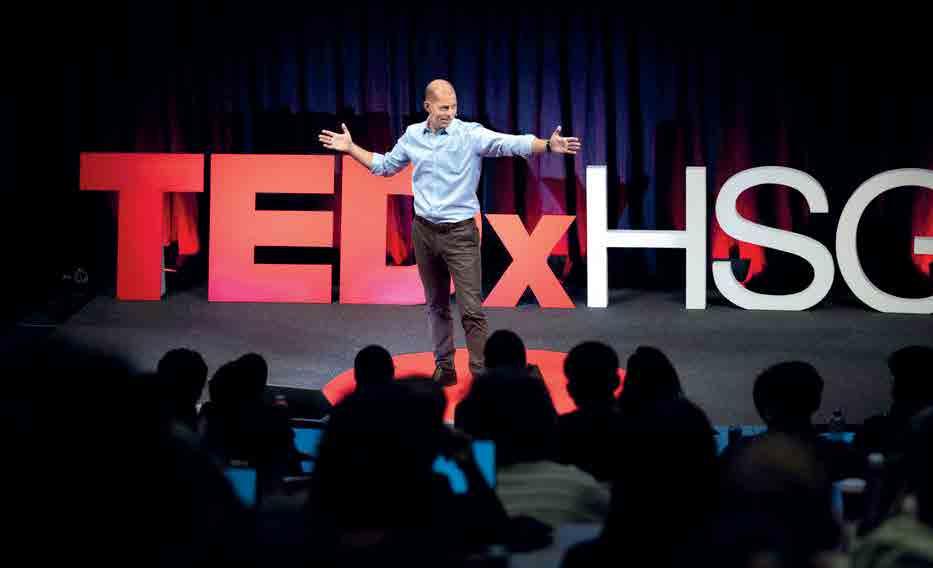
As part of the event ‘Student Action for Diversity & Inclusion’ hosted by ECOnnect, several students and associations presented their approaches and ideas about how to strengthen the diversity & inclusion of the student culture at HSG.
At the initiative of the student platform ChangeHub, reusable cups from the company kooky are now offered at all restaurants on campus. This option represents a sustainable alternative to the waste of resources through single-use cups.
oikos St. Gallen, one of the largest sustainability-driven associations at HSG, organises a yearly conference. In 2022, students implemented a mix of formats to foster exchange with representatives from academia and business on sustainable ideas and trends related to the topic ‘Make a Change –Individually and Collectively’.
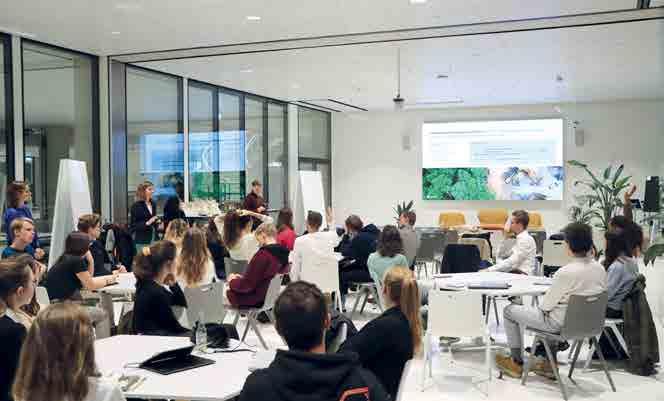
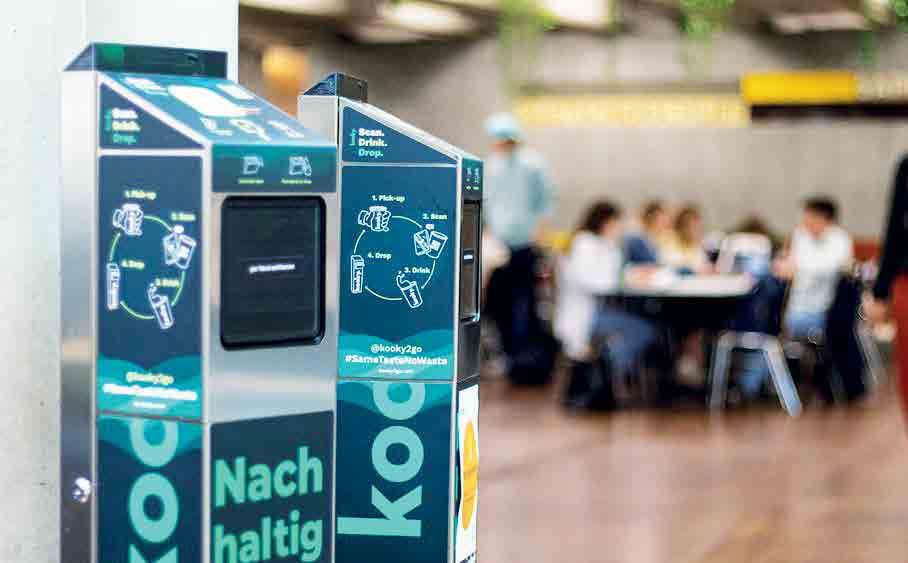
As part of the HSG student podcast series, Anna Kurth and Johannes Tschiderer, the (former) presidents of the student associations oikos St. Gallen and Student Impact, talked about their visions for a more sustainable business education and provided insights into the activities of their clubs.

Universa, a student association that promotes networking and career opportunities for female students, organises a recruiting event called Women’s Day on an annual basis. In 2022, this event took place under the slogan #DareToChallenge and included events on the topics of diversity, gender shift, and leadership.
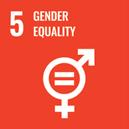
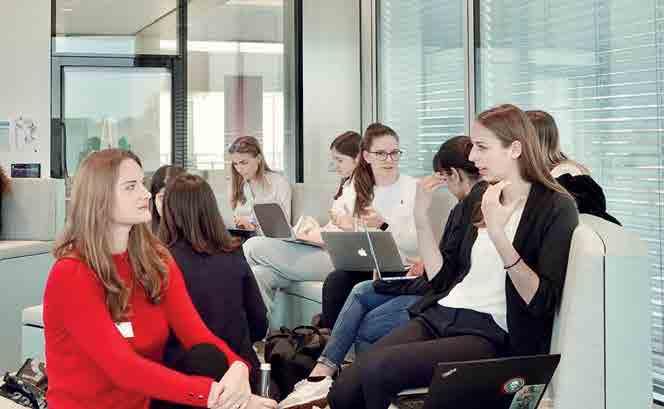
71
The first point of contact for startups, innovation and entrepreneurship at our University is Startup@HSG at the Center for Entrepreneurship. Among their broad offering, they run the HSG Entrepreneurial Talents Programme, which supports early-stage founders that address at least two SDGs in their value proposition. This support includes, amongst other things, coaching and funding, as well as networking opportunities with a sustainable entrepreneurship expert. In addition, the Female Founders Programme boosts female entrepreneurship at HSG through a series of events, initiatives, and an accelerator programme. Furthermore, Startup@HSG awards the HSG SpinOff Label to startups that fulfil various assessment criteria, among them sustainability. Numerous spinoffs that tackle both social and environmental sustainability issues have evolved out of Startup@HSG offers over the last years, including well-known names such as Planted Foods and Pápydo.
Apart from Startup@HSG, other institutes also support entrepreneurship as part of their work. For example, as the Leading House for the Latin American Region, the HSG Centro Latinoamericano-Suizo offers an Academia-Industry Training Programme for HSG startups

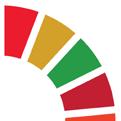
Sustainable Entrepreneurship at HSG


expanding to Brazil, Colombia, and/or Mexico. A list of selected startups is provided in the Appendix on page 85.
Furthermore, student associations contribute to shaping the entrepreneurial culture at HSG. Various events by oikos St. Gallen provide a platform for sustainable startups – for example, Manusia presented their sustainable
fashion collection at the Undress fashion show. Every year, START Global organises the START Summit which has become Europe’s leading student-run conference for entrepreneurship and technology. One of their own spinoffs, ROSE, has developed a software solution for sustainability management.

Entrepreneurial thinking and action have always been at the heart of education at HSG. Consequently, there is a vivid entrepreneurial culture with many ventures pioneering new approaches to sustainability.
“Sustainability is (…) central to everything we do at the company and not a side effect.”
Raffael Wohlgensinger, Founder & CEO of Formo, HSG Founder of the Year 2022
72 Campus, Partnerships and Dialogue
HSG Entrepreneurial Talents cohort autumn semester 2022
Engagement with the Local and Global Community
We communicate about our sustainability activities via our website, social media channels (e.g., a dedicated LinkedIn feed), and an intranet community. In addition, in 2021 and 2022, the University’s communication department and the R&S team produced a video series on HSG’s sustainability strategy to communicate its sustainability activities to internal and external stakeholders. The HSG Magazine ‘HSG Focus’ regularly features several sustainability-related research topics, such as sustainability in the supply chain, and published a dedicated edition on energy.
In addition to being an active member of local and global sustainability-related networks (see pages 12 and 82), HSG members including students, alumni, and the SQUARE,


Sustainability at HSG and ECOnnect
Responsibility & Sustainability – University of St. Gallen (unisg.ch)

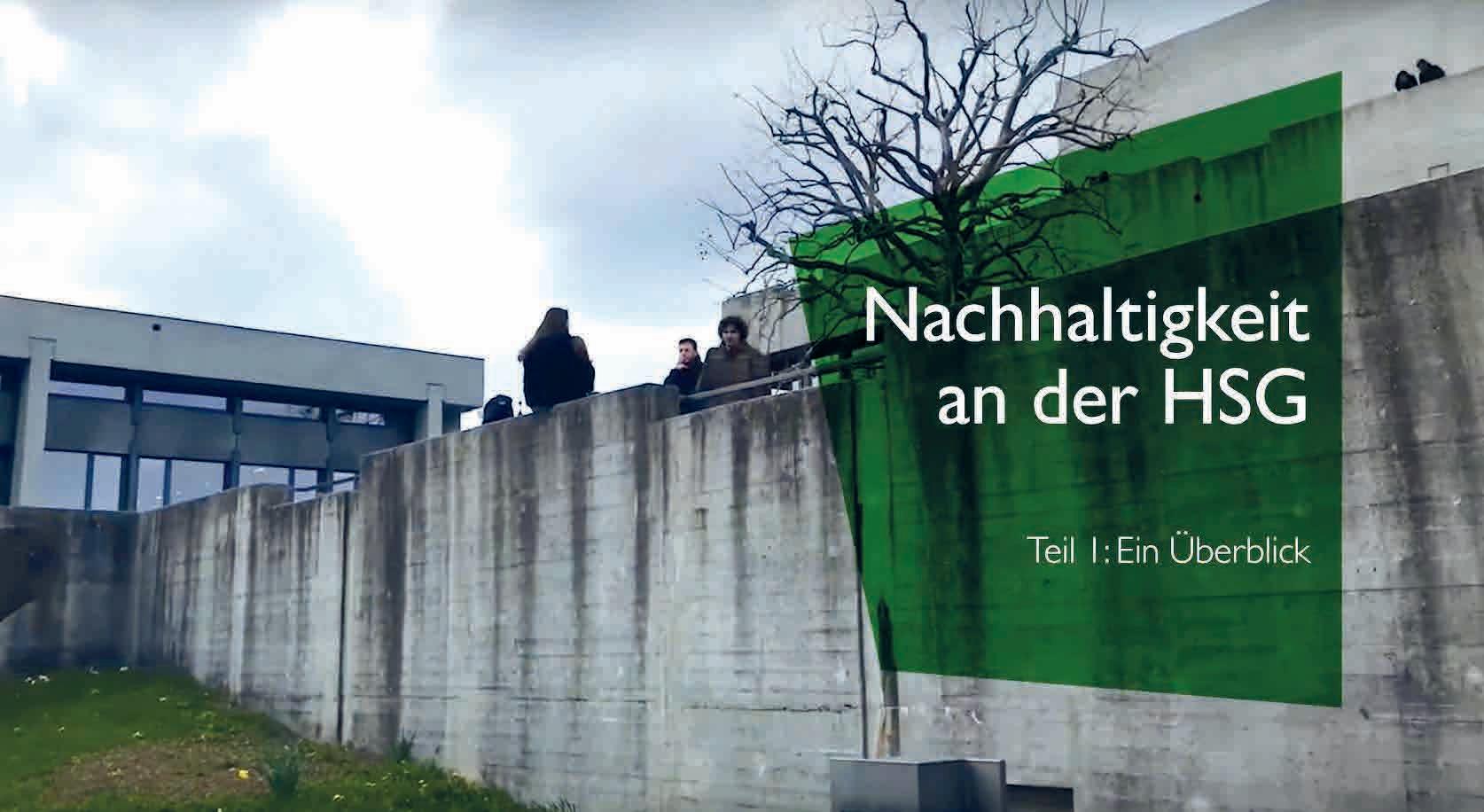
organise numerous conferences and events to make sustainability more visible and engage with the local and global community. Furthermore, business representatives, public experts, NGOs, and alumni contribute to panel discussions, workshops and seminars, ensuring a vivid dialogue and close partnership between academia and practice.
In the chapter Research of this report, we have already presented some examples of outreach activities by HSG faculty communicating their research insights. In the following, you will learn about further events and conferences by HSG members. A more comprehensive list can be found in the Appendix on pages 82 ff.
Panel discussion about the Ukrainian war with Prof. Ulrich Schmid and other experts
Video Sustainability at HSG –An overview
Facilitating Multi-Stakeholder Social Innovation Processes

In 2019, the Competence Center for Social Innovation (CSI-HSG) and the Swiss Agency for Development and Cooperation jointly initiated a lab of tomorrow (lot) programme in its first edition for the Swiss development context. The lot programme is a multi-stakeholder social innovation process aimed at developing entrepreneurial solutions for development challenges in specific contexts. It is geared towards both impact-driven business activities and new cross-sector partnerships. In 2021, an innovation sprint for the lot 14 project — towards a circular food system in Rwanda — was conducted with the aim to foster cocreation and implementation of social innovations that contribute to a sustainable food system. Six teams received support to further develop their project in a subsequent incubation phase.
Three ventures are successfully active to date: Future Farm is transforming municipal organic waste into quality organic fertiliser for smallholder farmers; FoodlinX is offering
Alumni Activities
HSG Alumni is committed to contribute to achieving the UN`s SDGs. For this purpose, several initiatives and events are targeting sustainability-related topics with the aim of integrating them into the life-long learning experience. For example, a series of events around the topic of energy has been created including topics such as the future of energy safety and digitalisation in the fight against climate change. Furthermore, in the HSG Alumni magazine ‘Alma’ various stories feature sustainability-related topics, including mobility and fashion. In 2022, the HSG Alumni Energy Club was founded with 50 Alumni, and a close collaboration of all Alumni communities concerned with sustainability-related topics has been established with the help of ECOnnect.
high-quality, fresh and organic fruits and vegetables at an affordable price sourced directly from smallholder farmers under fair trade terms; and Agricultural Gurus are producing a high-quality, affordable feed mix for pigs and chicken by using agricultural residues (wastes) and industrial food waste. By bringing together organisations and people with different backgrounds, resources, and expertise, the lot programme enabled co-creation and implementation of impactful solutions in the spirit of SDG 17. More information can be found on the lot project homepage.
HSG Alumni has also financially supported various studentdriven initiatives that focus on sustainability topics. Further, in 2022, HSG Alumni developed a strategy to increase its sustainability as an organisation and reduced its carbon footprint. This included initiating an evaluation of the carbon footprint that was implemented through a graduate programme seminar in 2023. Also, an action plan for an event ticketing system that includes a carbon compensation fee and mainly plant-based catering was designed. Additional information on the Alumni’s sustainability-related activities, including the events of the HSG Alumni Sustainability Club with 346 member, can be found in the Appendix on page 85.

Selection of SustainabilityRelated Events


Women in Leadership Micro-Conference
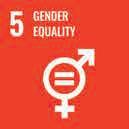
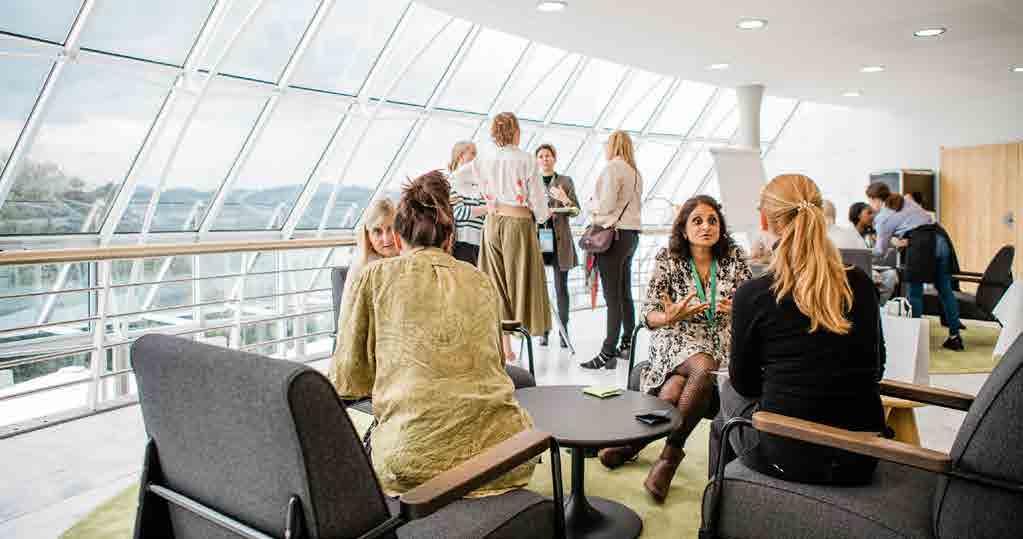

Prof. Jamie Gloor and her team organised a micro-conference on the topic of ‘Women in Leadership’ in May 2022. Top scholars and practitioners across psychology, organisational behaviour, entrepreneurship, and organisations management presented their work on topics related to gender, diversity and leadership followed by a vivid exchange. This event was supported by the Swiss National Science Foundation Grant awarded to Jamie Gloor.
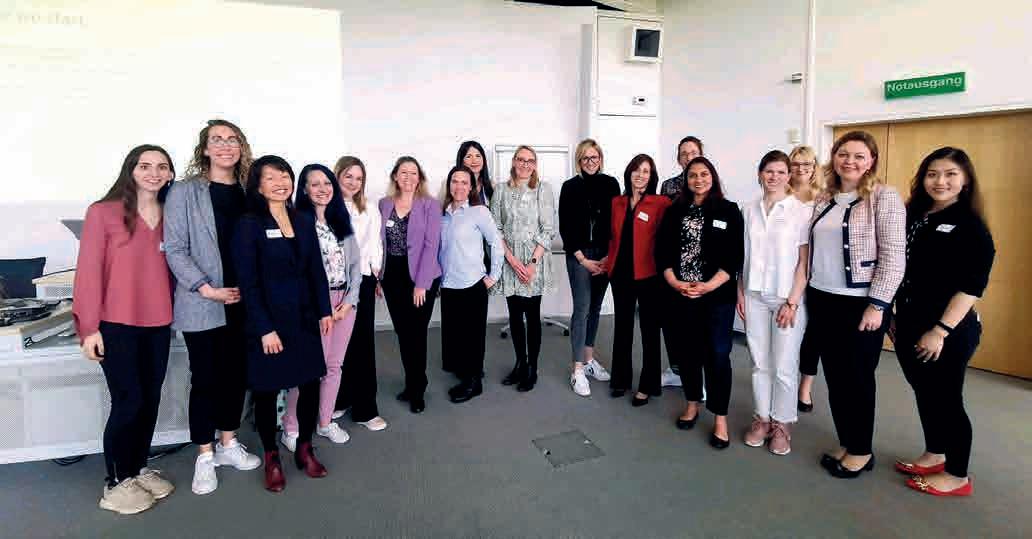
#REMforum 2022
During the annual ’Renewable Energy Management Forum’ (#REMforum) organised by the Chair for Management of Renewable Energies, participants from industry, academia, and politics discussed various aspects associated with the topic of ‘Managing the dynamics of social acceptance’. Various workshops and panel discussions addressed topics such as financing heat pumps, electrifying agriculture, smart solar mobility, as well as renewable energies and energy security.
Brocher Symposium
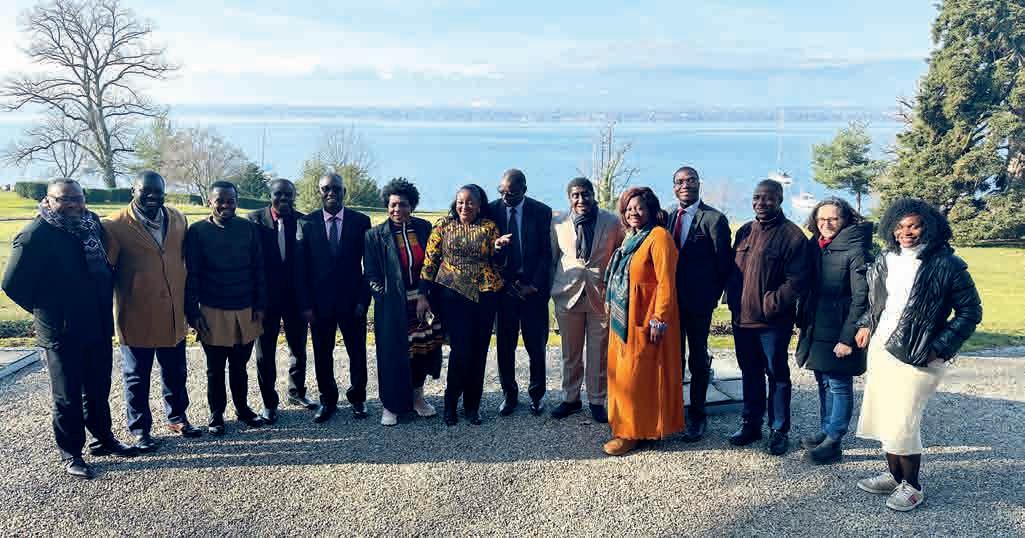
In 2021, the HSG Competence Center for African Research and the EthicsLab of the Catholic University of Central Africa co-organised a symposium on the topic ‘Covid-19 and the Human Right to Health: What is (really) at stake for Africa?’ The participants discussed how African governments can develop sound and coherent national policies that take their citizens’ human right to health seriously.
D&I Week
In 2021 and 2022, the Competence Center for Diversity and Inclusion co-organised the ’D&I Week’, consisting of a wide range of online and on-site events. Together with experts from academia, the private sector, state-owned enterprises, as well as various industries, participants discussed the latest research results and trends around D&I as part of the annual Gender Intelligence Report. In the last two years, more than 1,600 people have registered for the various workshops, panel discussions and speeches.
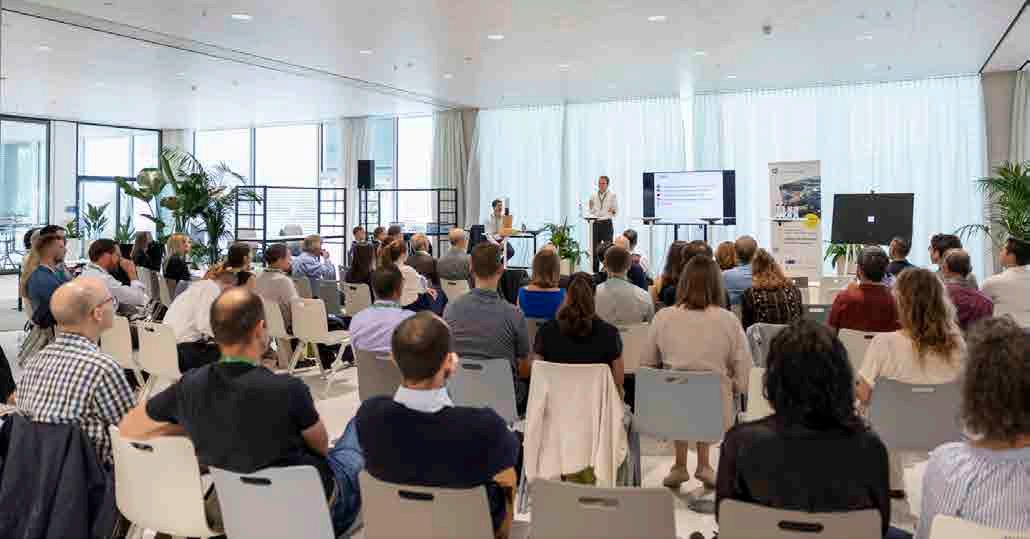
75
HSG Faculty as Experts in the Media and at Events
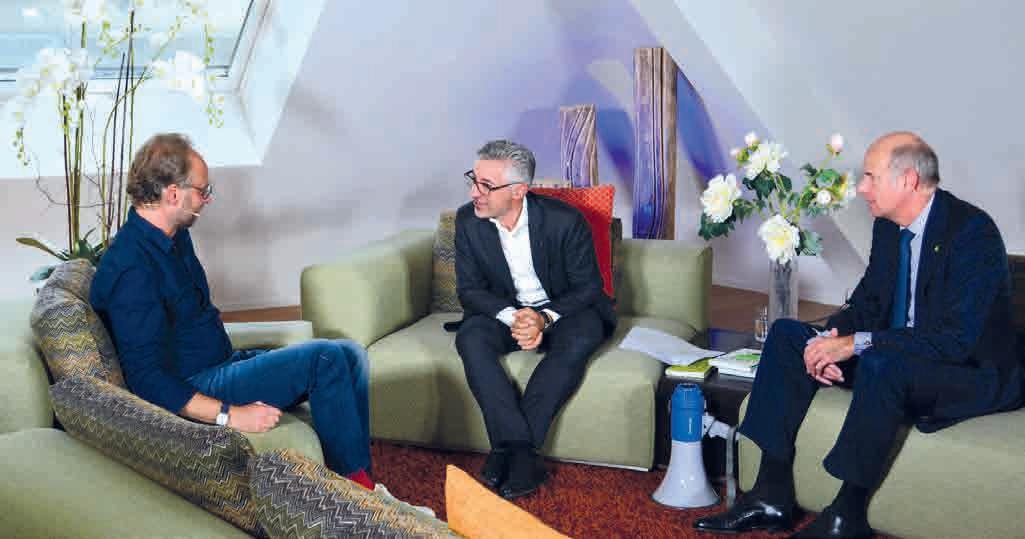
Experts in National News
HSG faculty are frequently interviewed as experts by national news outlets. For example, Prof. Gudrun Sander talked about female leaders in Switzerland, and Prof. Rolf Wüstenhagen explained the importance of solar energy in the Swiss energy mix.

Shaping Public Discourses
HSG faculty actively contribute to public discourse with opinion pieces about political and societal developments. For example, Prof. Thomas Beschorner is a regular contributor to well-known newspapers and magazine with articles on topics at the intersection of business, ethics, and society.
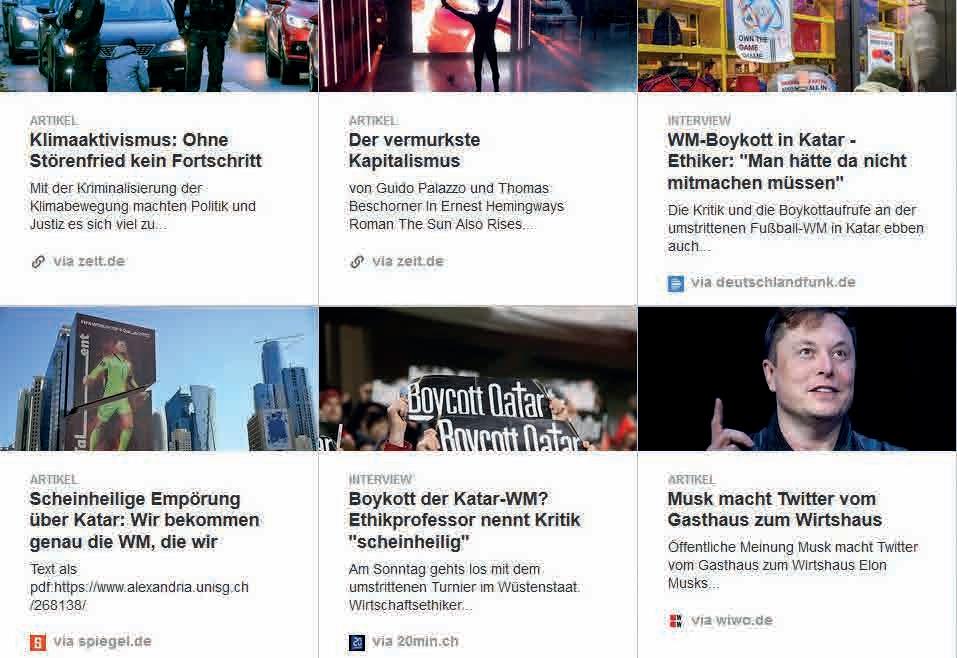
Dialogue Between Academia and Practice
With the purpose of making the activities of businesses and entrepreneurs in Eastern Switzerland more sustainable, the video series IHKtalk@HSG, co-organised by Prof. Roland Scherer and the local Chamber of Industry and Commerce (IHK), brings together HSG professors with local entrepreneurs. For example, Prof. Thomas Beschorner discussed trust within businesses with the CEO of Reckhaus AG. Further, Prof. Judith Walls and the CEO of Lehmann-Group had a conversation about CSR and cor porate strategy, while Prof. Antoinette Weibel and the CEO of Frontify AG talked about the role of trust in organisational culture.
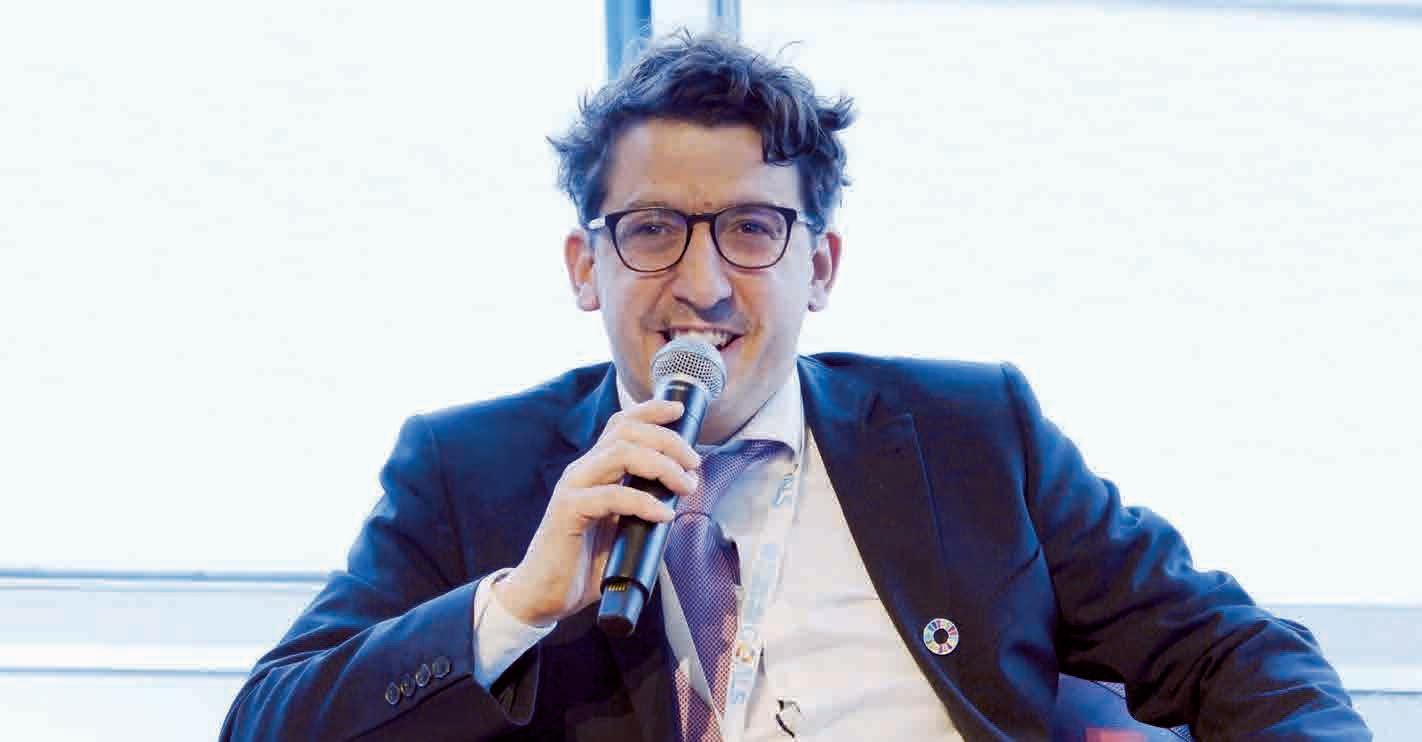
Dialogue in International Politics
The United Nations Development Programme (UNDP), Columbia University and the Government of Norway organised a three-day dialogue in New York to discuss how tax and fiscal policies can be utilised to their fullest potential to achieve the SDGs. In one session, Prof. Peter Hongler and the Chairman of the International Chamber of Commerce (ICC) Tax Commission talked about the topic of ‘Tax, Private Sector Governance and SDGs’ and provided insights on ESG tax metrics.
76 Campus, Partnerships and Dialogue




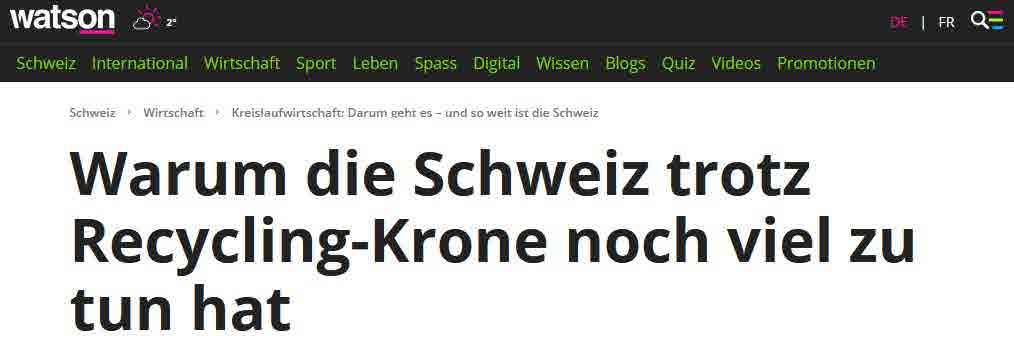


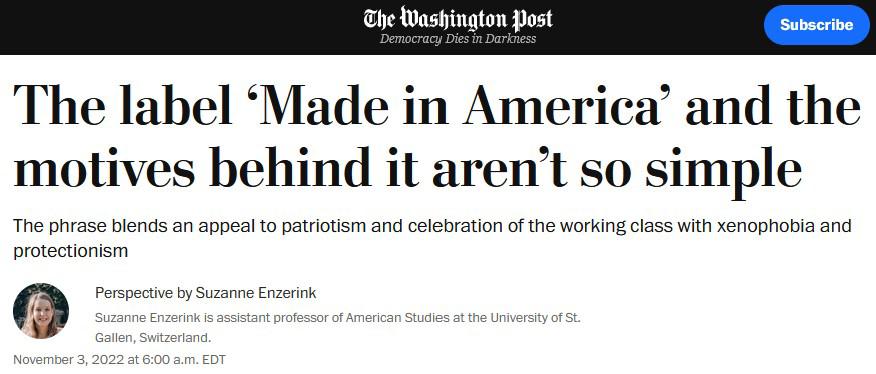



 Prof. Julian Kölbel: Wall Street Journal
Prof. Suzanne Enzerink: The Washington Post
Interview with Prof. Johanna Gollnhofer, NZZ
Prof. Karoline Frankenberger & Dr. Fabian Takacs, Watson
Prof. Julia Nentwich and Dr. Gabriele Schambach, Die Presse
Prof. Julian Kölbel: Wall Street Journal
Prof. Suzanne Enzerink: The Washington Post
Interview with Prof. Johanna Gollnhofer, NZZ
Prof. Karoline Frankenberger & Dr. Fabian Takacs, Watson
Prof. Julia Nentwich and Dr. Gabriele Schambach, Die Presse
77
Prof. Martin Kolmar, ZEIT
Appendix Campus, Dialogue, Partnership Chapter
Environmental Figures
Energy
In 2021, the University was able to increase its energy efficiency by 64 % compared to 2014. The switch to LEDs accounts for a great amount of these savings (see electricity consumption below). The data in the chart include the university-owned cantonal buildings and the sports centre. The drop in 2020 is due to the lock-down during the Covid-19 pandemic.
Over the last years, electricity consumption has been reduced steadily. The sharper drop in 2020 is due to the lock-down during the Covid-19 pandemic. In 2022, the lights in the ‘Lehr-Pavillion’, the canteen, and the library building were replaced with LEDs, which resulted in savings of around 10,000 kWh/a. Further, the buildings and infrastructure team installed motion detectors for optimising the duration of the lighting as well as needs-based ventilation, which further reduced electricity consumption.
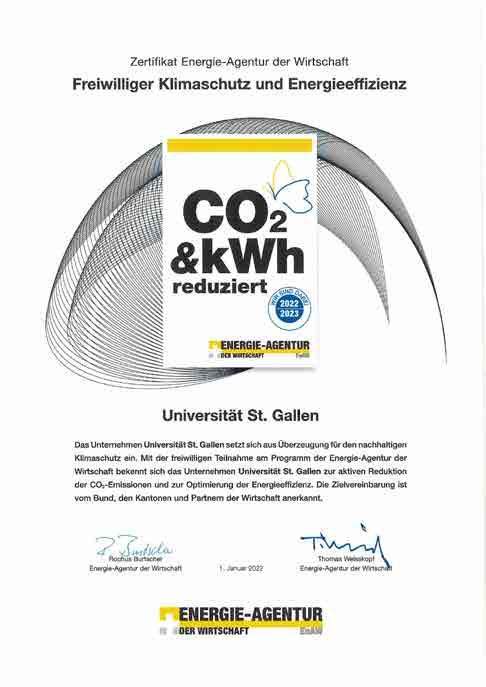
Electricity
2013 2014 2015 2016 2017 2018 2019 2020 2021 2022 Energy use in 1000 kWh 0 1’000 2’000 3’000 4’000 5’000 6’000 7’000 8’000 2012 2013 2014 2015 2016 2017 2018 2019 2020 2021 2022 Electricity in 1000 kWh 0 500 1’000 1’500 2’000 2’500 3’000 78 Campus, Partnerships and Dialogue
IT and Services
The IT data centres on campus have become more energy efficient thanks to the increased use of virtual servers. In the building 04 the IT team was able to decommission an entire row of racks. In addition to the reduced electricity consumption, this has also reduced the need for cooling. The four inverters of the uninterruptible power supply (UPS) are currently only running at approx. 20% of their possible capacity compared to 50–55 % approx. ten years ago.
Electricity Purchase and Production
Since 2019, 100 % electricity from hydropower has been purchased for the main buildings on the University campus.
In 2021/2022, two new photovoltaic (PV) systems have been put into operations; one at the library building and one at the SQUARE. In total, all PV systems on campus generated around 357,361 kWh in 2022. This equals the electricity consumption of around 85 four person households.
Water
As a Blue University, HSG promotes the idea of water as a public good and works on reducing water consumption. By implementing water saving measures across the campus, the use of water per student could be constantly reduced. The drop in 2020 and 2021 is due to the Covid-19 pandemic.




Waste
In 2021, 1,125 kg of PET was recycled, what saved around 3,375 kg of greenhouse gas emissions and 1,069 litres of oil. For this effort the University was recognised with a certificate issued by PET Recycling Schweiz.
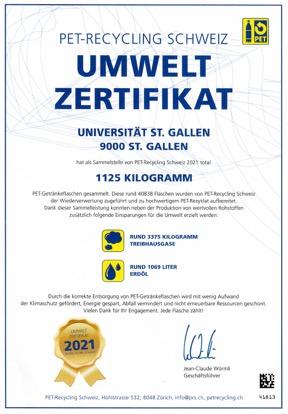
Food
Food waste: Under the motto ‘United Against Waste’, our canteen sells leftovers as a takeaway menu in the evening.
Lifestyle Menu
The Lifestyle Menu aims to reduce the environmental impact of food through offering seasonal and mostly vegetarian options. The menu is put together in cooperation with the University Sports unit to ensure a healthy diet. In 2021 and 2022, the share of lifestyle menus was around 24%, which is slightly lower than in 2019 (29%) but the same level as in 2017.
Reusable Tableware
In addition to the environmentally-friendly reusable Generation M tableware, all restaurants on campus adopted the Kooky system for reusable coffee cups in 2022.
Water in m3 Number of students 2012 2013 2014 2015 2016 2017 2018 2019 2020 2021 2022 0 2’000 4’000 6’000 8’000 10’000 12’000 14’000 16’000 79
Commuting and Student Travel
In 2022, the University avoided emitting 47 tons of CO 2 by using public transportation for business trips (compared to car travel – this amount only includes tickets booked via SBB Business Travel).
Student Mobility
Many students do an exchange semester as part of their studies. Roughly 30 % of incoming students choose a sustainable travel option such as train or bus. For outgoing students, travelling by plane is still one of the preferred options, although the largest group travels to Europe, not overseas. To incentivise a more sustainable travel, Swiss-European Mobility Programme (SEMP) by Movetia offers the Green Travel Top-Up, a subsidy of 100 CHF per exchange for students using a means of transport generating lower CO 2 emissions than the plane.
Diversity & Inclusion Figures
Proportion of Female Students
In 2021, 36 % of all students at the HSG were female. This proportion remained relatively constant compared to 2019 (35 %).
Proportion of Female Faculty
The proportion of female faculty across all levels increased to 24 % compared to 18 % in 2019 (including full, associate & assistant professors and permanent lecturers). In 2020/2021, 50 % of all newly appointed full professors and 60 % of all newly appointed associate professors were female.
Full professors Senior lecturers Assistant professors
2012 2011 2010 2009 2008 2007 2013 2014 2015 2016 2017 2018 2019 2020 2021 2022 20 % 25 % 30 % 35 % 40 % Assessment Bachelor Master Doctoral 2012 2011 2010 2013 2014 2015 2016 2017 2018 2019 2020 2021 0 10 20 30 40 50 60
80 Campus, Partnerships and Dialogue
Proportion of Men and Women in the Senate
The Senate is the highest academic body of the University of St. Gallen. The share of women increased from 17% in 2019 to 24% in 2021. Proportion of men and women among professional staff (staff of the central administration): 50 % (2021, FTE)
Proportion of Men and Women Among Professional Services Staff
Among the administrative staff, there are 55% of women (compared to 50% in 2019). The distribution in the different areas is displayed below.
Equal Opportunities & Special Needs Figures
of consulted cases
opportunities
Equal opportunities
Special needs 2021: 205 Special needs 2022 220 Female Male 2009/ 2010 P eople 2010/ 2011 2011/ 2012 2012/ 2013 2013/ 2014 2014/ 2015 2015/ 2016 2016/ 2017 2017/ 2018 2018/ 2019 2019/ 2020 0 20 40 60 80 100 120 Female Male Library Finance General Secretary Basic Research Fund IT Infrastructure Communication Organisation & Projects Human Resources Vice-President's Board External Relations Vice-President's Board Institutes Vice-President's Board Research & Faculty Vice-President's Board Studies & Academic A airs President's Board O ce of Development University Administration 0 % 10 % 20 % 30 % 40 %50 %60 %70 %80 %90 %100 % 81
Number
Equal
2021: 15
2022: 34
List of HSG Memberships and Networks
Alliance for Research in Corporate Sustainability (ARCS)
– Network for Business Sustainability (NBS)
UN PRME
SDG Accord
– CEMS community
– swissuniversities
Think Tank Gender & Diversity – Inclusion, Diversity and Equality Association of Swiss Universities (IDEAS)
– Konferenz der Einrichtungen der deutschsprachigen Geschlechterforschung (KEG)
Netzwerk Studium und Behinderung
– Network for Sustainable University Business Travel daas
IBH (Wissenschaftsverbund Internationale Bodenseehochschule)
– Konferenz Chancengleichheit Ostschweiz
– Agenda 2030 community of the Canton St. Gallen
Blue Community Ostschweiz
benevol St. Gallen
List of Sustainability-Related Reports Published by HSG
This list does not include reports that are published as part of a research projects, such as the Gender Intelligence Report and the Consumer Barometer on Renewable Energies:
UN PRME Report/Sustainability and Responsibility Report
Blue University/Water report
–
Regionalisierungsbericht
– GHG report
– Biodiversity (report to ‘Stiftung Natur und Wirtschaft’)
Cantonal reduction targets (report to the canton on energy efficiency)
– Gender and Diversity Monitoring Report
List of Selected Media Coverage where HSG Faculty is Quoted as Experts 2022
Warum die Schweiz trotz Recycling-Krone noch viel zu tun hat (Karolin Frankenberger; watson)
– Tendenz immer zuungunsten der Frauen (Theresa Goop; Liechtensteiner Vaterland)
– Greenwashing enters a $22 trillion debt market, derailing climate goals (Julian Kölbel; Bloomberg)
– Nachhaltige Anlagen: Die Wirkung ist egal. Wichtig ist vor allem das gute Gefühl (Julian Kölbel; NZZ)
– The Signal and the Noise (Julian Kölbel; The Economist)
– HSG-Professorin äussert sich zur Kritik an Tilsiters
‘ klimaneutraler’ Produktion: ‘Bei den Unternehmen geht die Angst vor Greenwashing-Vorwürfen um’ (Johanna Gollnhofer; St. Galler Tagblatt)
– Migros gibt sich grün – Konkurrenz schäumt (Johanna Gollnhofer; Blick)
Das Unternehmen Patagonia will die Welt verbessern. Steckt dahinter knallhartes Geschäftskalkül? (Johanna Gollnhofer; NZZ)
Con le rinnovabili bisogna accelerare (Beatrice Petrovich; Cooperazione N.)
– La scommessa energetica (Beatrice Petrovich; RSI)
– Männliche Chefs sind für Gleichstellung – doch Frauen sehen noch wenig Taten (Julia Nentwich; St. Galler Tagblatt)
– FKi Global Forum: Wohin bringt uns die Evolution der Arbeit? (Stephan Böhm; Personalwirtschaft)
E-Autos: Verschleppen wir unser Verkehrsproblem? (Andreas Herrmann; National Geographic)
– ‘Der Mensch am Steuer stört nur – er fährt viel zu hektisch und ruckelig’ (Andreas Herrmann; Tagesanzeiger)
– ‘Da fehlt der Mut’: Ein Mobilitätsexperte erklärt, wo die Schweiz bei der Verkehrswende an Grenzen stösst. (Andreas Herrmann; Luzerner Zeitung)
– ‘In 15 Jahren haben die Städte keinen Privatverkehr mehr’ (Andreas Herrmann; Blick)
Wenige Frauen in Ostschweizer Chefetagen (Gudrun Sander; tvo)
– Wenig Frauen in Kaderpositionen (Gudrun Sander; SRF 10 vor 10)
Energiezukunft der Schweiz: Rettet die Sonne die Schweizer Stromversorgung? (Rolf Wüstenhagen; SRF)
– Elektroautos als Zwischenspeicher für erneuerbare Energien (Rolf Wüstenhagen; SRF Tagesschau)
– Was bringt das Gendern wem? (Christa Binswanger; SRF Kultur-Talk)
– Sag, wie hast Du es mit dem Gendersternchen? (Christa Binswanger; SRF Club)
– Die Pharma-Branche macht Chefinnen (Nicole Niedermann; SRF)
– Hohe Hürden für Frauen auf dem Weg nach oben (Ines Hartmann; SRF1)
– MEM-Branche schöpft Frauenpotenzial gut aus (Theresa Goop; SRF)
2021
– Eine Chefin hat immer noch Seltenheitswert (Gudrun Sander; LEADER Digital)
Die Hälfte hat beim Fliegen ein schlechtes Gewissen (Rolf Wüstenhagen; 20 minuten)
– Axpo setzt auf Stromlieferverträge in ganz Europa (Rolf Wüstenhagen; SRF news)
Nachgefragt zum Widerstand gegen Windkraftprojekte: ‘Manche nehmen es mit den Fakten nicht so genau’ (Rolf Wüstenhagen; Luzerner Zeitung) –
Nachgefragt: ‘Gelöst wurde das Problem bislang nicht’ (Rolf Wüstenhagen; St. Galler Tagblatt)
– Frühling im Winter: Tiere leiden unter Rekord -
wetter (Rolf Wüstenhagen; tvo)
‘Man kann nicht einfach hoffen, dass andere das Problem lösen’: HSG-Experte erklärt, warum es die Windenergie in Innerrhoden braucht (Rolf Wüstenhagen; St. Galler Tagblatt)
– Job Crafting: Gesundes Arbeiten in einer digitalen Welt (Stephan Böhm; Haufe)
– Gesundheitsforscher Stephan Böhm über die psychischen Belastungen des Homeoffice (Stephan Böhm; Südwest Presse)
– Steigende Hauspreise als Warnsignal (Enea Baselgia; Sonntagszeitung)
– Dramatische Folge des Immobilienbooms (Enea Baselgia; Tagesanzeiger)
– Auf dem Weg zur Rentiers-Gesellschaft (Enea Baselgia; Weltwoche)
– Lohnunterschied zwischen Frauen und Männer leicht angesteigen (Gudrun Sander; SRF Tagesschau)
– Kaderpositionen in Männerhand (Gudrun Sander; SRF Tagesschau)
– Internationaler Frauentag: Was hat sich verändert? (Julia Nentwich; tvo)
HSG Faculty as Guest Authors in
Newspapers and Magazines: 2022
–
50 Beiträge der Assekuranz für mehr Nachhaltigkeit (Martin Eling; Handelszeitung Insurance)
– The label ‘Made in America’ and the motives behind it aren’t so simple (Suzanne Enzerink; Washington Post)
– Wirtschaft-Klima-Konflikt lösen (Christian Keuschnigg; Finanz und Wirtschaft)
– Financing the green transformation (Christian Keuschnigg; Open Access Government)
– Klimaneutralität im Einzelhandel ist ein komplexes Thema: Gurken in Plastik können auch nachhaltig sein (Johanna Gollnhofer; St. Galler Tagblatt)
– Der Klimawandel lässt sich nicht schönreden. Auch nicht mit Wirtschaftswachstum (Johannes Binswanger & Paolo Piacquadio; NZZ)
– Klimaaktivismus: Ohne Störenfried kein Fortschritt (Thomas Beschorner; Zeit)
– Fußball-WM 2022 im Emirat: Was wir aus dem Katar-Debakel lernen müssen (Thomas Beschorner; Spiegel)
– Marken-Expertin zu Kaffee-Kugeln: ‘Wandel im Markt passiert nicht von heute auf morgen’ (Johanna Gollnhofer; Blick TV)
– Was unsere Volkswirtschaft von der Generation Z lernen kann (Peter Ulrich; NZZ magazin)
2021
– Die Assekuranz – Sprachrohr für mehr Nachhaltigkeit (Martin Eling; Handelszeitung Insurance)
– Diversität & Nachhaltigkeit als zentrale Eckpfeiler der Assekuranz (Martin Eling; Handelszeitung Insurance)
–
–
–
–
–
–
–
–
–
–
–
–
–
–
–
–
–
–
–
–
Campus, Partnerships and Dialogue 82
Gesellige Energie in Zeiten von Social Distancing (Merla Kubli; energie+)
Weil nichts tun keine Option ist (Merla Kubli; energie+)
– Die Fast-Food-Variante (Merla Kubli; energie+)
– Frauenförderung neu: Es sind gerade die Männer gefragt (Julia Nentwich & Gabriele Schambach; Die Presse)
– Ein Klima für Männer (Gabriele Schambach & Julia Nentwich; Handelszeitung)
Leistung auf dem Prüfstand (Gabriele Schambach & Julia Nentwich; Handelszeitung)
– Fairness, bitte! (Gabriele Schambach & Julia Nentwich; Handelszeitung)
Gleichstellung: Wie Männer die Quoten verbessern (Gabriele Schambach & Julia Nentwich; Capital)
– Gespaltene Wahrnehmung (Julia Nentwich & Gabriele Schambach; Handelszeitung)
– Der plötzliche Anstieg des VermögensEinkommens-Verhältnisses in der Schweiz (Enea Baselgia & Isabel Martinez; Ökonomenstimme)
Pandemie und Wissenskrise: die gefährliche
Tendenz des konspirativen Zweifels (Martin Kolmar, Thomas Beschorner; NZZ)
List of Selected SustainabilityRelated Events at HSG
Selection of Conferences, Seminars and Events Organised by HSG Faculty
2022
– ACA Symposium: Workshop on ESG-reporting together with ZF Friedrichshafen (Tami Dinh)
Deep Dives with the CCDI/Race and Ethnicity Series (Gudrun Sander)
– Demo day Lab of tomorrow 14: Towards a circular food system in Rwanda (Rahel Meyer)
Erdgastagung 2022 (Christian Opitz)
– Hybrid Ecologies in the City of Zurich – Unruly Natures Working Conference 2022 (Federico Luisetti)
I.VW-HSG Future.Talk 1/2022: Transition zu einer klimaneutralen Wirtschaft: Rolle und Verantwortung der Versicherungswirtschaft (Alexander Braun)
MISTRAL Final Conference: Dynamics of Social Acceptance (Rolf Wüstenhagen)
– 6. St. Galler Diversity & Inclusion Week (Gudrun Sander)
12 th St. Gallen Forum for Management of Renewable Energies (#REMforum) (Rolf Wüstenhagen)
2021
Brocher Symposium: Covid-19 and the Human Right to Health: What is (really) at stake for Africa? (Thierry Ngosso) – Earth Beings in the Upper Valais – Unruly Natures Working Conference 2021 (Federico Luisetti)
– Food Summit 2021: Webinar Food Consumption 2021 (Thomas Rudolph)
Global session on slum upgrading – Challenges and Opportunities for a Community of Practices (Vanessa Boanada-Fuchs)
– Global session on slum upgrading – Concrete Steps towards a Community of Practice (Vanessa Boanada-Fuchs)
Selection of Other Public Events to which HSG Faculty Contributed
–
Software darf nicht über das Schicksal von Patienten entscheiden (Thomas Beschorner; Zeit)
– Klimapolitik: Die unsichtbare Hand kann es nicht von allein (Martin Kolmar; Zeit)
– Tolerierbarer Rechtsbruch? Gedanken zum zivilen
Ungehorsam in der Klimakrise (Martin Kolmar & Benjamin Schindler; NZZ)
– Nachhaltigkeit bedeutet, schon jetzt weiterzudenken (Anna Stünzi; finews)
– Mobile Marketing and Customer Experience Conference (MoMaKo) (Katarina Stanoevska)
Science & Innovation Summit – Latin America 2022 (Yvette Sanchez)
– St. Galler Leadership Tag mit Nacht (Heike Bruch)
Tagung Zukunft Rechtsmarkt: ‘Nachhaltigkeit/ ESG für Jurist*innen – The next big thing?’ (Bruno Mascello)
– Waste symposium (Christian Opitz) – Women in Leadership Micro-Conference (Jamie Gloor)
– 1st Smart Mobility Summit (Andreas Herrmann)
2022
– Annual NICG Conference on Board Dynamics 2022 – Panel II ‘Non-Financial Reporting Requirements – Trends and Implications’ (Thomas Berndt) –
Better Science Initiative: Gute Wissenschaftskultur als Grundlage für Exzellenz – Exzellenz braucht Chancengleichheit (Julia Nentwich) – Compassorange Schwarmabend – Move, men, move! Männer in Führungspositionen für
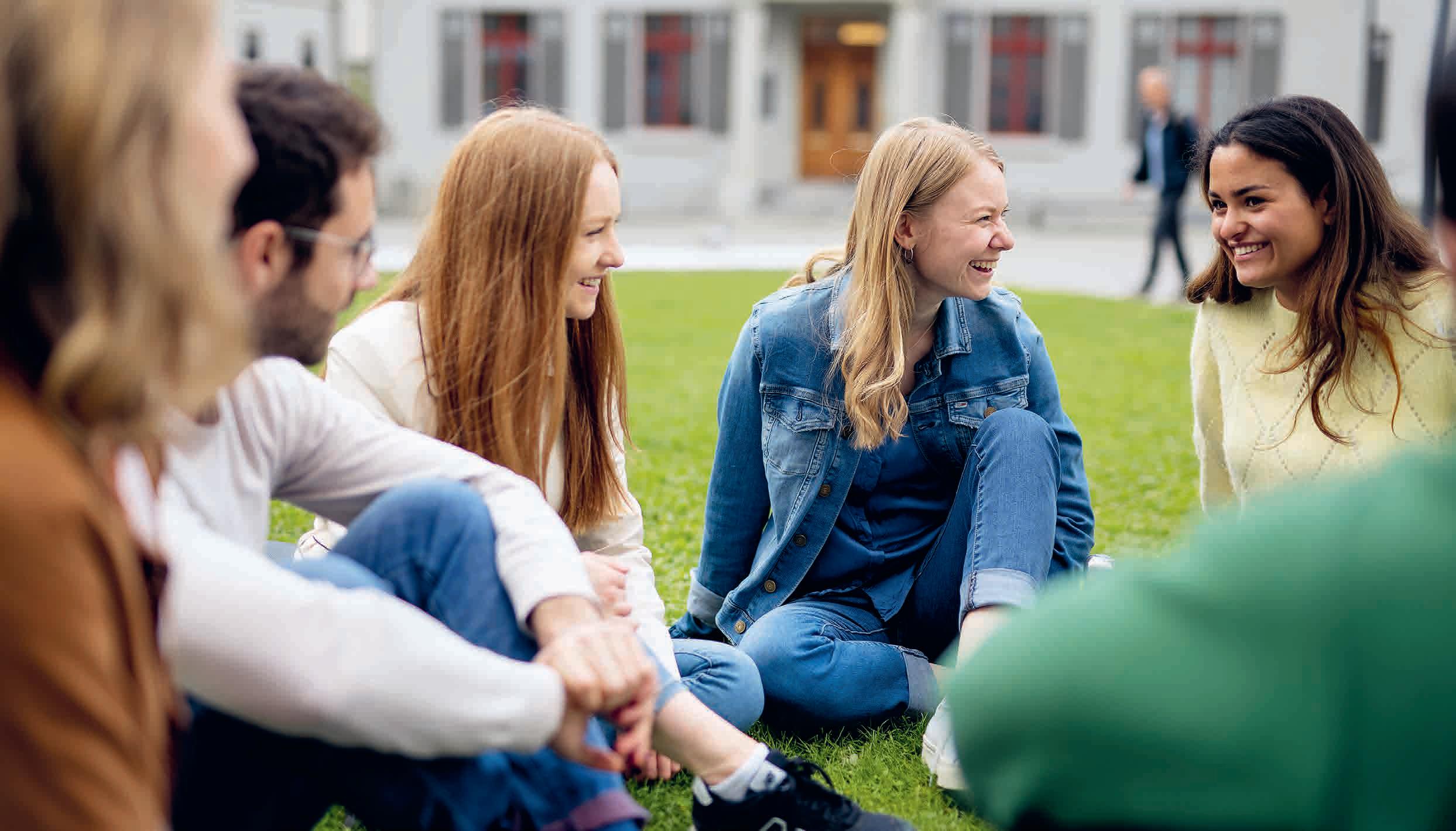
–
–
–
–
–
–
–
–
–
–
–
–
–
–
83
Gleichstellung gewinnen (Gabriele Schambach)
– DGT Jahrestagung 2022 – Transformation des Destinations- und Standortmanagement – the next frontier (Thomas Bieger, Christian Laesser, Pietro Beritelli)
– Dialogue on Tax and SDGs – Session 5: Tax, Private Sector Governance and SDGs (Peter Hongler)
EBGB Fachtagung Gleichstellung der Arbeit –Instrumente und Massnahmen zur Förderung der Gleichstellung von Menschen mit Behinderung in der Arbeit (Stephan Böhm)
EKKJ Tagung 2022 – ‘Gender – Möglichkeiten pädagogischen Handelns‘ (Julia Nentwich)
– EXPERTsuisse Jahrestagung 2022 – Impulsreferat: Entwicklungen bei Erstellung und Prüfung von ESG-/Nachhaltigkeitsberichten (Thomas Berndt)
– EXPERTsuisse Jahrestagung 2022 – Panel: Bedeutung der Nachhaltigkeit für Prüfungsund Beratungsunternehmen (Thomas Berndt)
– IHK Business Outlook – Schweiz-EU: Wie weiter? (Anna Stünzi)
– Klimaklagen in Europa – Klimaklagen gegen Rohstoffunternehmen: Aktuelle Entwicklungen und Zukunftsfragen (Valentin Jentsch)
– Lange Nacht der Wissenschaft 2022 – ‘Kurz erklärt: Open Science – Offene Wissenschaft’ (Stefan Siegel)
– WU Gender and Diversity Conference –Challenging privilege: incorporating the concept of deservingness into critical diversity studies (Christa Binswanger, Jelena Tosic)
– 16th Max Weber Fellows June Conference –Climate Change Litigation against Carbon Majors: Royal Road or Dead End? (Valentin Jentsch)
2021
–
DUB Digital business Talk – Gesundheit und Produktivität im Homeoffice: Was macht flexibles Arbeiten erfolgreich? (Stephan Böhm)
– EXPERTsuisse Jahrestagung 2021 – Impulsreferat: Corporate Governance in die Zukunft gedacht (Michèle Sutter-Rüdisser)
Konferenz der Einrichtungen für Frauen- und Geschlechterstudien im deutschsprachigen Raum (KEG) – Forum ‘Universitärer Arbeitsalltag unter Corona-Rahmenbedingungen: Herausforderungen für die Chancengleichheit’ (Christa Binswanger)
– Kosmopolitics – Lohngleichheit: Who cares?! (Christa Binswanger)
OHCHR Multi-stakeholder Consultation on Access to Remedy in the Tech Sector – Session 1 Part 1 ‘Remedying adverse human rights impacts arising from Digital Technologies’ (Kebene Wodajo)
– Retooling Knowledge: Sustainable Development Goals from the Perspective of the Environmental Humanities – Lessons from Gender Studies in Switzerland (Christa Binswanger)
– Swiss Green Economy Symposium: Innovationsforum IF.05 – Nachhaltig finanzieren und investieren: Wie erzeugen wir Wirkung in der Realwirtschaft (Alexander Braun)
– Wharton Risk Management and Decision Processes Center – Digital Dialogue No. 6: Driving Decarbonization through the Insurance Sector (Alexander Braun)
– 5. Fachkräftekonferenz Mainfranken: Arbeitswelt im Wandel – Inputreferat Soziale Gesundheit am Arbeitsplatz (Stephan Böhm)
I.VW-HSG Future. Value Jahrestagung 2021: Sustainability in Insurance – Werden Diversität und nachhaltiges Management zentrale Eckpfeiler der Assekuranz? (Alexander Braun)
The Concept of Minority – a Critical Appraisal (Kebene Wodajo)
– 5. St. Galler Diversity & Inclusion Week (Gudrun Sander)
Sustainability-Related Public Lectures at HSG 2022
– Unsere postfossile Energiezukunft, series of lectures headed by Prof. Peyto Bonev

– Digitalisierung und Menschenrechte, Dr. Isabel Ebert
– Kritik der Geschlechterverhältnisse in Kunst und Kultur, series of lectures headed by Prof. Christa Binswanger
– Corporate Purpose – Effektive Führungsarbeit in Zeiten unternehmerischer Sinnsuche, Prof. Omid Aschari
– ‘Ich spiele nicht nur Klavier…’ Komponistinnen im 19. Jahrhundert, Dr. Hans-Georg Hofmann
– Are all men Created Equal? History of Inequality in the United States, Prof. Suzanne Enzerink
– Die Prävention von Wirtschaftskriminalität aus ethischer Perspektive, Dr. Verena Rauen
– Denkmal-, Landschafts- und Ortsbildschutz – ein Hindernis für den Klimaschutz, Prof. em. Martin Killias
– Zukünftige Agrar- und Ernährungswissenschaft: Wie kann die Landwirtschaft in Zukunft Produktion, Nachhaltigkeit und Erwartungen der Gesellschaft und der KonsumentInnen unter einen Hut bringen?, Bernhard Belk
Neue Materialien für eine Nachhaltigere Welt, series of lectures headed by Dr. Toni Bürgin
50 Jahre Frauenstimmrecht in der Schweiz: St. Galler Perspektiven, series of lectures headed by Prof Christa Binswanger und PD Dr. Claudia Franziska Brühwiler
–
–
–
–
–
–
–
2021 –
Campus, Partnerships and Dialogue 84
Nachhaltige Entwicklung und lokale Herausforderung in Afrika, series of lectures headed by Prof. Roland Hodler
– Sinn und Anerkennung von Arbeit, Dr. Dana Sindermann
Wasser- ein kostbares Gut, series of lectures headed by Cornelia Bally
– Mobilität- verrückt? Vorausschau ins Jahr 2050, series of lectures headed by Dipl. Ing. Peter Piwecki
Korruption und Whistleblowing: Herausforderungen ethischer Gerechtigkeit, Dr. Verena Rauen
– Nachhaltigkeit und Unternehmertum in einer mehrwertgenerierenden Landwirtschaft, Berhard Belk
Care Ökonomie, series of lectures headed by Prof. Christa Binswanger
List of Selected SustainabilityRelated HSG Alumni Activities
HSG Alumni supports the University's alumni community on their life-long learning journey beyond the time as an active student. As the organisation is also committed to contribute to the achievement of the UN`s SDGs, this learning experience also tackles topics that target several SDGs. Among others, an event-series around the topic of energy was hosted including topics such as ‘Digitalisation in the fight against climate change’ and ‘Climate protection and energy safety’. Besides HSG Alumni events, also the HSG alumni communities across the world introduced events in 2022 that addressed topics related to the SDGs such as the flagship event of the HSG Alumni Senior`s Chapter titled ‘From awakening to awakening – which Switzerland tomorrow?’ or the on-site happening of the Chapter Central Switzerland on the question ‘Will the Ukraine war suspend the Paris climate targets?’. Key insights are shared on several media platforms to allow as many people as possible.
Selected Alumni Events
– 24.03.2021, ‘2050 – Future of Mobility & Cities’, HSG Alumni Club München, Online
– 24.03.2021, ‘Positionierung einer NPO im digitalen und demographischen Wandel – am Beispiel von SOS-Kinderdorf Schweiz’, EMBA Stamm Zürich, Online
– 30.03.2021, ‘Founding a Start-up with Impact’, MBF-HSG Alumni, Online
– 10.05.2021, ‘e-Stamm on sustainability @IKEA Switzerland’, HSG Alumni Sustainability Club, Online
– 12.05.2021, ‘Economy for the Common Good’, HSG Alumni Social Business Club, Online
– 18.05.2021, ‘Unternehmertum und Modelabels: Nachhaltigkeit, Design und Umgang mit Unsicherheit mit Martina von Storyfabrics und Nicolas von Nikin’, HSG Alumni St. Gallen, Online
– 01.–09.06.2021, ‘Open Innovation Days’, HSG Alumni, Online and inperson
08.06.2021, ‘Wirtschaftspolitische Ziele 2050 –Welche Rolle spielen Glück, Nachhaltigkeit und
Gleichberechtigung’, HSG Alumni Club Hamburg, Online
30.06.2021, ‘Energie – Das Fundament unserer Vision Deutschland 2050’, HSG Alumni Club München, Online
26.08.2021, ‘Online-Stamm with Deloitte’, HSG Alumni Sustainability Club, Online
– 27.10.2021, ‘Jörg Ackermann über Wasserstoffmobilität in der Enothek’, HSG Alumni Nordwestschweiz, Basel
27.10.2021, ‘thePitch #1 – Food-Tech Startups’, HSG Alumni, St. Gallen
– 09.11.2021, ‘Notwendigkeit von CO 2-Reduktionen, Opportunities für die Schweiz’, HSG Alumni Zentralschweiz, Rotkreuz
– 23.11.2021, ‘VP Bank - Nachhaltigkeit als Eckpfeiler der Strategie, wie wird das in der Praxis umgesetzt?’, HSG Alumni Club Liechtenstein, Triesen
25.11.2021, ‘Meet the Co-founder of HyLite’, MBF-HSG Alumni, Zurich
– 25.11.2021, ‘Workshop starting a social impact startup’, HSG Alumni Social Business Club, St. Gallen
– 02.12.2021, ‘Megatrend Mobilität’, HSG Alumni Seniors Chapter, Zürich
08.-17.12.2021, ‘HSG Alumni Africa Weeks’ on sustainable business in Africa, HSG Alumni, Online and hybrid
– 17.01.2022, ‘Rolle von Staat und Demokratie im Jahr 2050’, HSG Alumni Club Düsseldorf, Online
07.02.2022, ‘Cluster Mobilität’, Zukunft-Fabrik.2050 HSG Alumni Club, Online
– 24.03.2022, ‘What do doughnuts have to do with economics’, HSG Alumni Sustainability Club, Online
– 31.03.2022, ‘Kamingespräch mit Yvonne Suter, Head of Sustainability bei Julius Bär’, HSG Alumni Women’s Chapter, Zürich
– 07.04.2022, ‘Company visit @RESILUX’, HSG Alumni Sustainability Club, Bilten
– 13.04.2022, ‘Klimaschutz und Wachstum mit Dr. Guntram Wolff: Müssen wir den Gürtel enger schnallen?’, Zukunft-Fabrik.2050 HSG Alumni Club, Online
– 14.05.2022, ‘Masterclass Impact Investing – Latest Trends’, MBA HSG Alumni, Zurich
– 18.05.2022, ‘Grüner Wasserstoff – Schlüsseltechnologie für die klimaneutrale Zukunft 2050?’, Zukunft-Fabrik.2050 HSG Alumni Club, Online
20.05.2022, ‘Climate Fresk – Understanding an intergenerational challenge’, HSG Alumni with Student Impact, St. Gallen
04.10.2022, ‘Nachhaltige Mobilität in Deutschland im Schneckentempo?’, Zukunft-Fabrik.2050 HSG Alumni Club, München
– 05.10.2022, ‘Lunchtalk zum Thema Vielfalt und Inklusion – Herausforderungen und Chancen für Führungskräfte’, HSG Alumni, Online
– 27.10.2022, ‘planted. Factory visit’, HSG Alumni Sustainability Club, Kemptthal
27.10.2022, ‘Suspendiert der Ukraine-Krieg die Pariser Klima-Ziele?’, HSG Alumni Zentralschweiz, Zürich
– 30.11.2022, ‘Energy x AI: Webinar with Holcim & Merantix Momentum’, HSG Alumni, Online
Stories from the Alumni Magazine
alma 3/2022 – Gesundheit
– P 3: Sustainability Week 2022: Empower, Experience, Engage
–
P 31: HSG Alumni Sustainability Club: Designfehler im Wirtschaaftssystem
– alma 1/2022 – Engagement:
– P 24: ‘Wir wählen unsere Artikel nutzenstiftend und ressourcenschonend’
alma 4/2021 – Supply und Transport
– P 27: Environmental Social Governance mit HSG-DNA
alma 3/2021 – Schreiben
– P 4: START Summit 2021 – von Innovation, Architektur und nachhaltigen Startups
– P 8: Manusia gewinnt Un-Dress Fashion Award
– alma 2/2021 – Leistung:
– P 18: Mobilität: Was leistet ein nachhaltiges Verkehrssystem? – P 28: ‘Our teamwork makes our dream work’
Selection of Sustainability-Related HSG SpinOffs
– Noriware
– Papydo
– Planted Foods
– Sanoge
– Smart Breed
– seniors@work
– directcoffee
– wormup
– Gartengold
Selection of Sustainability-Related Startups Participating in the Leading House for the Latin American Region Academia-Industry Traning
– Upgrain
– Wyblo
– Herby
– CollectID
–
Urban Connect
– Bluetools
– SmartBreed
– anavo medical
–
–
–
–
–
–
–
–
–
–
–
–
–
–
List of Sustainability-Related Startups that are Part of the broader HSG network
85
This report was compiled and written by the Office of the University’s Delegate for Responsibility & Sustainability. Information and data collection involved a large number of people from across the University. The Delegate’s Office expresses its deep gratitude to everyone who contributed to this report.

Contact
Universität St.Gallen (HSG) Dufourstrasse 50 9000 St.Gallen
+41 71 224 21 11 sustainability@unisg.ch


sustainability.unisg.ch
linkedin.com/company/sustainability-at-hsg-and-econnect/
Célina Wagner misigno.ch


Print This report is printed on 100% recycled paper ISO 14001/Environmental ISO 9001/Quality Systems
6738: LDK 24-85/ Ageing Restistance Accreditations
DIN
Imprint
Prof. Judith Walls Delegate, Responsibility and Sustainability
Dr. Tabea Bereuther Manager, Responsibility and Sustainability
Design
87
From insight to impact.
sustainability@unisg.ch
unisg.ch



























 Prof. Judith Walls Delegate, Responsibility & Sustainability
Clémentine Robert Project Manager, Curriculum Development
Dr. Tabea Bereuther Manager, Responsibility & Sustainability
Dr. Fabian Takacs Project Manager, Curriculum Development
Sandra Ramme Deputy Manager, Responsibility & Sustainability; Community Developer, ECOnnect (until Dec 2022)
Lasse van Look Assistant Manager, Co-Curriculum Development (since Jan 2023)
Julian Bömelburg Assistant Manager, Responsibility & Sustainability (since Dec 2022)
Dr. Jost Hamschmidt Project Manager, Co-Curriculum Development
Prof. Judith Walls Delegate, Responsibility & Sustainability
Clémentine Robert Project Manager, Curriculum Development
Dr. Tabea Bereuther Manager, Responsibility & Sustainability
Dr. Fabian Takacs Project Manager, Curriculum Development
Sandra Ramme Deputy Manager, Responsibility & Sustainability; Community Developer, ECOnnect (until Dec 2022)
Lasse van Look Assistant Manager, Co-Curriculum Development (since Jan 2023)
Julian Bömelburg Assistant Manager, Responsibility & Sustainability (since Dec 2022)
Dr. Jost Hamschmidt Project Manager, Co-Curriculum Development









































 Environmental Social Economy Society
Environmental Social Economy Society



































































































 Dr. Manali Kumar from the Institute of Political Science assessed the US’ track record on climate mitigation and Joe Biden’s climate summit on BBC News with Clive Myrie.
Dr. Manali Kumar from the Institute of Political Science assessed the US’ track record on climate mitigation and Joe Biden’s climate summit on BBC News with Clive Myrie.



























































 Prof. Julian Kölbel: Wall Street Journal
Prof. Suzanne Enzerink: The Washington Post
Interview with Prof. Johanna Gollnhofer, NZZ
Prof. Karoline Frankenberger & Dr. Fabian Takacs, Watson
Prof. Julia Nentwich and Dr. Gabriele Schambach, Die Presse
Prof. Julian Kölbel: Wall Street Journal
Prof. Suzanne Enzerink: The Washington Post
Interview with Prof. Johanna Gollnhofer, NZZ
Prof. Karoline Frankenberger & Dr. Fabian Takacs, Watson
Prof. Julia Nentwich and Dr. Gabriele Schambach, Die Presse












